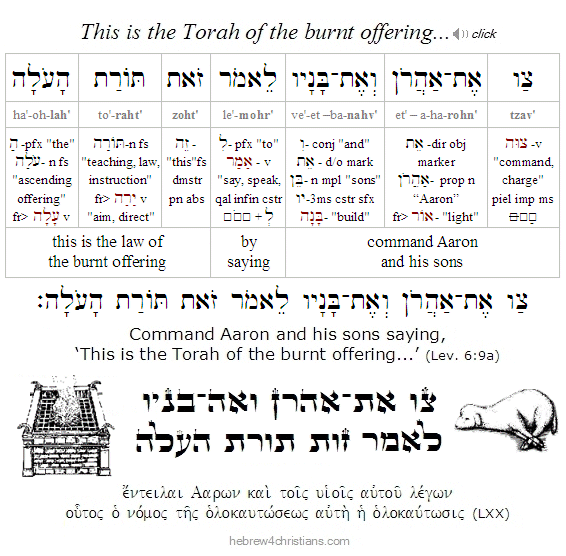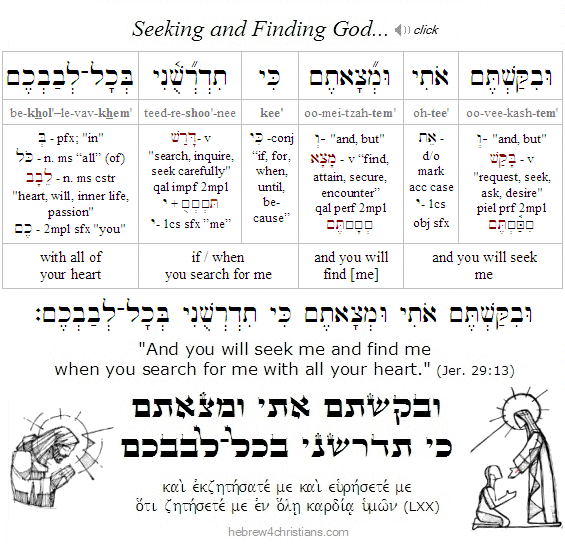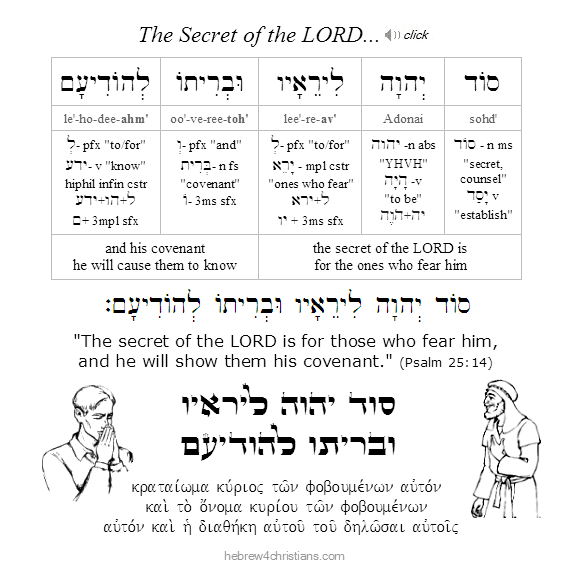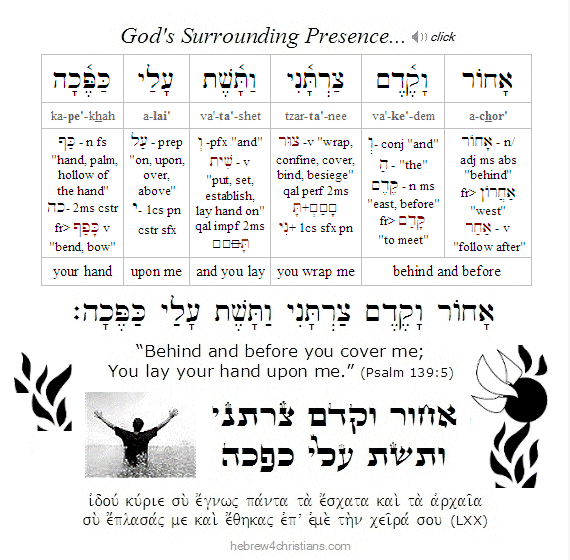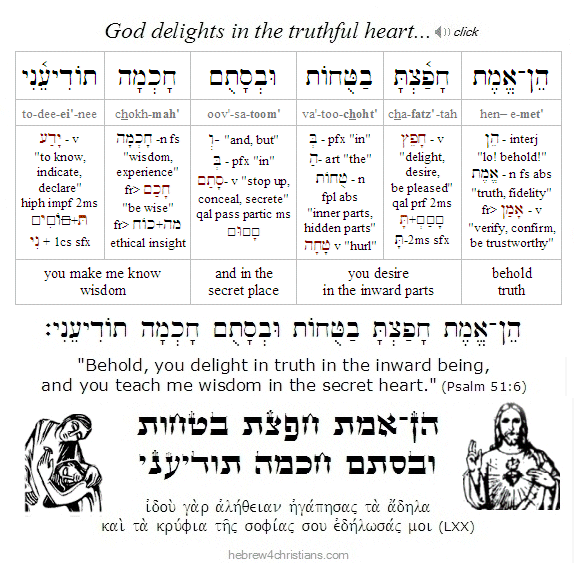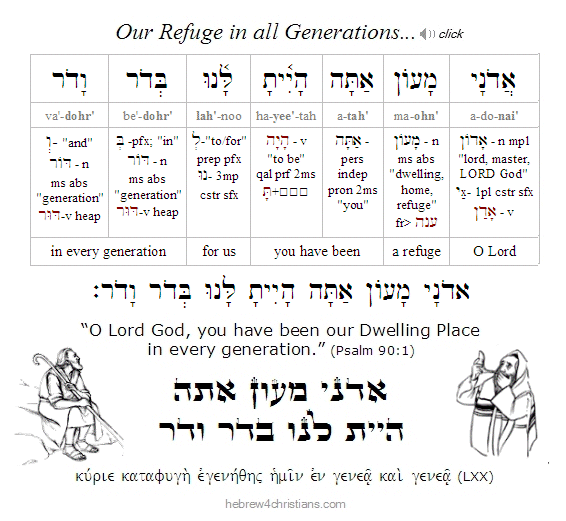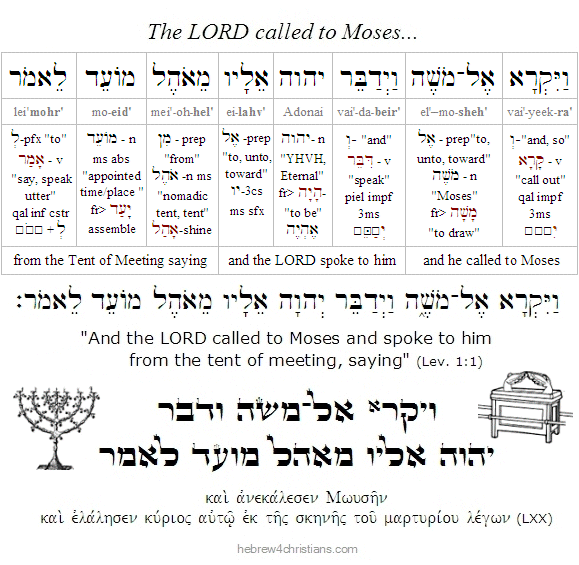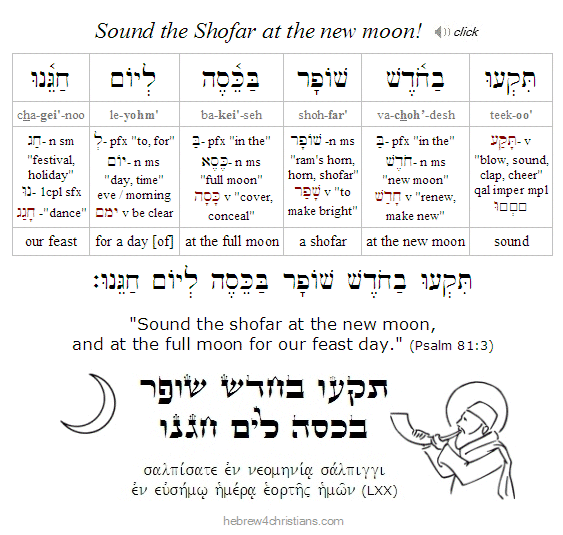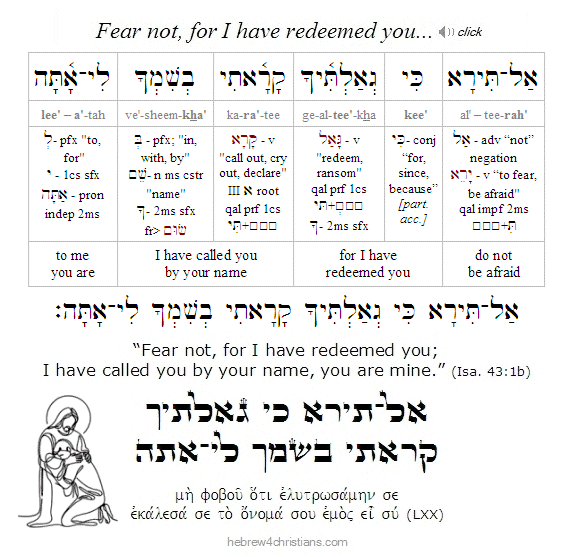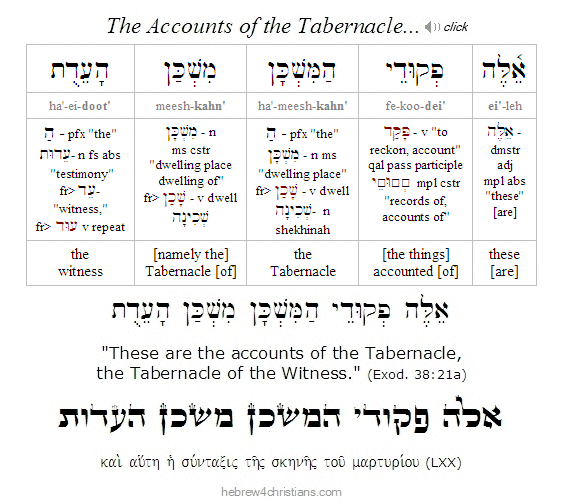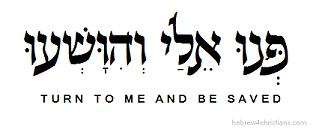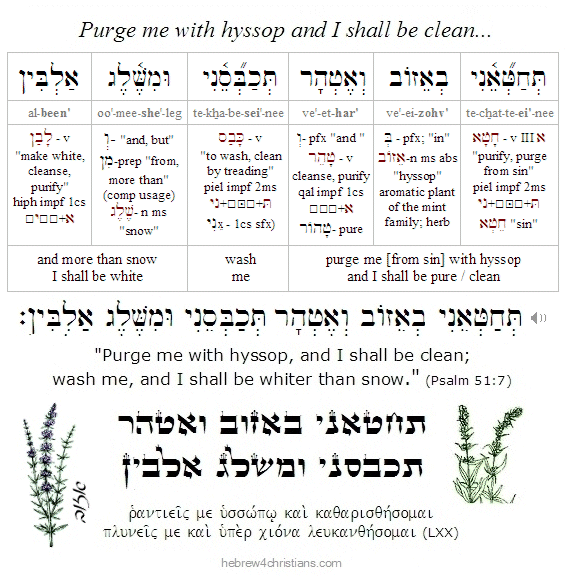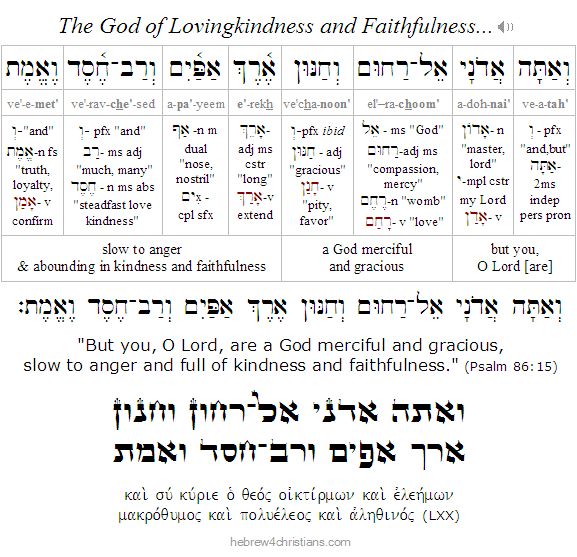|
Prayer Request (for site updates, see below)
I was laid off from my full-time job several years ago when -- after a lot of prayer, soul searching and discussion with my wife -- we decided to operate the Hebrew for Christians ministry entirely by faith in God's provision through the love and kindness of His people. I am not paid for doing this work, and therefore I ask you to consider supporting us. If you can help, please offer a donation or purchase some of the Hebrew study materials offered here. Encouraging other web sites to link here also helps us become more visible on the web. Above all, agree with us for the Lord's will to be done in our lives. Todah, chaverim.
 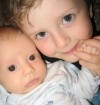 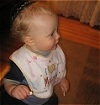  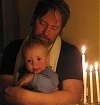
Note: My wife and I have have three young children (Josiah, Judah, and Emanuel David ). The LORD has graciously provided for us as Adonai Yireh (יְהוָה יִרְאֶה), "the One who sees [our need]." We are living one day at a time by the grace and mercy of God, and I want to publicly praise Yeshua and acknowledge His faithful love in caring for my family -- despite the trials during this time. The LORD God of Israel is faithful and true! And to those of you who have sent us a word of encouragement or donation during this difficult time, please accept our heartfelt appreciation! Your chesed truly helps sustain us.
יהי שׁם יהוה מברך - "May the Name of the Lord be blessed."
 |
I want to offer a word of thanks for all your kindness and encouragement over the last 20+ years, chaverim... I could not be in ministry apart from the grace and love you have shown to me and my family. Thank you so much and may the great and unsurpassable blessings of the LORD God of Israel be upon you always. -John
Jewish Holiday Calendar
Note: For site updates, please scroll past this entry....
The Torah divides the calendar into two symmetrical halves: the Spring and the Fall, indicating the two advents of Messiah. The Biblical year officially begins during the month of the Passover from Egypt (called Rosh Chodashim, see Exod. 12:2), and the spring holidays of Passover, Unleavened Bread, and Firstfruits both recall our deliverance from Egypt and also our greater deliverance given by means of the death, burial, and resurrection of the Messiah, the great Passover Lamb of God. The holiday of Shavuot (i.e., "Pentecost") both commemorates the revelation of the Torah at Sinai as well as the revelation of the Ruach HaKodesh (Holy Spirit) at Zion, in fulfillment of the promise given by our Lord....
The intermediate months of summer end with the advent of the sixth month of the calendar, the month of Elul, which recalls the time Moses interceded on behalf of Israel after the sin of the Golden Calf. To commemorate this time of our history, we likewise focus on teshuvah (repentance) in anticipation of Rosh Hashanah and especially in anticipation of Yom Kippur, the great "Day of Atonement." In Jewish tradition the 30 days of Elul are combined with the first ten days of the seventh month (called the "Days of Awe") to set apart "Forty Days of Teshuvah" leading up to the Day of Forgiveness for Israel. Immediately following Yom Kippur, the mood changes as we begin preparing for a joyous week-long celebration called Sukkot (i.e., "Tabernacles") that concludes with the holiday of Simchat Torah.
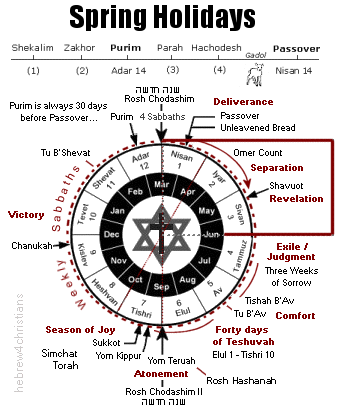 |
The Spring Holidays:

The spring holidays (i.e., chagei ha'aviv: חגי האביב) provide a portrait of the death, burial, and resurrection of the Messiah: Yeshua was crucified on erev Pesach (during the time of the sacrifice of the Passover lambs), buried during Chag Hamotzi (the festival of Unleavened Bread), and resurrected from the dead on Yom Habikkurim (the Day of Firstfruits). Fifty days after Passover, on the climactic holiday of Shavuot (i.e., "Pentecost"), the Ruach HaKodesh (Holy Spirit) fell on the believers in fulfillment of the promise given by our Lord. Note that the giving of the Holy Spirit occurred precisely according to the calendar countdown given in the Torah (Lev. 23:15-16), and that it occurred after the resurrection of Yeshua -- just as our Messiah foretold (John 16:7; Acts 1:6-8, 2:1-4). This proves that the feasts of the LORD (מוֹעדי יהוה) were not abolished after the crucifixion. The meaning of the gospel is prefigured in the holidays given in Torah. See Luke 24:27, 24:44; John 5:46; Acts 26:22, etc.
![Spring Holiday Timeline (H4C]](../../About_HFC/Site_News/roshchodeshim-line.gif) |
Kindly note that in accordance with both Torah and Jewish tradition, the following holiday dates begin at sundown (ויהי־ערב ויהי־בקר; Gen. 1:5):
- Month of Adar (Thurs. Feb. 27th [eve]) - Sat. March 29th [day])
Dates for Passover Week 2025:
Free Seder Guide
- Month of Nisan (Sat. March 29th [eve]) - Sun. April 27th [day])
- Month of Iyyar (Sun. April 27th [eve] - Tues. May 27th [day])
- Month of Sivan (Tues. May 27th [eve] - Wed. June 25th [day])
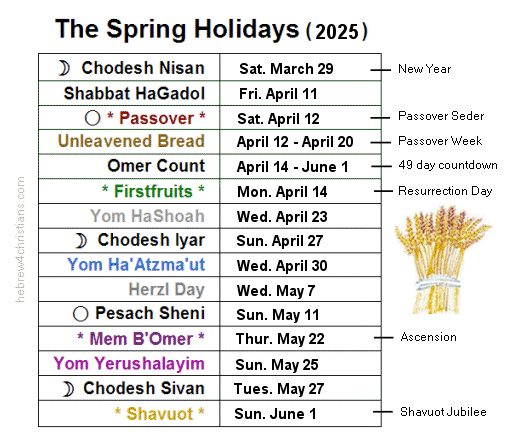 |
Note: For more information, see the Calendar Pages....
April 2025 Site Updates
Note: Please refresh the page (or press F5) to see the latest updates...
Being Made Whole with God...
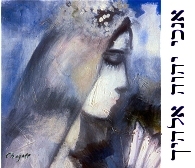
During Passover we read Shir Hashirim, the "Song of Songs," the amazing love story of a disguised shepherd and his beloved... "Ani l'dodi, v'dodi li" - Song of Songs 2:16
04.17.25 (Nisan 19, 5785) In the Torah we read: "You shall be blameless with the LORD your God" (Deut. 18:13), which seems to suggest that we should be perfectionistic in our faith, and indeed some older Bible versions translated the Hebrew word tamim (תָּמִים) as "perfect" which once meant "to be thoroughly made," though in modern times means flawless, faultless, or ideal. Because of these connotations, it is better to translate the Hebrew word as "complete," "whole," or "sincere."
When God said to Abraham, "I am El Shaddai; walk before me and be tamim (Gen. 17:1), he was not saying "be perfect" or "don't ever make a mistake," but rather be fully engaged, that is, to walk before God passionately, sincerely, wholeheartedly (מכל הלב), and by doing so to "walk out" the relationship with full assurance that he is accepted and beloved by God. Likewise when Yeshua said "Be therefore perfect as your Father who is in heaven is perfect" (Matt. 5:48), he meant that we should be complete, finished, and "made whole" by knowing and receiving the overflowing love and light of God.
"You shall be wholehearted with the LORD your God" is therefore a mandate to know who you are, to know what is truly good as distinguished from what is evil, and to be united with God's passion to be healed from your inner conflicts and ambivalence (δίψυχος). We are made "whole" or "perfect" (i.e., complete) when we resolutely turn to God for healing of what divides our hearts, as it says: "The Torah of the LORD is perfect (תָּמִים), returning the soul" (Psalm 19:8). Understand the Torah's commandment, then: "You shall be tamim (i.e., whole and wholehearted) with the LORD your God," to be a prophecy of transformation for your life, friend... Amen. And may you passionately know "the love of Messiah that surpasses knowledge and be filled with all the fullness of God" (Eph. 3:19).
Hebrew Lesson
Deut. 18:13 Hebrew reading (click):
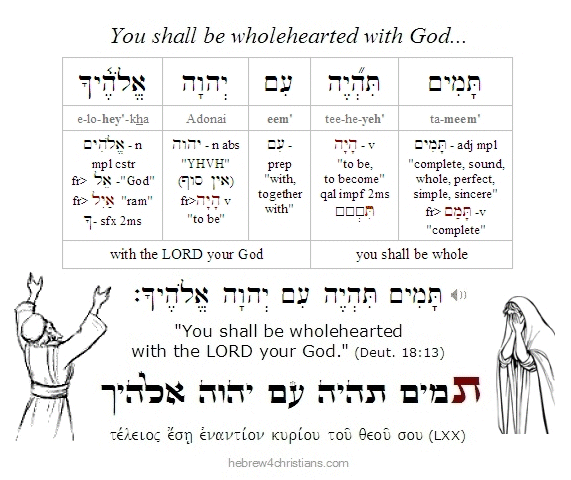 |
Teshuvah and God's Love...

"The Holy One, blessed be God, said to Israel: 'My children, present to me a single opening of repentance, small like the eye of a needle, and I will open for you entrances through which wagons and carriages can pass.'" –Shir Hashirim Rabbah 5:3.
04.17.25 (Nisan 19, 5785) If you ever feel disappointed because of recurring personal struggles and failures, do not add to your troubles by despising yourself, but instead allow your character defects to lead you to humility and surrender before God. Bear in mind that you are unable to please God apart from his intervention and help (John 6:63), so avoid self-reproach, since teshuvah (i.e., repentance) is not about learning to deal with your pains, after all, but trusting the Lord to do the miracle of healing within you.
You "have been crucified with the Messiah" (Gal. 2:20) - the verb used in this phrase is a "perfect passive" form in the original language (i.e., συνεσταύρωμα), meaning that it indicates completed action done on your behalf. Your job is not to devise your own sanctification but to receive the blessing by faith, trusting in God's righteousness given on your behalf. The focus is not on you, and when you get out of the way and surrender, the grace and love of God will do the impossible within you (Matt. 19:26).
In a way, teshuvah is a kind of death, that is, identifying with the judgment of Messiah given on your behalf, just as teshuvah is life as you take hold of your new identity in him. Practically speaking you turn away (i.e., "die to") your anger, disappointments, bitterness, and sorrows by turning to the Lord for his acceptance and grace. God will bring freedom and newness of life from what binds your heart. As C.S. Lewis once advised: "Remember that He is the artist and you are only the picture. You can't see it. So quietly submit to being painted, that is, keep fulfilling all the obvious duties of your station... asking forgiveness for each failure and then leaving it alone. You are in the right way. Walk -- don't keep on looking at it" (Collected Letters). How you do teshuvah depends a great deal on where you are standing: if you are before the cross of Messiah, then you stand on the side of divine grace; otherwise you will remain in a place of exile, questioning God's love for you. Choose to believe and you will see his heart for you...
Hebrew Lesson
Jeremiah 32:27 reading (click for audio):
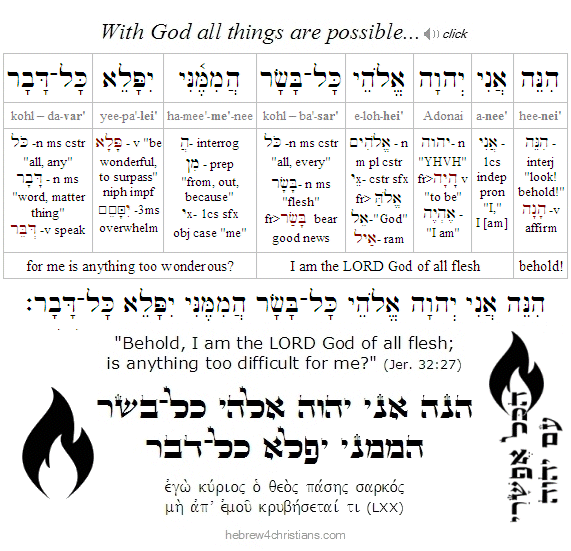 |
The "severity" of the gospel insists that you regard yourself as beloved, worth saving, and that you are God's friend... "There is no greater love than this: that someone lay down his life for his friends" (John 15:13). God quite literally demands that you regard yourself as benefitted by the sacrifice of his beloved son Yeshua in your place; he demands that you understand how dear you are to his heart. God sees something of such great value in you that he was willing to suffer and die to redeem it from loss... Just as the kingdom of God is a "pearl of great price," so you are a pearl of great price to God. What grieves and angers God is the refusal to believe that you are someone of infinite importance to him... Only God can rightfully make such a demand because He knows that loving other things more than Him leads to "disordered love," darkness, and eventual madness. We were created and given the breath of life for God's love, but substituting finite things for our infinite need will never suffice to bring lasting healing to our souls...
Those who are "in the flesh" cannot please God (Rom. 8:8). We must turn away from regarding ourselves as mere "flesh" and understand that we are essentially spiritual beings created and redeemed by God (2 Cor. 5:16). We must give up the distinctions in the "world of basar" - the carnal world that is known through sensuous apprehension - and accept ourselves as "new creations" in the Messiah. It is "not the children of the flesh who are the children of God, but the children of the promise are counted as offspring" (Rom. 9:6-8).
The mere conviction of sin is not the same thing as repentance. We have to step beyond a troubled conscience and have our sin crucified by God's love and grace. Grace is therefore essential to genuine repentance, since moral reformation is never enough. "When Christ calls a man, he bids him come and die." We must be humbled so that we can receive. God gives us bitter experience of our inadequacy to call us to return to him. Only God can kill the power of sin within our hearts. Conviction of sin is not the end, but rather newness of life.
There is a place for godly sorrow, of course, and for genuine regret over our sins. As we understand God's desire and love for us, we begin to realize that the essence of sin is the refusal of God's heart for us. The underlying issue with sin concerns the question of God's love. Simply abstaining from certain actions does not address the deepest need of the heart. It is not turning away from sin that matters as much as turning toward God. The death of sin is meant to lead us to the life of love...
God is both infinitely loving and infinitely just, and both of these "attributes" are inseparably a part of who he is. God is One. Nonetheless, the cross of Yeshua proves that "love is stronger than death, passion fiercer than the grave; its flashes are flashes of fire, a raging flame, the very flame of the Lord" (Song. 8:6). It is at the cross that "love and truth have met, righteousness and peace have kissed" (Psalm 85:10). This implies that we must drop our defenses – even those supposed objections and pretenses voiced by our shame – and "accept that we are accepted." It is God's great love for you that leads you to repent and to turn to him. Allow yourself to be embraced by his "everlasting arms."
Genuine repentance will entirely change you. It is an act of profound respect over what God has done on your behalf. You say, but I am a miserable wretch! Indeed that is so, but the consciousness of your wretched state is the heart's cry for love... God goes "outside the camp" to meet with you. He enters the leper colony to join you there, in your wretchedness, and even takes upon your fatal disease. He sees you in your desperate estate and joins you there. God enters into the dust of your death and says, "Live!"
Repentance means changing your thinking, turning around to face the truth, and returning to embrace God's love. It does not identify the whole person with sin, but rather regards all people as redeemable, worthy, and valuable to God. Conviction of sin is not the end, but rather the means to newness of life. God saved us so that we could be in a love relationship with Him. We must "choose life," and that means choosing to welcome God's love into your heart. The only sin that can keep you from God's everlasting love is the denial that his love is personally for you. You must forsake seeing yourself "in the flesh" and take hold of God's spirit, his passion, and his grace for your soul. You are worthy to be loved because God is worthy to make you so.
Repent and believe the good news. God is love, and that love is for you. Amen, and may the Holy Spirit seal these words upon our hearts....
Our Reason for Being...
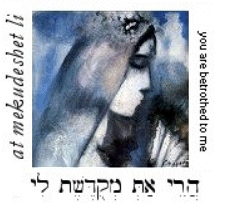
04.17.25 (Nisan 19, 5785) From our Torah reading for Passover week (i.e., parashat Tzav) it is written: "This is the thing that the LORD commanded you to do, so that the glory of the LORD may appear to you: Draw near to the altar and offer your sin offering and your burnt offering and make atonement for yourself" (Lev. 9:6-7).
In this connection, have you considered why you were born into this world? What is your purpose, destiny, and end? The Torah states that you were personally created by Almighty God, who breathed out the breath of life (נִשְׁמַת חַיִּים) into you, and then redeemed your life so you could know the glory of God and spiritual reality. As it is written: "Worthy are you, our Lord and God, to receive glory and honor and power, for you created all things, and by your desire they existed and were created" (Rev. 4:11).
God creates all things for his glory and purposes, which indeed is the first blessing recited over the bride and groom in a traditional Jewish wedding: בָּרוּךְ אַתָּה יְהוָה אֱלהֵינוּ מֶלֶךְ הָעוֹלם שֶׁהַכּל בָּרָא לִכְבוֹדו / "Blessed are you Lord our God king of the universe, who has created all things for his glory." The purpose of life is to know and love God, to walk in His light and truth, and to glorify his compassion and grace forever...
At a traditional Jewish wedding the groom places the ring on his bride's finger and says: Harei, at mekudeshet li: "Behold, you are betrothed to me." Love and holiness are interconnected, since the beloved is set apart as sacred and treasured. May God help us see the wonder of His love for our lives: "Do not be conformed to the passions of your former ignorance, but as he who called you is holy, you also be holy in all your conduct, since it is written, "You shall be holy, for I am holy" (1 Pet. 1:14-16). Amen, the essence of holiness is God's love...
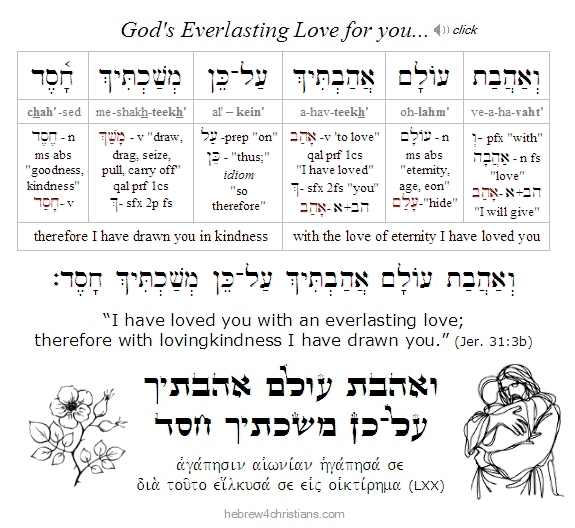 |
All Things Made New...
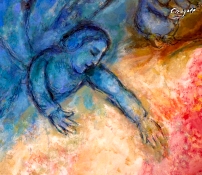
"In relationship to God one can not involve himself to a certain degree. God is precisely the contradiction to all that is 'to a certain degree'." - Kierkegaard
04.16.25 (Nisan 18, 5785) Some people attempt to provide empirical "proof" of the resurrection of Yeshua, though strictly speaking this will always be insufficient. After all, the very guards at the tomb who witnessed the sight of the angel rolling away the stone later conspired with the religious establishment to suppress the message of the resurrection (Matt. 28:2-4, 11-15). Even Yeshua said that personally witnessing someone coming back from the dead would be insufficient for teshuvah (see Luke 16:30-31). No, we do not see the resurrection of Yeshua through the eyes of the flesh, but rather through the eyes of faith. We believe in order to see; not the other way around...
Empirical evidence at best provides a sense of logical "probability," but faith is a life-and-death matter of the heart, soul, and mind... Only the inward testimony of the Holy Spirit (i.e., argumentum Spiritus Sancti), can "drag" the sinner to the confess the reality of the risen Yeshua, and once His Living Presence is encountered, categorically everything changes and nothing will remain the same forever. He makes all things new! (2 Cor. 5:17).
"Great Companion, You have loved us first.
May we never forget that You are love,
So that this sure conviction might triumph in our hearts
Over the whirling of the world,
Over the inquietude of the soul,
Over the anxiety for the future,
Over the fright of the past,
Over the distress of the moment.
May this conviction discipline our soul
So that our hearts might remain faithful and sincere
In the love which we bear to all those we love as ourselves."
- Soren Kierkegaard
Hebrew Lesson
Isa. 43:19a reading (click):
The Countdown to Shavuot...
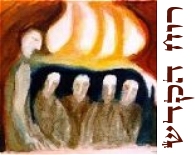
04.16.25 (Nisan 18, 5785) In the Torah we are instructed to count forty nine days – seven weeks of days – from the day following Passover until the jubilee holiday of Shavuot (i.e., Weeks or "Pentecost"). This period of time is called Sefirat HaOmer (ספירות העומר), or the "counting the [barley] sheaves" (see Lev. 23:15-16; Deut. 16:9). In abstract terms, it's as if there is a dotted line pointing directly from Passover to Shavuot - a "Jubilee" of days - representing the climax of Passover itself:
![Spring Holiday Timeline (H4C]](../../About_HFC/Site_News/pesachline.gif) |
The early sages identified this jubillee that marks the seventh week of weeks to commemorated he revelation of the Torah at Sinai (which did happen exactly 49 days after the Passover in Egypt), however the New Testament identifies it with the outpouring of the Holy Spirit (רוח הקודש) that ratified the reality of the New Covenant of God at Zion. The redemption process that began at Passover was therefore completed at Shavuot, and that "completion" was the revelation of God's love and deliverance for the entire world.
Moreover, although the Jewish sages did not fathom the use of the otherwise forbidden leaven in the offering (see Eph. 2:14). The countdown to Shavuot therefore goes beyond the giving of Torah at Sinai and points to the greater revelation of Zion. Shavuot is the fulfillment of the promise of the Holy Spirit's advent to those who are trusting in Messiah (Acts 2:1-4). "Counting the Omer," then, is about receiving the Holy Spirit to experience and know the resurrected LORD of Glory. You can "count" on that, chaverim!
In this connection it is important to understand that the climax of the 49 days was not the giving of the law at Sinai (i.e., matan Torah), but rather the revelation of the altar (i.e., the"Tabernacle") and its subsequent fulfillment in the sacrificial death of Yeshua as our Lamb of God. Moreover, it was during this time that Yeshua made His post-resurrection appearances to His disciples and indeed ascended to heaven during this period...
Of particular importance during this count down time are the following: 1) the beginning of the count of the omer since it signified the waving of the firstfruits and therefore the resurrection of Yeshua (1 Cor. 15:20); 2) the 40th day of the Omer (Mem B'Omer), when Yeshua ascended back to heaven, and 3) the climactic 49th day of the Omer (Shavuot) when the Holy Spirit was given to the disciples in fulfillment of the promise that we would not be left comfortless (Acts 2:1-4). It should be clear, then, that Shavuot marks the time of "Jubilee" of the Spirit, when we are clothed with power to serve the LORD without fear...
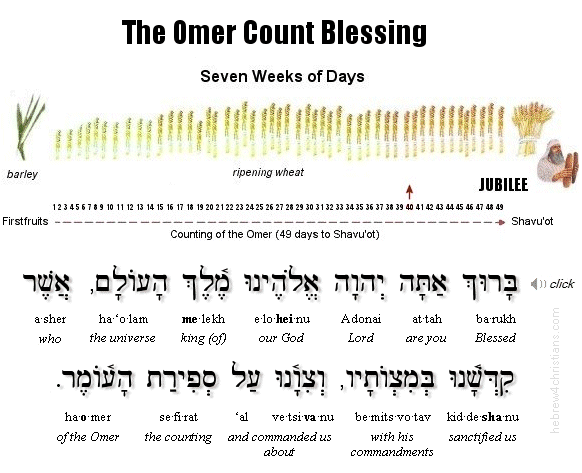 |
Hebrew Lesson
Deuteronomy 16:9-10 reading:
"Pentecost Sunday?"
Most Christian traditions teach that Shavuot (i.e., "Pentecost") must fall on a Sunday, the "day after the Sabbath," which therefore must be the seventh Sunday after the Saturday of Passover Week, but the traditional Jewish sages did not interpret the "day after the Sabbath" (מִמָּחֳרַת הַשַּׁבָּת) to refer to the weekly Sabbath, that is, to Saturday, but rather to the Sabbath of the Passover, which is the context of the commandment given in the Torah (Lev. 23:15). In other words, if we interpret "the day after the Sabbath" to refer to the Sabbath of the Passover, then the 49 day count would begin on Nisan 16, regardless of the day of the week that falls on the calendar, and therefore Pentecost would fall 49 days later, on Sivan 6, again, regardless of the day of the week that happens to fall on the calendar.
For more information see the Hebrew for Christians Shavuot pages.
This changes everything!
The Resurrection of Yeshua...
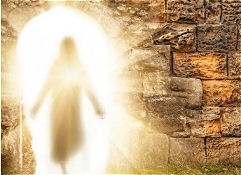
04.15.25 (Nisan 17, 5785) The most important fact of all history - and that which radically transforms everything else - is the resurrection of Yeshua from the dead (תחייתו של משיח). Spiritual life means being awake to the risen reality and saving Presence of Yeshua, the One who Overcame and vanquished the power of death. Without Him we are hopeless; with Him we are more than conquerors (1 Cor. 15:14; Rom. 8:37).
The resurrection means Yeshua is forever alive, and that today he hears your heart's cry. He is surely able to help you, and nothing can overthrow his invincible will. Our Lord suffered and died for your peace and healing, but now death has no hold over him, and he "ever lives to make intercession for you" (Rom. 6:9, Heb. 7:25). He is your compassionate Advocate (παράκλητος, lit. "one called alongside") who gives you heavenly comfort (1 John 2:1).
The very power that raised Yeshua from the dead now dwells in you (Rom. 8:11). The miracle of new life is "Messiah in you - the hope of glory" (Col. 1:27). The Lord will never leave you nor forsake you (Heb 13:5): He "sticks closer than a brother" (Prov. 18:24); He sustains your way, and he will perfect the work of salvation on your behalf (Jude 1:24). In short, there simply is no "gospel" message apart from the resurrection! The resurrection is the victory of God's plan of salvation - His everlasting vindication over the powers of darkness - for your life.
Everything turns on whether we awaken to the risen Reality
and Presence of Yeshua in our lives...
The Talmud says "All the world was created for the Messiah" (Sanhedrin 98b). The New Testament had earlier said the same thing: "All things were created by Him (i.e., Yeshua), and for Him" and in Him all things consist (συνεστηκεν, lit. "stick together") (Col. 1:16-17). Indeed, all of creation is being constantly upheld by the word of the Messiah's power (Heb. 1:3). Creation begins and ends with the redemptive love of God as manifested in the Person of Yeshua our LORD... The Messiah is the Center of Creation - its beginning and end. As it is written: אָנכִי אָלֶף וְתָו רִאשׁוֹן וְאַחֲרוֹן ראשׁ וָסוֹף / "I am the 'Aleph' and the 'Tav,' the First and the Last, the Beginning and the End" (Rev. 22:13). "For from him and through him and to him are all things. To him be glory forever. Amen" (Rom. 11:36). Yeshua our Messiah is called מֶלֶךְ מַלְכֵי הַמְּלָכִים / Melech Malchei Hamelachim: The "King of kings of kings." He is LORD of all possible worlds -- from the highest celestial glory to the dust of death upon a cross. Yehi shem Adonai mevorakh (יְהִי שֵׁם יהוה מְברָךְ): "Let the Name of the LORD be blessed" forever and ever (Psalm 113:2). So while we can agree with the Talmud's general statement that the world was created "for the Messiah," we would insist that the name of the Messiah is none other than Yeshua, God's Son, and indeed, there is no other (Acts 4:12).
The heart of faith sees Elohei Yishi (אֱלהֵי יִשְׁעִי), the "God of my salvation," namely, the One who was and is and is to come (הַהוֶה וְהָיָה וְיָבוֹא) – the LORD our God Yeshua (Rev. 1:4;8; Isa. 41:4). The early Christian theologian Augustine of Hippo (354-430 AD) rendered Elohei Yishi as "God my Jesus," since "Jesus" (i.e., Yeshua) rightly means YHVH saves. Yeshua is the One who breathed life into the first Adam just as He is the One who breathes eternal life into those who are descended from Him, the great "second Adam."
Amen. He is alive, and we know this because of the testimony of Scripture, and because we also experience His glorious presence in our hearts. Shalom chaverim!
Hebrew Lesson:
Psalm 18:46 Hebrew reading:
Note: For more on this meditation, see the Techiyat Ha-Mashiach article...
The Third Day of Passover...
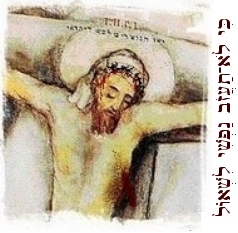
Yeshua was raised on the third day after his crucifixion, which coincides with the Yom Bikkurim, or the Feast of Firstfruits, which is the third day of Passover (Nisan 17).
04.15.25 (Nisan 17, 5785) Every year I get asked when the resurrection of Yeshua likely occurred in relation to the date of Passover. The reason for the confusion, I think, is that the Jewish calendar is different than the secular calendar, and the date for Passover is not fixed in relation to it. To get an understanding of the issues, we must first keep in mind that the biblical "Day" (capitalized) begins at nightfall, which may seem a bit counter-intuitive. This is based on the Torah's definition of a day as the time between "evening and the morning" (עֶרֶב וָבֹקְר) repeatedly used in the account of the creation. Hence we speak of Passover as occurring just after nightfall of Nisan 15, and continuing through the night and throughout the day until the following nightfall, which then becomes Nisan 16. Remember that together the "night-day" span of time is considered a biblical "Day."
Now with this distinction firmly in mind, we can try to make sense of the time of the early Passover of Yeshua and his resurrection from the dead three nights and days later...
First, we know that Yeshua had an early seder with his disciples, because as the "Lamb of God," he would have to be sacrificed on Nisan 14, during the time the Passover lambs were slaughtered at the Temple (recall that the original Passover lamb was slaughtered and its blood daubed on the doorways before nightfall in Egypt (Exod. 12:6-7). Therefore Yeshua's seder would be on afternoon of Nisan 13 (a Wednesday), which would move into the first hours of the Nisan 14 after the seder was complete. After the seder, then, on Wednesday night, Yeshua left for the grove of Gethsemane (גת שמנים) at the foot of the Mount of Olives, where he underwent his agony, was betrayed by Judas, and was arrested (Matt. 26:30-50).
Early in early morning of Nisan 14 (i.e., Thursday morning) the "chief priests and elders" conspired to take Yeshua before Pilate to be executed (Matt. 27:1-33). Because it was the day before Passover, however, they asked Pilate to break the legs of those being crucified so that their bodies would not remain on the cross during the Passover "high Sabbath" (John 19:31). This meant that Yeshua would have to be quickly tried and judged so that he would be dead before the Passover began at nightfall... Hence the priests and elders roused the rabble to call for Yeshua's immediate condemnation, despite Pilate's objections (Mark 9-15). Yeshua was condemned to die by crucifixion sometime the late morning of Nisan 14.
Therefore on Nisan 14, from noon until three in the afternoon on Thursday, darkness covered the land, and Yeshua then cried out אֵלִי אֵלִי לָמָה עֲזַבְתָּנִי - "My God, my God, why have you forsaken me?" (Matt. 27:46). A few moments later, He died upon the cross (his legs were left unbroken because he had already died before the Roman soldiers executed the order to break the legs). At the moment of his death, however, the veil of the Temple was torn from top to bottom, there was an earthquake that shook the area, and many miracles occurred (Matt. 27:50-54). Later that afternoon, Joseph of Arimathaea asked Pilate for permission to bury the body of Yeshua before the sun would set that day (Matt. 27:57-58) .
So we see that Yeshua was crucified and died on the day before the Passover, during the afternoon of Nisan 14, which is considered a "half day" in the "three days and nights" of being in the earth before his resurrection from the dead (Matt. 12:40).
Yeshua remained in the tomb throughout the first two (full) Days of Passover, that is, from Nisan 15 (from nightfall until following nightfall on Friday) and on Nisan 16 (from nightfall until following nightfall on Saturday), and He was resurrected sometime during the night of Nisan 17, before sunrise on Sunday morning when the women at the tomb discovered the stone had been rolled away and Yeshua's body was gone (Matt 28:1; John 20:1).
So, transposing this to the secular calendar for this year, Yeshua held his early Passover seder on Nisan 13th (Wednesday), which became Nisan 14th at sundown. That night he was betrayed and arrested, and early the following morning (Thursday) he was brought to Pilate for judgment by crucifixion. He died later that afternoon, at the time of the sacrifice of the lambs at the Temple, on Nisan 14, and was buried before sundown. He was in the tomb for all of Nisan 15 and Nisan 16, and was raised from the dead sometime during the night of Nisan 17 (a Saturday) -- before the women discovered the empty tomb (early Sunday morning). Again, the benefit of this reckoning is that it accounts for the prophecy of Yeshua that he would be in the earth for "three days and three nights."
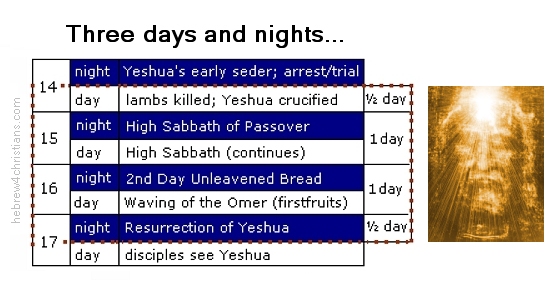 |
I realize there may be questions about this way of understanding the timing of the resurrection of Yeshua, but this account is in harmony with the basic facts of the Passover holiday and how it served as a "type" or foretelling of the death, burial, and resurrection of our LORD. And third Third Day of Passover therefore commemorates the glory of his resurrection from the dead. Happy third day of Passover and Yom Bikkurim, chaverim!
Hebrew Lesson
Psalm 16:10 reading (click):
Passover Week Torah Readings...
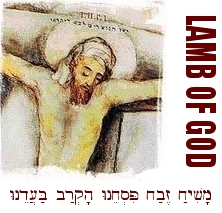
04.13.25 (Nisan 15, 5785) The weekly Torah Reading cycle is suspended for the holiday week of Unleavened Bread (called "Passover Week"), with each day of the week (from Nisan 15 through Nisan 22) assigned additional readings from the Torah and Haftarah.
Unlike Western Christian tradition that followed the dictates of Emperor Constantine who oversaw the Council of Nicaea (325 A.D.) and decreed that "Easter" must be observed on the first Sunday following the first full moon after the spring equinox (March 21), the early Messianic believers in Yeshua followed the Jewish calendar by observing Passover on Nisan 14 as clearly prescribed in the Torah (see Exod. 12:18; Lev. 23:5; Num. 9:4-5; Num. 28:16; Josh. 5:10), with the resurrection occurring three days later, on Nisan 17 (Yom Bikkurim).
For more information about the specific Torah readings for Passover, see "Weekly Torah Readings" page on the Hebrew for Christians web site.
Hebrew Lesson
Leviticus 23:5 reading (click for audio):
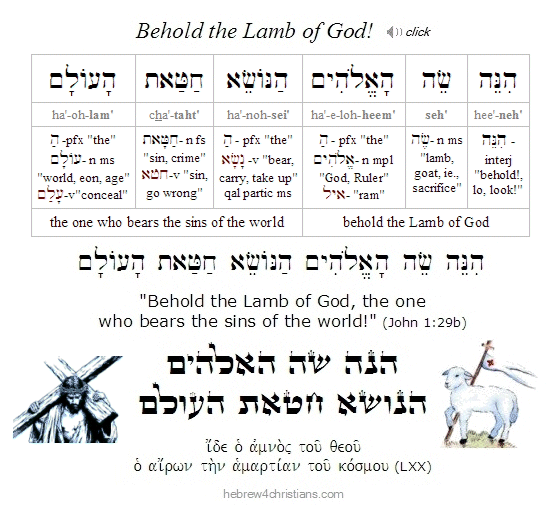 |
Retelling the Story...
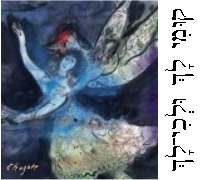
"In every generation, each of us is obligated to see himself or herself as though he or she personally came forth from Egypt."- Traditional Hagadah
04.11.25 (Nisan 13, 5783) Concerning the observance of the Passover Seder the Torah states, "When your child asks you in time to come, 'What is the meaning of the testimonies and the statutes and the rules that the LORD our God has commanded you?' then you shall say, 'We were slaves (עבדים היינו) to Pharaoh in Egypt, but the LORD brought us out of Egypt with a mighty hand. And the LORD showed signs and wonders, great and grievous, against Egypt and against Pharaoh and all his household, before our eyes" (Deut. 6:20-23). We are instructed to "remember what the LORD your God did to Pharaoh and to all Egypt, the great trials that your eyes saw, the signs, the wonders, the mighty hand, and the outstretched arm, by which the LORD your God brought you out" (Deut. 7:19). As it is written in the Shema, "You shall teach them diligently to your children," we ask, what do we teach? And we answer: Kulo! Everything – the whole story of our deliverance (הסיפור המלא).
The early sages taught that Hebrew word "Pesach" (פסח) can be read as peh (פֶּה), "mouth," and sach (סַח), "speaks," indicating that Passover is a confession of the truth of God's redemption, testifying to the truth of the LORD's faithful love. On Pesach we thank God for the revelation and the wonder of the great Lamb of God that was slain... Indeed, in light of the truth of the Scriptures - both in the Torah, the writings, the prophets, and the New Covenant Scriptures - how is it possible to honor the LORD God of Israel and to celebrate his redemption apart from the Messiah who came to earth to die as the great Lamb of God? Yeshua is the heart and central meaning of the Passover, and there is simply NO valid Passover Seder apart from the blood of the Lamb (Heb. 2:3; Heb 10:28-29).
Hebrew Lesson
Deuteronomy 26:8a reading (click):
Related Topics:
The Sign of the Blood...
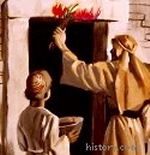
04.11.25 (Nisan 13, 5783) In the Torah we read how God instructed the Israelites to slaughter the Passover and daub its blood on the two sides and top of the doorway of their houses (Exod. 12:7). The LORD would then see the blood and "pass over" their dwellings during the plague of the death of the firstborn. Based on this description, we might assume the blood was put on the outside of the door, though Rashi reasoned that it was placed on the inside, where they themselves could see it as a sign for them (i.e., הָיָה הַדָּם לָכֶם לְאוֹת [Exod. 12:13]). Indeed, after the blood was applied, the doors were shut and no one was permitted to leave the house until the following morning (Exod. 12:22). The blood of the sacrifice was intended to be seen as a sign for those who were trusting in the redemption of God. Likewise, by faith we apply the blood of the lamb to the "inside" of our hearts...
Some have claimed that God intended the blood to be smeared on the doorway in the shape of a cross (represented by the pictogram for the letter Tav, which means "sign"). However, it is difficult to see how the shape of this pictogram resembles the outline of a doorway. Moreover, it is likely that the ancient Israelites wrote using ktav Ivri, which does not have a letter that resembles either a cross or a doorway. In Biblical Hebrew (called ketav Ashurit), the letter that most clearly resembles a doorway is the letter Chet (ח). This letter, signifying the number 8, is connected with the word chai (חי), short for chayim (חיים), "life." Based on this connection, a drash could be made that the blood of the lamb (דַּם הַשֶּׂה) not only saved from the judgment of death but it also symbolized divine life.
At any rate, there is no need to try to find a "literal sign" formed by the smearing of the blood, since the blood of the sacrifice itself was the sign that foreshadowed the greater sacrifice of Yeshua as the Lamb of God (שֵׂה הָאֱלהִים). In other words, it is clear that the sacrifice of Yeshua completely fulfills and reveals the inner meaning of Passover.
Ultimately, the story of the Exodus - and the deliverance indicated by the blood of the lamb - reveals the drama and glorious redemption of Yeshua, the Redeemer of Israel (יהוה גּאֵל יִשְׂרָאֵל) and Savior of the world. Amen!
Hebrew Lesson
Exod. 12:13b reading (click):
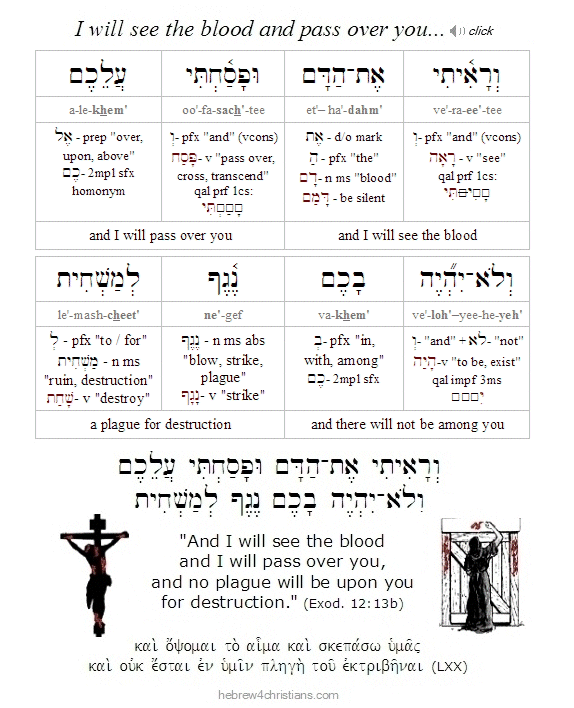 |
The Great Passover Miracle...

04.11.25 (Nisan 13, 5783) If you sometimes feel a bit unsettled or confused about the relationship between the law of God and the message of gospel, you are not alone, for even the Apostle Peter, who was a close disciple of Yeshua for over three years, was confused about the issue. In fact, Peter's confusion eventually led the Apostle Paul to publicly rebuke him for separating himself from Gentiles when certain Jews came to visit him in Antioch (Gal. 2:11-18). It's hard to believe this happened, since Peter should have known better after he was given a direct vision from God showing that Gentiles believers were to be regarded as co-heirs of eternal life given in Yeshua (see Acts 10). Nevertheless, Peter seemed to be afraid of "Judaizers" who insisted that Gentiles must observe the law of Moses in order to be saved, and it was that point in particular that raised the holy ire of the Apostle Paul...
What gave Paul the right to rebuke Peter? Didn't Peter do a lot of miracles and boldly preach that salvation had come to Israel in Jesus (e.g., Acts 2:14-40)? Indeed he did so, though the early disciples, including Peter, were not educated theologians as much as they were faithful witnesses of the life and ministry of Yeshua. It is important to understand that after his conversion, God himself taught Paul the deeper implications of the ministry of Yeshua, particularly as it relates to the Torah (see Gal. 1:11-20). Whereas the four gospels recount the life and ministry of Yeshua, God specifically called Paul to explicate the meaning of the gospel.
Recall that before his conversion Paul was a Torah student under Rabbi Gamaliel (גמליאל), a leading member of the Sanhedrin during years concurrent with Yeshua as he was preaching in Judea (Acts 22:3). Rabbi Gamaliel, who was the grandson of renowned rabbi Hillel the Elder, is quoted in the book of Acts, where he sagaciously advised the Sanhedrin Council to show leniency toward the followers of Yeshua, saying "let them alone, for if this plan or this undertaking is of man, it will fail; but if it is from God, you will not be able to overthrow them, lest you find yourselves fighting against God" (see Acts 5:34-40).
I recently read an article that asked whether Paul might have known of the teachings of Yeshua before his conversion and whether he might even have heard him preach on various occasions. Perhaps Paul may have witnessed the Lord's crucifixion itself! I think this is an entirely reasonable suggestion, especially since Paul was an earnest Torah student who lived in Jerusalem during the time when Yeshua was preaching there. Surely "Rabbi Sha'ul," as he might have been called, would have been keenly interested in Yeshua's discussions and confrontations with the scribes and Pharisees, and he likely would have been provoked by Yeshua's rejection of the priesthood of the Temple as well. And surely Paul would have been intensely concerned about Yeshua's claim to be the Messiah of Israel!
Paul witnessed the testimony Stephen and approved of his execution (see Acts 6:8-8:2). Shortly afterward we read that he was consumed with the madness of religious rage and volunteered to lead a posse to arrest followers of Yeshua who had fled to Syria and to bring them back to Jerusalem to face charges of blasphemy. It was during this Jewish "crusade," you will recall, that Paul was suddenly blinded by the light from heaven as he heard Yeshua (speaking in Hebrew) saying, "Saul, Saul, why do you persecute me?" Saul then answered, "Who are you, Lord?" and the voice replied, "I am Yeshua whom you are persecuting" (Acts 9:1-20; Acts 26:10-18).
Paul immediately understood the implications. He didn't need any further explanation. Perhaps in a flash he remembered Stephen's amazing testimony as he died for his faith, or perhaps he recalled the vision of Yeshua dying on the cross... We are not sure what went through his mind, but it is clear that he immediately accepted the Voice that spoke to him as being none other than that of Yeshua himself, raised from the dead.
This might explain why Paul regarded the crucifixion of Yeshua to be the most significant thing God has ever done, surpassing all the glories and wonders of the Exodus from Egypt and the giving of the law at Sinai (1 Cor. 2:2; Gal. 6:14). The significance of the cross and the resurrection of Yeshua suddenly opened Paul's eyes to the better and more profound redemption accomplished by God that set him free from slavery to religion...
So do you see why Paul had a problem with Peter's hypocrisy? When he wrote about the original controversy, Paul said: "When Peter had come to Antioch, I withstood him to his face, because he was in error. When he first arrived there, he ate with the Gentile Christians, who were not circumcised. But afterward, when some friends of James came, Peter wouldn't eat with the Gentiles anymore because he was afraid of those people who insisted on the necessity of circumcision. As a result, other Jewish believers followed Peter's hypocrisy, and even Barnabas was led astray by their hypocrisy (Gal. 2:11-13).
It is almost shocking that Peter acted this way. It seems as if Peter forgot what Yeshua had taught, despite being a close disciple of Yeshua for several years and someone who had personally seen the resurrected Lord after his crucifixion. It is baffling that the very man Yeshua chose to be the "rock" and pillar of the early church was unclear about the ministry of the Lord and the implications of the gospel, and therefore God sovereignly called Paul to explain and clarify the meaning of the crucifixion...
Peter's hypocrisy aside, the crux of the matter had to do with the believer's relationship to the "law," understood as the collection of commandments given to Israel at Sinai through the mediation of Moses, and ratified as a special covenant with the Jewish people (Exod. 24:7-8). In later Jewish tradition, the idea of "law" extended beyond the written commandments to include matters of custom and self-serving interpretations... In essence, the controversy raised the question whether Christians were obliged to observe the law given at Sinai or whether the new covenant in Yeshua had replaced it.
Paul argued that while the moral law of God is constant, the new covenant is truly new, not a renewed version of the Sinai covenant with its conditional blessings for obedience and curses for disobedience. The moral law of God itself is holy, just, and good, but Yeshua came to set us free from the need for the law itself by transforming the hearts of people to make them into God's beloved children (Jer. 31:31-34; Ezek. 36:26-27; Gal. 4:1-7). Likewise the laws for sacrifice were temporary and provisional until Yeshua came to offer up his life as the High Priest and mediator of the new covenant of God (Heb. 10:4).
The danger of "mixing" the covenants was so great that Paul wrote the Book of Galatians as a sustained argument against the possibility. Far beyond rejecting the idea that followers of Yeshua were required to keep the law of Moses to be saved, Paul argued that they no longer were related to the former covenant at Sinai at all, and he went so far as to say that he "died to the law so that he could live to God" (Gal. 2:19). That is a very bold statement, particularly coming from Paul, who once boasted that he was far ahead of his fellow Jews in his zeal for the traditions of his ancestors (Gal. 1:14). Earlier he had testified to Agrippa, "I am a Jew, born in Tarsus in Cilicia but brought up in this city (i.e., Jerusalem), educated with strictness under Gamaliel according to the law of our ancestors, and was zealous for God" (Acts 22:2). Yet despite all his Jewish pride and zeal, Paul compared his education and heritage as "dung" compared with the excellencies of knowing Christ.
In another letter Paul wrote: "For we are the circumcision, who worship by the Spirit of God and glory in Christ Jesus and put no confidence in the flesh -- though I myself have reason for confidence in the flesh also. If anyone else thinks he has reason for confidence in the flesh, I have more: circumcised on the eighth day, of the people of Israel, of the tribe of Benjamin, a Hebrew of Hebrews; as to the law, a Pharisee; as to zeal, a persecutor of the church; as to righteousness under the law, blameless. But whatever gain I had, I counted as loss for the sake of Christ. Indeed, I count everything as loss because of the surpassing worth of knowing Christ Jesus my Lord. For his sake I have suffered the loss of all things and count them as dung, in order that I may gain Christ and be found in him, not having a righteousness of my own that comes from the law, but that which comes through faith in Christ, the righteousness from God that depends on faith" (Phil. 3:3-9).
Paul did not say all this to boast of his Jewish heritage and background, but on the contrary he said this to point to Yeshua as the all-sufficient way for anyone - Jew or Gentile - to be made right with God. And that is why Paul sought to persuade Peter, who perhaps was still wondering if he should observe Jewish custom and law, saying: "You and I are Jews by birth, not 'sinners' like the Gentiles, yet we know that no one is justified by the works of the law but by the faithfulness of Jesus Christ. And we have come to believe in Christ Jesus, so that we may be justified by the faithfulness of Christ and not by the works of the law, because by the works of the law no one will be justified" (Gal. 2:15-16).
I've said it before, I'll say it again: Yeshua is not the "second coming" of Moses... There is something truly new with the "new covenant" with God in Messiah, not something merely reworked or "renewed." Paul put it this way: "I have been crucified with Christ, nevertheless I live, yet not I, but Christ lives in me, and the life I now live in the flesh I live by the faith of the Son of God, who loved me and gave himself for me. I do not frustrate the grace of God: for if righteousness come by the law, then Christ died in vain" (Gal. 2:20-21).
Most of us familiar with Christian theology are familiar with this passage, but at that time it was a shocking and even scandalous message for those who were born and raised to be followers of Moses. The Apostle Paul, the trained Torah sage, was keenly aware of the stakes and what a radical change was implied by the ministry of Yeshua. Therefore he went so far as to liken the Sinai covenant to a kind of slavery when compared to the new covenant of freedom (see Gal. 4:21-31). Trying to mingle the covenants of Sinai and Zion leads to confusion and to adulterous destruction (Gal. 1:6-9; 2:4-5; 2:21; 3:3,10, etc.). Only the "death benefits" of Messiah makes you an heir to the Kingdom of God (Gal. 4:4-7).
Paul's teaching - and the overall message of the New Testament - is that Yeshua is the "end" or the "goal" of the law for all who believe, the substance of all that the law required. If you are hoping to get right with God, trying to keep the law is a dead end. Yeshua repeatedly taught that we are slaves to sin that need to delivered by God's power, and that this power comes from trusting in the righteousness of God found in him.
Yeshua pointed to God's power to save from sin when he told his disciples, "For I tell you that this Scripture must be fulfilled in me: 'And he was numbered with the transgressors.' For what is written about me has its fulfillment" (Luke 22:37). Here the Lord refers to the cross he would bear on our behalf and the great suffering servant servant prophecy of Isaiah: "Out of the anguish of his soul he shall see and be satisfied; by his knowledge shall the righteous one, my Servant, make many to be accounted righteous, and he shall bear their iniquities" (Isa 53:11).
Some people falsely say that Paul "invented" the doctrine of "justification by faith." Nonsense. It was alluded to in the Torah (Gen. 15:6), but Yeshua plainly taught that we are justified by faith in him and not by means of keeping the law. Recall the parable of the two men who went to the temple to pray (Luke 18:9-14). One was an "observant" Jew who did his best to keep the law, and who celebrated that he was "not like other men," and the other was a woebegone sinner who could only sigh, "God, be merciful to me, a sinner!" Yeshua says it was the honest and broken sinner who returned to his house justified, but not the other.... Indeed, even a carefully observant Jew who has done "all that God commanded" is still an "unworthy servant" that stands in need of salvation (Luke 17:10).
It's a great irony only God could orchestrate that the greatest rabbi of the Second Temple period, a man with the zeal of Pinchas, one who who fervently sought to persecute any who dared impugn the sanctity of Torah, was converted by God's sovereign intervention to become the great teacher of the significance of the gospel of Yeshua! No one was more qualified to understand the radical difference between justification through keeping the law and justification imparted by faith in the power of God than was Paul...
Among other things Paul wrote that "when the fullness of time had come, God sent forth his Son, born of woman, born under the law, to redeem those who were under the law, so that we might receive adoption as his children. And because we are his children, God has sent the Spirit of his Son into our hearts, prompting us to call out, 'Abba, Father'" (Gal. 4:4-5). He further said that "what the law could not do in that it was weak through the flesh, God did by sending His own Son in the likeness of sinful flesh, on account of sin: He condemned sin in the flesh, that the righteous requirement of the law might be fulfilled in us who do not walk according to the flesh but according to the Spirit" (Rom. 8:3-4). He pointed to Yeshua as the manifestation of the Savior and true redemption of God: "For He made Him who knew no sin to be sin for us, that we might become the righteousness of God in Him" (2 Cor. 5:21). Every knee shall bow and every tongue shall confess that Yeshua alone is Lord (Phil 2:9-11).
At the risk of being redundant, at issue here is nothing less than the truth of how we are made right with God. The "Judaizers" were a group of Jews who believed that traditional adherence to the law was necessary for salvation, even for Gentiles proselytes who came to believe in Yeshua. "But some men came down from Judea and were teaching the brothers, 'Unless you are circumcised according to the custom of Moses, you cannot be saved' (Acts 15:1-5). Paul vigorously opposed this teaching because he understood the implications of what was being implied by the Judaizers. The controversy came to a head at the Jerusalem Council (Acts 15) where James presided and the matter was settled in agreement with Paul that "no one is justified by observing the law but by faith in Yeshua the Messiah. So we, too, have put our faith in Yeshua that we may be justified by faith in him and not by observing the law, because by observing the law no one will be justified" (Gal. 2:16). Paul succinctly made his summary point by saying "I do not frustrate the grace of God: for if righteousness come by the law, then Christ died in vain" (Gal. 2:21).
Justification by faith is indeed the true teaching of Yeshua. Listen to some of his words on the subject: "Truly, truly, I say to you, whoever hears my word and believes him who sent me has eternal life. He does not come into judgment, but has passed over from death to life" (John 5:24). "Truly, truly, I say to you, whoever believes has eternal life" (John 6:47). As Moses lifted up the serpent in the desert, so everyone who looks to Yeshua will be saved. "This is the will of my Father, that everyone who looks on the Son and believes in him should have eternal life, and I will raise him up on the last day" (John 3:14-15; 6:40). More could be said about this, but these verses alone should suffice to demonstrate that Paul's understanding of the gospel was grounded in what Yeshua himself had taught. Faith in Yeshua saves the soul...
Now I want to shift my attention to something that is utterly profound and that summarizes the existential meaning of the gospel for the person who receives its truth, and that has to do with what really happened during the crucifixion and resurrection of our Lord...
The cross of Messiah means more than being saved from the judgment of hell... Of course that is part of its significance, and we are infinitely grateful for Yeshua's sacrifice on the cross for our healing and atonement, but we need to think this out some more by asking if our forgiveness of sin is the substance of the gospel, or is there something more? Is forgiveness the end of the matter or it is the means to something far more vital and significant?
Some people think "Jesus died for my sins and now I am just waiting for the glories of heaven to come some day," but is that all there is to the salvation of God - a future happiness, a "ticket to ride" into the kingdom to come, and so on? Might it not be better to say, "Jesus died for my sins, in my place, so that I might now live in his righteousness for his sake? Are we not redeemed for the purpose of bearing the life of Yeshua within us, to become living extensions of his presence here on the earth? (John 17:14-23).
In this connection I want to again quote Paul's radical summary regarding the cross: "For I through the law died to the law that I might live to God. I have been crucified with Christ, nevertheless I live, yet not I but Christ lives in me, and the life I now live in the flesh I live by faith in the Son of God who loved me and gave himself for me" (Gal. 2:19-20). Note here the number of personal pronouns used in this passage. The pronoun "I" appears seven times, and the pronoun "me" is used three times. How can we unravel this?
The statement "I through the law (διὰ νόμου) died to law (νόμῳ ἀπέθανον) that I might live to God" summarizes and encapsulates the doctrine of "justification by faith." The law serves as a mirror that shows our need for salvation, whereas the cross of Messiah (and our relationship to it) allows us access to the Holy of Holies by the blood of Yeshua, "by a new and living way which He consecrated for us, through the veil, that is, His flesh" (Heb. 10:19-20). Yeshua was "under the law" and lived a life of complete righteousness, thereby becoming our perfect intercessor as he offered up his life in exchange for our own. There is a "new altar" that transcends what was given in the Levitical sacrificial system (Heb. 13:10).
"I have been crucified with Christ" (χριστῷ συνεσταύρωμαι) is the affirmation that my sinful life has been "incorporated" into Yeshua's own, just as he was sacrificed in my place and for my behalf. The "I" here refers to the old sin nature inherited through Adam's original transgression. God made Yeshua who knew no sin to be sin for us, that we become the righteousness of God in Him" (2 Cor. 5:12).
Then there's the next part: "nevertheless I live" (ζῶ δέ). Like Barabbas who was released from his death sentence, so am I released, though in the case of the crucifixion, the release takes place after the death of Yeshua, as his resurrected life is imparted within me. "I" am made new. I live, but not I (οὐκέτι ἐγώ), that is, not as I was before, but "Christ lives in me" (ζῇ δὲ ἐν ἐμοὶ χριστός), that is, I am who I am in relationship to God. This is Paul's way of saying he was "born again": the old nature derived from Adam has been crucified and a new nature has been given through his union with Yeshua. This is the power given to live according to the righteousness of God.
Just as you are to trust and to accept that Yeshua was crucified for you, on your behalf, incorporating you into his heart, taking your place in judgment, exchanging his life for your own, so you are to trust and to accept that you have been crucified with him, and that your old life was taken away and replaced with a new, indestructible nature of his resurrection life. A blessed union is created where his "for me" is answered by your "with him." Χριστῷ συνεσταύρωμαι– "I already have been crucified in Messiah." The two go together: trusting in the finished work of Messiah for you is trusting in his finished work within you, and that means living a new kind of life as a beloved child of God...
Paul's devotional conclusion logically follows: "The life that I now live in the flesh I live by faith in the Son of God who loved me and gave himself for me." This again is the new "I" or life created by God that trusts in his redemption given in Yeshua. Instead of connecting with God on the basis of the law of Moses and its ordinances, I am set free to live in heartfelt relationship with the Son of God who loves me and gave himself for me... I now have access to the throne of God's grace and rejoice in the glory of God given in our Savior the Messiah.
Yeshua did not come to "reform" or improve the old human nature, but to put an end to it, to kill it, crucify it, and bury it in the depths. It is just as much a matter of faith to receive the death of Yeshua as it is to receive his life. Receiving his death means identifying with his cross and leaving the old life in the tomb; receiving his life means knowing yourself made new by the power of his resurrection. "Therefore, if anyone is in Christ, he is a new creation; old things have passed away; behold, all things have become new" (2 Cor. 5:18).
The end of the matter is "Christ lives in me" (ζῇ δὲ ἐν ἐμοὶ χριστός). The redeemed life is known by the new nature, the divine seed implanted within your soul at your rebirth and derived from your union in Yeshua's resurrection. It is by the eternal life given by Yeshua that we are able to "live to God" (ἵνα θεῷ ζήσω). The indwelling of Yeshua refers to his everllasting connection with your regenerated heart as a child of God. The divine seed of his life is the power of God within the trusting heart, making it grow in grace. God attests to his faithful love by putting the spirit of his Son into our hearts, crying, "Abba! Father!"
"I decided to know nothing among you except Yeshua the Messiah and him crucified" (1 Cor. 2:2). This is what mattered most to Paul in his relationship with God. The cross of Messiah means far more than being released from the verdict of death that our sin warrants and evokes, but instead is about the miracle of an exchanged life, the miracle of rebirth and divine life. We need God as our healer and our priest more than our lawgiver. We were redeemed from our bondage to sin and death for the purpose of being part of Yeshua's life and heart, part of his family, members of the gloprious "Kingdom of God." Amen. "I have been crucified with Christ," whatever I was in my former life is now gone; I am quickened and made alive as a new person, raised from the dead, and created by God's grace to be as his beloved child forever. All this comes from the merciful kindness of Yeshua, who loved me and gave himself for me. Blessed be his name forever and ever!
Shabbat Shalom and let us celebrate the great Passover miracle of God in our hearts!
Hebrew Lesson
Rev. 5:12 Hebrew reading (click):
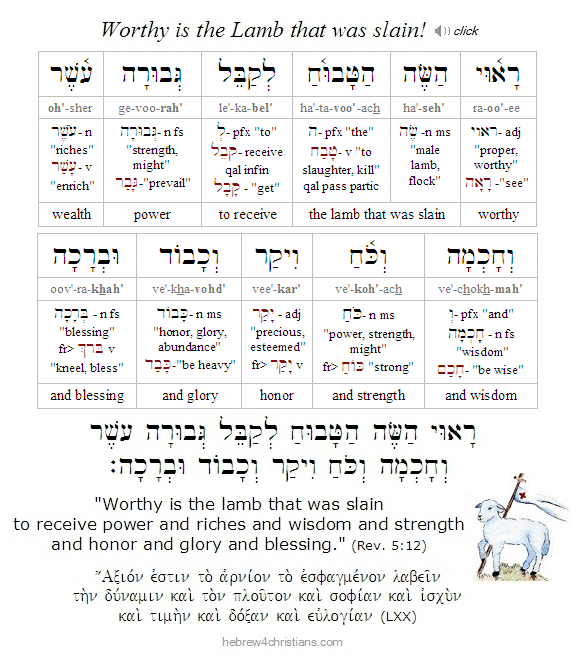 |
Passover and Teshuvah...
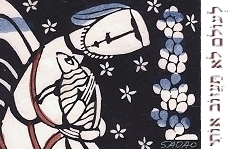
"God comes to us because God is love, and love cannot help but share itself with the beloved. [It has been] a long and lonely winter, and we will pray, believing in the seed that is planted in the depths of our soul. We will wait and watch, expecting the promise of new life filled with the joy of God's eternal presence."- A. Quezada
04.10.25 (Nisan 12 5785) The only way we can draw near to God is if we earnestly believe that He is near to us, personally, intimately... "Behold I stand at the door and knock" (Rev. 3:20). Faith "hears the knock" as God's desire to draw near; faith hears his voice and opens the door to his presence; faith believes to partake in his communion.... As it is written:"Draw near to God and God draws near to you" (James 4:8). The Hebrew word karov (קרוב) is translated using engidzo (ἐγγίζω) in New Testament Greek, a word that means to come close and touch... When we draw close to God, we reach out and find God holding us. Our "I" melts away as we cling to God as our dear life; we become one with his heart; we lose ourselves to find ourselves.
Hebrew Lesson
Zechariah 1:3b reading (click):
 |
"Turn to me, and I will turn to you..." (Zech. 1:3). You may wonder why we must take the initiative, yet that is because God has never turned away from us; he has always been the one who loves us most of all and awaits our response to his love.... Indeed, he has come to meet with you; he draws near in Yeshua and calls out for you (Matt. 11:28). "Turn to me and you will discover that I have never left you nor forsaken you; I have always been here."
Yeshua illustrated the idea of teshuvah (i.e., תְּשׁוּבָה, "returning to God") by telling the famous parable of the "prodigal son" (Luke 15:11-32). After selfishly squandering his father's inheritance, a wayward son decided to return home, full of shame and self-reproach. "But while he was still a long way off, his father saw him and was filled with compassion for him; he ran to his son, threw his arms around him and kissed him." The father then ordered a celebratory meal in honor of his lost son's homecoming. When his older brother objected, the father said, "We had to celebrate and be glad, because this brother of yours was dead and is alive again; he was lost and is found."
This story reveals that teshuvah ultimately means returning (shuv) to the outstretched arms of your Heavenly Father... God sees you while you are still "a long way off" (Rom. 5:8). He runs to you with affection when you first begin to turn your heart toward Him. Indeed, God's compassion is so great that He willingly embraces the shame of your sins and then adorns you with "a fine robe, a ring, and sandals." Your Heavenly Father even slaughters the "fattened calf" (Yeshua) so that a meal that celebrates your life may be served....
 |
Taking Passover Personally...

The great holiday of Passover begins Saturday April 12th at sundown...
04.10.25 (Nisan 12 5785) The message of Passover applies to each of us: "In each and every generation an individual should look upon him or herself as if he or she (personally) had left Egypt." Indeed the very First Commandment is to accept the reality of your personal deliverance by the LORD: "I am the LORD your God, who brought you (singular) out of the land of Egypt, out of the house of slavery" (Exod. 20:2).
Note that the Hebrew word "Egypt" is mitzraim (מצרים), a word that means "prison, enclosure, or straights," from the verb tzur (צוּר) meaning "to bind or confine" (the Yiddish word tsuris, "trouble," comes from the same root). On the other hand, the Hebrew word for salvation is yeshuah (ישועה), from a root that means to "make wide," to "release from constraint," to deliver or set free.
It is noteworthy that God began the Ten Commandments by identifying Himself as our Redeemer and Deliverer rather than as our Creator, because the very purpose of creation is to be set free by means of God's redemptive love given through Yeshua, the "Lamb slain from the foundation of the world" (Rev. 13:8; 1 Pet. 1:18-20; Eph. 1:4; 2 Tim. 1:9). Amen. The book of Genesis is the context to the story of the Exodus. Happy Passover, friends...
Hebrew Lesson
Exodus 20:2 reading (click):
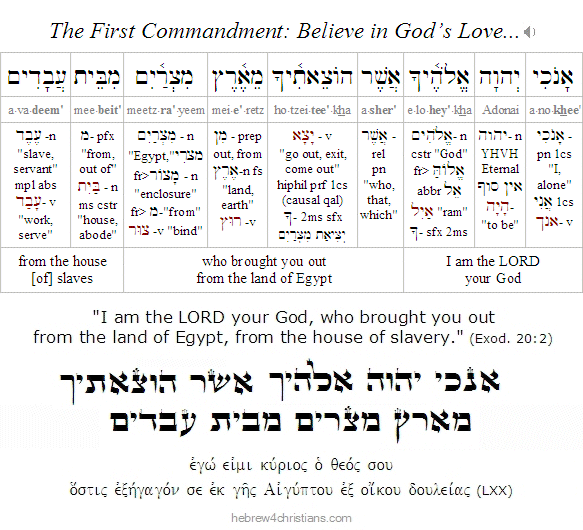 |
When does Passover begin?
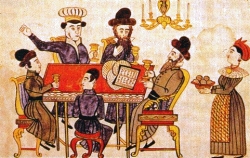
04.09.25 (Nisan 11 5785) It might be a bit confusing to understand exactly when Passover begins, at least from a traditional Jewish point of view. Does it begin on Nisan 14 or Nisan 15? To find an answer to this question, we first need to make a distinction between zman shechitat korban Pesach (the time of the slaughter of the Passover lambs) and then consider the commemoration of the holiday that was later instituted as the "Passover Seder."
The original sacrifice of the Passover (in Egypt) was of an unblemished male lamb that was selected on Nisan 10 and kept until the evening of the 14th, when it was sacrificed and its blood applied to the two doorposts and upper lintel of the house using a bunch of hyssop (Exod. 12:2-7, 22). The door to the house was then sealed and no one was permitted to leave until the following morning (Exod. 12:22).
The blood on the doors would function as a sign for God to "pass over" the house when He descended to slay all the firstborn of Egypt later that night (Exod. 12:13). Within the sealed house - during that very night (לַיְלָה) - the lamb would be roasted over a fire and eaten with unleavened bread and bitter herbs (Exod. 12:8). This sacred meal was to be commemorated as a feast to the LORD throughout all generations and retold during the Passover seder service (see Exod. 12:14, 25-27). Moreover, to commemorate the haste in which the Jews were brought out of Egypt, for seven days - from the evening of Nisan 14 until the evening of Nisan 21 - only unleavened bread was to be eaten and no leaven was to be found within any of the houses (Exod. 12:17-20).
During the time of the Temple, zman shechitat korban Pesach (the time of the slaughter of the Passover lambs) was performed during the afternoon hours of Nisan 14, in observance of the commandment: "In the first month, on the fourteenth day of the month, between the evenings (i.e., bein ha-arbayim: בֵּין הָעַרְבָּיִם), is the Passover for the LORD" (Lev. 23:5). Note that the time of the lamb's sacrifice is described as "bein ha-arbayim," usually translated as "between the evenings" or "between the settings." To the sages, the "first setting" of the Sun occurred at the beginning of its descent after noon, and the "second setting" referred to sundown or twilight. Hence "bein ha-arbayim" would mean sometime after noon but before twilight, or more simply, "the afternoon."
The sacrifice of the Passover lambs on the afternoon of Nisan 14 agrees with Jewish Oral Law and tradition. As Maimonides wrote, "It is a positive commandment to slaughter the Korban Pesach on the fourteenth of Nisan after midday" (Hilchot Korban Pesach). There is some discussion among the sages, however, as to whether the sacrifice of the korban Pesach occurred before or after the second set of tamid (daily) offerings made at the Temple (Exod. 29:38-42, Num. 28:1-8). In general, however, most of the sages agreed with Maimonides who clearly stated: "The Korban Pesach is not slaughtered until after the Tamid of the afternoon." In other words, the slaughter of the Passover lambs occurred on the late afternoon of Nisan 14.
Note that though the sacrifice of the Passover lamb occurred on the afternoon Nisan 14, the ceremonial eating of the meal, or the "seder," would begin later, just before sundown and continue throughout the night. This agrees with Exod. 12:8 which states clearly that the Passover meal was consumed during the night: "They shall eat the flesh [of the Pascal lamb] that night" (i.e., ba-lailah hazeh: בַּלַּיְלָה הַזֶּה). And since the Jewish day begins after sundown (when three stars are visible in the night sky), the traditional Passover Seder would begin just before sundown on Nisan 14 but would continue into the new day of Nisan 15, which is also the start of the seven-day festival of chag ha-matzot (חַג הַמַּצּוֹת), the "Feast of Unleavened Bread" (Lev. 23:6).
In light of all this perhaps you can better appreciate why Jewish tradition regards "Passover" as an eight day holiday, since it links the times of the korban Pesach, the Seder meal, and the seven days of unleavened bread together as a whole.
Today the traditional Passover Seder begins on "Erev Pesach," meaning just before sundown on Nisan 14 and running into the first hours of Nisan 15 (outside of Israel a second seder is often held the following evening as well). The date of Passover can be somewhat confusing if you look at a Jewish calendar to see it listed simply as "Nisan 15." Again we must remember that the Jewish day begins on the night before it is listed on the calendar. For example, if the calendar says that April 13th is Nisan 15 (i.e., Passover), then understand that Nisan 15 actually begins at sundown on the night before, i.e., April 12th:
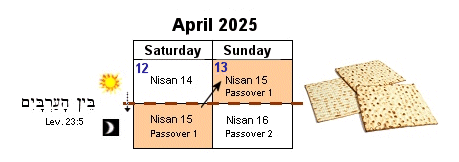 |
Unfortunately, many calendars refer to the previous evening as "Erev Pesach" without indicating that the first "day" spans the end of Nisan 14 and carries over to Nisan 15.
In answer to our original question, then, (i.e., "Does Passover begin on Nisan 14 or Nisan 15?"), the answer is that while the Passover sacrifice was made on the afternoon of the 14th, the Passover Seder will span both the 14th and 15th! I realize all this might be a bit confusing, but it's just the way the Jewish calendar works!
Hebrew Lesson
Leviticus 23:5 reading (click for audio):
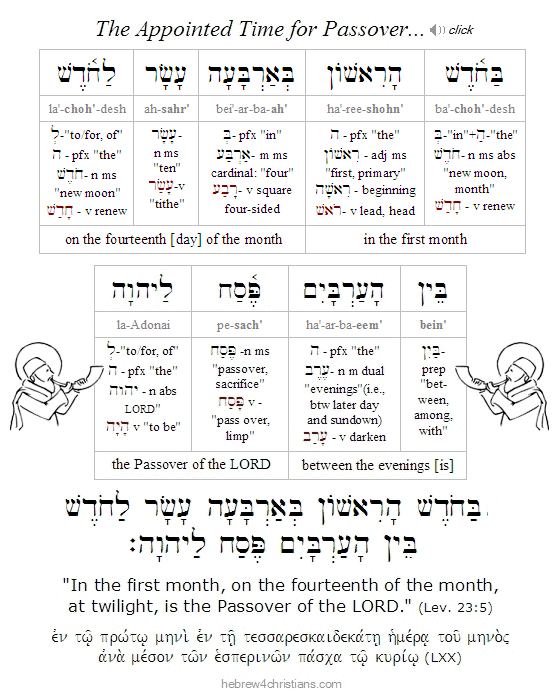 |
A Closing Thought...
The important point in all of this, of course, is that Yeshua is the "Lamb of God" who was sacrificed and raised from the dead according to the Scriptures (1 Cor. 15:3-5). As for the precise calculations involved in all this, including the time of His early Seder with His disciples, the exact hours of His crucifixion, and so on, there are numerous questions, though I wholeheartedly and completely trust that Yeshua completely fulfilled the types and prophecies concerning the truth of the Passover. Amen.
"The" Question of Passover...
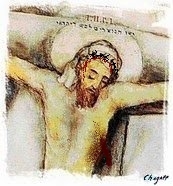
04.09.25 (Nisan 11 5785) During the Passover Seder we begin our retelling the story of the Exodus when the question is sung: "Mah nishtanah ha-lailah ha-zeh mikol ha-leilot?" - What makes this night differ from all other nights? This is "the" central question of Passover, asked for thousands of years, and the answer is always the same: Avadim Hayinu: "We were slaves, but God redeemed us from bondage by the blood of the lamb (דַּם הַשֶּׂה)."
In this connection note that there were not many lambs, but the LORD told Israel: "You shall keep it [i.e., the Passover lamb] until the fourteenth day of this month, when the whole assembly of the congregation of Israel shall slaughter him (את) at twilight (Exod. 12:6). Each family put their trust in God's uniquely appointed sacrifice to be delivered from the plague of death (מכת המוות). There is no Passover apart from the blood of the Lamb of God....
Hebrew Lesson
Exod. 12:6b reading (click for audio):
Passover Soul Searching...
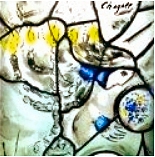
The following is related to the theme of repentance before the holiday of Passover...
04.09.25 (Nisan 11 5785) The search for chametz (חפש חמץ) before Passover may be likened to the soul searching we do before the High Holidays in the fall, when we take an inventory of our spiritual condition (חשבון נפש) and do teshuvah. For the entire week of Passover we are not to have any leavened products in our homes, nor are we to consume any leavened products outside our home. We are to be "leaven-free" (Exod. 12:19).
This might seem a bit strange, but the Torah associates chametz (חָמֵץ), or "leaven" that which decays and "sours" (חָמוּץ), and it is therefore generally considered to be a corrupting influence or hidden uncleanness that manipulates purer elements. Like the influence of a lump of leaven in a batch of dough, "spiritual" leaven functions as an evil impulse within us that corrupts ("puffs up") and sours our soul. As such chametz is considered a metaphor of sin which we are commanded to put away from us, and the removal of chametz is a metaphor of our sanctification.
The Torah instructs us to mindfully search and remove sources of inner impurity so that we might experience the truth that we are a "new lump" - that is, a new substance that is purged from the decaying and rotting influences of our past lives... And since Yeshua has been sacrificed as your Passover Lamb, you are indeed a new creation (בּריה חדשׁה) made "unleavened" (pure) by the power of the Holy Spirit (2 Cor. 5:17). Therefore you are likewise commanded put away the "old nature" (יצר הרע) and purge from your life the old influences that inwardly canker you and make you sick (Eph. 4:22; Col. 3:9). Walk without hypocrisy in the truth of the love of God for your soul.
חָקְרֵנִי אֵל וְדַע לְבָבִי
בְּחָנֵנִי וְדַע שַׂרְעַפָּי
וּרְאֵה אִם־דֶּרֶךְ־עֹצֶב בִּי
וּנְחֵנִי בְּדֶרֶךְ עוֹלָם

"Search me, O God, and know my heart!
Test me and know my anxious thoughts!
And see if there be any idolatrous way in me,
and lead me in the way of eternity."
(Psalm 139:23-24)

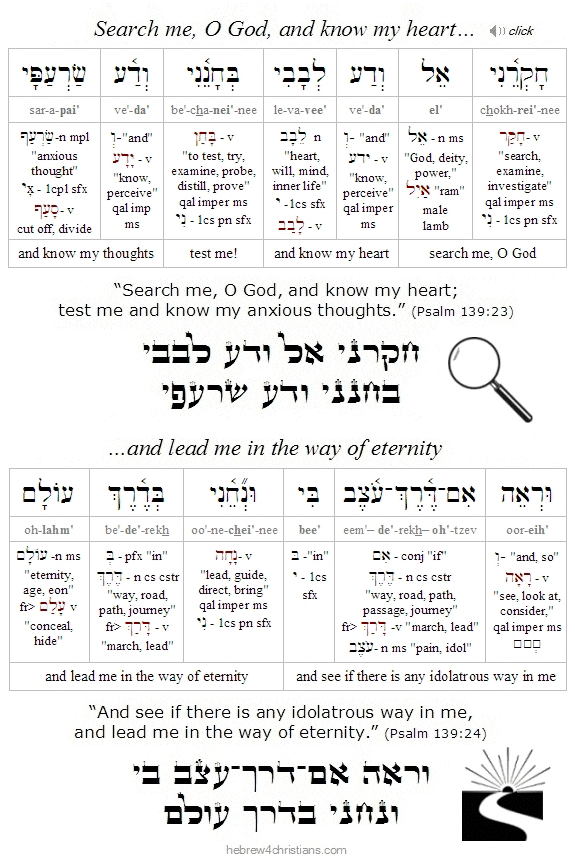
Our Broken Matzah...
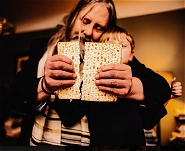
The holiday of Passover begins Saturday, April 12th at sundown this year...
04.08.25 (Nisan 10 5785) During the Passover Seder, three matzahs are placed on the table, said to represent Abraham, Isaac and Jacob, respectively. During the "Yachatz" step of the seder, the middle matzah (representing Isaac) will be broken to recall how Isaac was sacrificed in obedience to his father, foreshadowing the sacrifice of Yeshua by God the Father. Indeed, the Talmud states, "We break the middle matzah in tribute to Yitzchak (Isaac), who accepted the sins of the people upon himself" (Shabbos 89b). The smaller half of this broken matzah will be eaten later during the Motzi Matzah step, while the larger half will be eaten during the "Afikomen" step, near the end of the night...
In Hebrew, the middle of something is it's heart - the heart of the heavens, the heart of the earth, the heart of the sea, the heart of a person... Since the offering of Isaac by Abraham foretold of the greater offering of Yeshua by God Himself, when we break the middle matzah, then, we recall the broken heart of God over the pain Yeshua endured by taking our sins upon Him at the cross...."For our sake he made him to be sin who knew no sin, so that in him we might become the righteousness of God" (2 Cor. 5:21).
During his Passover seder with his disciples, Yeshua "took matzah, and after blessing it broke it and gave it to the disciples, and said, "Take, eat; this is my body" (Matt. 26:26). Since Yeshua did this while they were eating dinner, the matzah he broke would have been the Afikomen, thereby making the connection between the hidden bread (lechem ha-nistar) that would be broken given for our deliverance. The matzah we eat during Passover is called lechem oni (לֶחֶם ענִי) - "the bread of [His] suffering" - and eating the Bread of Life that was "broken for us" remembers ish makhovot, the man of sorrows, the suffering of our LORD...
Hebrew Lesson
Deut. 16:3b Hebrew reading:
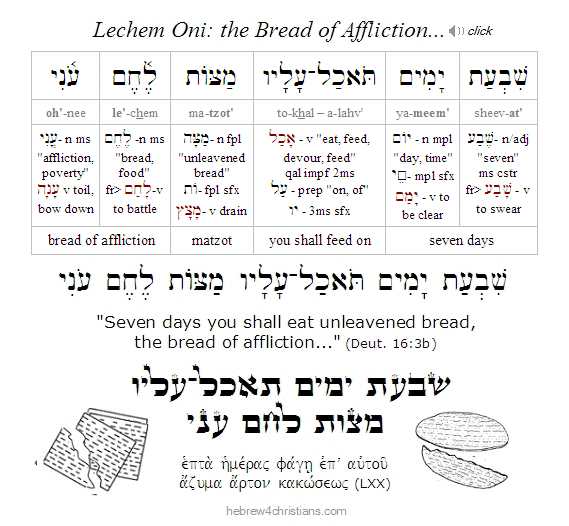 |
Is Passover for Today?

"For Christ our Passover is sacrificed for us; therefore let us keep the feast" (1 Cor. 5:7-8).
04.08.25 (Nisan 10 5785) Some well-meaning Christians think that followers of Yeshua have no reason to do a Passover seder as instructed in the Torah because, in light of the new covenant, all that is now needed is to remember Jesus' crucifixion for our sins and to celebrate his resurrection by partaking in the sacraments. This viewpoint assumes that, despite the instructions in the Torah, the yearly Passover service, or seder, is not intended for Christians, since it focuses on the Exodus from Egypt and the Jewish people, and the message of the gospel is universal, for every "tongue and tribe." Moreover Christians are no longer "under the law" and therefore are not obligated to keep the various ordinances of the "Old Testament," especially with regard its ceremonial laws.
There are some real difficulties when we disregard the Torah's instructions to observe the Passover, however, particularly because Yeshua himself identified his entire ministry as the "Lamb of God" who redeems us from the curse of the law, and he used the message of the Passover to teach his followers this truth. Bear in mind that the idea of the Passover was not enacted at Sinai as part of the Sinai covenant, but *predates the giving of the law.* In other words, the faithful of Israel obeyed God's instruction to take refuge under the blood of the sacrificed lamb to escape the plague of death delivered upon Egypt, but this was done before Moses ascended Sinai to receive and ratify the covenant of the law.
Indeed the theme and message of Passover is timeless for understanding the Bible. The message was delivered in the Garden of Eden when God sacrificed a lamb to cover the shame of Adam and Eve (Gen. 3:21); it was prefigured in the lamb that was sacrificed by Abraham in place of Isaac during the Akedah; it was portrayed in the blood of lamb sacrificed in Egypt whose blood was daubed upon the doorposts; it was memorialized every day and night at the Tabernacle (and later at the Temple) as "continual korban," the offering of which was central to the sacrificial ministrations for Israel; it was foretold by the Hebrew prophets (Isa. 9:6; Isa. 53; Psalm 22:16; Prov. 30:4; Zech. 12:10. etc.), and it was fully manifested in the incarnation, mission, and sacrifice of God's beloved Son himself, the promised heir to come who allowed himself to be "caught in the thicket" for our sins, and who was bound upon the altar of the cross to shed his blood for our redemption. This was the central meaning of the "greater exodus" that Yeshua discussed with Moses and Elijah on the mount of transfiguration before his crucifixion (see Luke 9:29-31). Amen, Yeshua as our sacrificial Lamb is heart of the gospel message itself (John 1:29; 1 Pet. 1:19; Isa. 53:3-12); it's the "scarlet thread" he showed his followers (Luke 24:27); it's the Metaphor God chose to make his sacrificial love known to us.
 |
The message of "Christ our Passover Lamb" (המשיח פסח שלנו) will extend forever and unto eternity itself, when the Lamb of God is fully glorified and enthroned, as it says: "For the Lamb on the throne will be their Shepherd. He will lead them to springs of life-giving water. And God will wipe every tear from their eyes" (Rev. 7:17). "And the city has no need of sun or moon, for the glory of God illuminates the city, and the Lamb is its light" (Rev. 21:23).
The meaning and substance of Passover, then, is essential to the life of the Christian, and to dismiss its significance is to risk missing the point of God's redemption and salvation itself. The Apostle Paul used "Passover language" to describe our new life in Messiah by admonishing us to: "purge out the old leaven, that you may be a new lump, since you truly are unleavened. For our Passover lamb is the Messiah sacrificed for us (שֵׂה הַפֶּסַח שֶׁלָּנוּ הַמָּשִׁיחַ). Therefore let us keep the feast, not with old leaven, nor with the leaven of malice and wickedness, but with the unleavened bread of sincerity and truth" (1 Cor. 5:7-8).
The LORD did not waste his breath by revealing the Torah to Israel, nor did he speak out of two sides of his mouth when he instructed them to keep the Passover holiday every year (Num. 9:2,14; Lev. 23:5; Deut. 16:1). Remember - Jesus was the Voice of God speaking to Israel at Sinai; Jesus was Moses' Teacher regarding the seven holidays of the Torah! He said "Do not think that I came to destroy the Law or the Prophets. I did not come to destroy but to fulfill. For assuredly, I say to you, till heaven and earth pass away, one jot or one tittle will by no means pass from the law till all is fulfilled. Whoever therefore breaks one of the least of these commandments, and teaches men so, shall be called least in the kingdom of heaven; but whoever does and teaches them, he shall be called great in the kingdom of heaven" (Matt. 5:17-19). Heaven and earth has not yet passed away, and therefore the Torah has its voice and place in the life of follower of Yeshua. Faith does not mean we are devoid of law of God, even if the verdict of the law reveals our sin. As the Apostle Paul said, "Do we then make void the law through faith? Certainly not! On the contrary, we establish the law" (Rom. 3:31). We are justified by trusting in the righteousness of God, but that does not mean we disregard God's law so that "grace may abound" (Rom. 6:1-2)
So you see that the question of whether Christians should seriously engage the Passover turns on how they read the Scriptures, and in particular, how they esteem the words of the Torah. If they tend to read the Bible out of context, by focusing on the New Testament without taking time to carefully consider the context given in the Hebrew Scriptures, they may underestimate the significance of the Passover seder and will think of it in theologically abstract terms, as an analogy or metaphor foretelling what Yeshua has done, and that it is now best remembered during "communion" rituals, rather than as an invitation to participate in the annual retelling of the great story of redemption that is the heritage of the people of God. But Yeshua himself observed the Passover with his disciples, and indeed his last Passover before his crucifixion represented his most intimate heart to us. We miss a lot if we minimize the significance of the Passover or regard it as somehow incidental to our life as believers in the great Lamb of God. Chaverim -- let us keep the feast! Shalom lekha.
Postscript:
I want to add that though we are not under the terms of the Sinai covenant, we are nevertheless beholden to the Torah and its message, particularly its witness to the deeper truth of Yeshua. We have a new covenant "not based on the covenant made with the fathers" at Sinai, but that does not mean we disregard the Torah of the fathers, and especially the Torah of the patriarchs who foresaw the deliverance to come. Remember, Passover extends before and after the making of the covenant at Sinai, and (as mentioned above) the Passover itself was given BEFORE the law was given at Sinai...
That said, Passover has its application in relation to the law, since by means of Yeshua's sacrifice we are set free from the verdict of sin (and death) given through the law... "I through the law died to the law."
Around and round we go, but at the center is always Yeshua!
Intimacy of Passover...
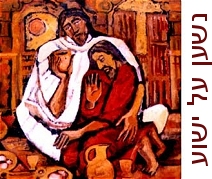
04.08.25 (Nisan 10 5785) Unlike some of the rituals and practices of organized religion, the Passover Seder takes place at home, not in a sanctuary, and may be conducted by anyone, not by professional clergy or a rabbi...
The heart of the seder is shared meal (shelamim) celebrating our connection with family, our friends, the "called out" people of God who take refuge in his promises. Such intimacy is altogether fitting, since the Passover was foreshadowed first by the sacrifice of the lamb when the Lord covered the transgression of Adam and Eve in the garden, and who then promised the coming Savior who would ransom humanity from the curse of death (Gen. 3:14-21). Adam's faithful son Abel later re-affirmed God's promise by offering of the fat of the lamb (Gen. 4:3-5). The promised blessing was later re-enacted by faithful Abraham's sacrifice of the ram in place of his son Isaac (Gen. 22), and of course the faithful of Israel affirmed the promise when they sheltered under the blood of Passover lamb at the time of the Exodus (Exod. 12:5-14).
In each case the blood of the lamb is central: covering the shame of Adam and Eve's transgression; expressing faith in the coming Savior who would deliver us from the curse of the nachash (serpent), exemplifying the heart of God's compassion by substituting the lamb for Isaac, and redeeming the families of Israel during the Passover. Most of all, however, the Passover Seder foretells and recalls the sacrifice of Yeshua on our behalf as the great Lamb of God who eternally delivers us from our slavery to sin. Therefore heed the Torah's general rule about the holidays: "You shall rejoice in your festival" (Deut. 16:14) by delighting in the salvation of God, by embracing our family and friends in the sure hope of eternal life. Amen.
Hebrew Lesson
Psalm 33:22 reading (click):
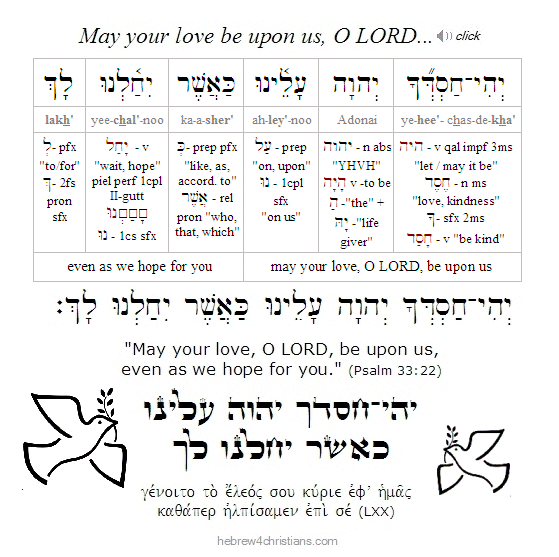 |
For such a time as this...
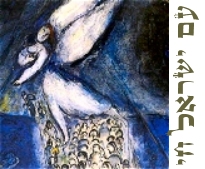
04.07.25 (Nisan 9 5785) An old midrash says that at the time of the great Exodus, only a remnant of Israel was actually saved while all the others died in the makkah (plague) of darkness, having fallen so low that they could not believe in the redemption or even want to be redeemed (Rom. 9:27-28)... How dreadful; how tragic! God forbid that we should give up our hope now, chaverim, especially because of the great salvation Yeshua secured for us at the cross (Heb. 2:3-4; Heb. 6:4-6). בכל דור ודור -- be'chol dor vador -- "in each and every generation" an individual should look upon him or herself as if he or she (personally) had been rescued from the "Egypt" of this world...
And yet divine history is somewhat "cyclical" in its expression. The closer we go back to the beginning, the more we see how the future was "seeded" and gets replayed in every generation. Both the Tree of Life (עֵץ הַחַיִּים) and the Tree of the Knowledge of Good and Evil (עֵץ הַדַּעַת טוֹב וָרָע) were present in the original paradise (Gen. 2:9). When Eve listened to the lies of the nachash (serpent) and regarded the forbidden tree as "desirable to make one wise," she immediately began her descent into exile. At the very dawn of human history, then, we see that "truth" (אֱמֶת) apart from God (א) leads to death (מֵת).
Adam and Eve's disobedience led to God's gracious promise regarding the coming "Seed" who would restore all things by being victorious in the war for truth (Gen. 3:15). Of course, this promised Seed was Yeshua, our Suffering Servant and "Second Adam," who, through His sacrifice upon the cross, "reversed the curse" and reconciled humanity with God. Note, however, that this "proto-gospel" message also implied perpetual warfare between the heirs of the Messiah (called the "children of light") and the heirs of Satan (called the "children of darkness"). The ongoing enmity between these "two seeds," then, was ultimately something God willed (1 Thess. 5:5; Col. 1:13; 1 John 3:10). The children of light are called to be am kadosh - a holy people - separate from the evil engendered by the fallen world and its forces, just as the very first creative expression of God was the separation of light from darkness (Gen. 1:3-4). The children of light "hate evil and love the good," and conversely, the children of darkness "hate the good and love evil" (Psalm 34:21, Prov. 8:13, Amos 5:15). The Exodus story, then, is not so much a matter of ancient history as it is a present revelation of God's righteous liberating power over the powers of darkness.
God delivered Israel with a "strong hand" (בְיָד חֲזָקָה) and led them directly to Mount Sinai to re-encounter the Tree of the Knowledge of good and evil, just as the Cross of Yeshua is the Tree of Life in the midst of the Garden of God. Life is about spiritual warfare, and the power encounter between God and Pharaoh is a paradigm for the ages. Therefore Yeshua refered to his own sacrificial death as the great Lamb of God to be the final exodus (Luke 9:31).
Throughout history we see the repeated attempt to resuscitate or revive ancient "Ra worship" (which derives from Satan in the garden). Every culture has its emissaries of evil -- its "pharaohs," its political dynasties, its caste systems, and its presumed sense of status quo. In the ancient world, most political figures were literally deified; in the Middle Ages, they were thought to rule through "divine right"; but in today's secular world, there is no justification given for their control other than through deception and the naked "will to power." In nearly every case, however, it can be stated that politicians and leaders of this world represent what is most sick about the human condition. Politicians and princlings are given "their hour" in this earth, and they are undoubtedly groomed by the "god of this world" who was a murderer and a liar "from the beginning" (John 8:44). The dust and ashes of countless past civilizations and regimes attest to this truth...
Today we are living in a world that is "globalist" by design. Politicians are often unwitting lackeys for the darker powers seeking to consolidate power to enslave the whole earth. The so-called global economy and its system of usury is the mechanism that will give rise of yet another "Pharaoh" who likewise will be judged by the LORD God Almighty at the End of Days.
Many people live in a state of fear because they believe the lies and propaganda of "the lords of the darkness of this world" / τοὺς κοσμοκράτορας τοῦ σκότους τούτου (Eph. 6:12). Satan's power always has been through the use of deception. If he can get you to believe a lie, he will begin to control you through fear. This is how the devil has always gained the kingdoms of this world -- through deception and violence... As followers of Yeshua, we must always keep in mind that reality centers on the LORD God of Israel and never in the "rhetorical violence" and metaphysical fantasies of political or media figures.
The LORD God of Israel truly cares about people's liberation from deception and oppression. The story of the Exodus is His everlasting rebuke to all the world's dictators and should cause every politician to soberly assess their fate... The time is coming when His judgment will fall upon all the "kings of the earth who take counsel against the LORD and against His Anointed One" (Psalm 2:2). Halevai, ad ana Adonai?
Presently we are living with the tension of the "already-not-yet" aspect of the original prophecy that "he (the Messiah) will crush the head (of the serpent)." Satan still appears to have the upper hand, at least in the temporal realm. Final victory is not yet here, even if it is assured through the promises of God (Rom. 16:20). And while the time appointed by God for the Messianic redemption of Israel and the "End of Days" is a heavenly kept secret (Mark 13:32), there are certain signs called chevlei mashiach (חֶבְלֵי מָשִׁיחַ) - the "birth pangs" of the Messiah - that indicate that the time is imminent when this world (κόσμος) will be judged.
Most of these birth pangs indicate peril and danger, including "distress of nations in perplexity because of the roaring of the sea and the waves," and "men's hearts failing them for fear, with foreboding of what is coming on the earth" (Luke 21:25-6). In addition, the moral depravity of mankind will be unmasked, showing us clearly that "men shall be lovers of their own selves, covetous, boasters, proud, blasphemers, disobedient to parents, unthankful, unholy, without natural affection, trucebreakers, false accusers, incontinent, fierce, despisers of those that are good, traitors, heady, highminded, lovers of pleasures more than lovers of God; having a form of godliness, but denying the power thereof" (2 Tim. 3:2-3). The increase in "globalism" and the unholy urge to unify the world into a new type of "Babylon" will give the Messiah of Evil his coming political platform in the days ahead. So-called "political correctness," that is, social coercion based on godless consensus, is the perverse ethos of our time.
We must hold to the truth that "all things work together for good to them that love God" (Rom. 8:28), and we must also take hold of the command given to Joshua: "Be strong and of good courage!" Just as Joshua was promised that the LORD would be with him as he went in to possess the land, so we must remember that the LORD has promised never to leave us nor forsake us (Heb. 13:5; Matt. 28:20) - even in the midst of tribulation, or distress, or persecution, or famine, or nakedness, or danger, or sword (Rom. 8:35).
We do not need to live in fear, because melo khol ha'aretz kevodo: מְלא כָל־הָאָרֶץ כְּבוֹדו, "the whole earth is filled with God's glory (Isa. 6:3). Amen: "In God have I put my trust: I will not be afraid: What man can do unto me?" (Psalm 56:1). Passover is all about the victory of God over the powers of darkness for the sake of our deliverance (i.e., yeshuah: יְשׁוּעָה). The echo of Moses' cry, "Let my people go!" is still resounding in the heavenly realms. So be encouraged, chaverim, even in the face of evil. Do not be afraid and do not be dismayed, "for the LORD your God is with you wherever you go." Amen!
Hebrew Lesson
Joshua 1:9 reading (click for audio):
Affirming the Light...
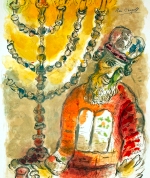
"O house of Jacob, come and let us walk In the light of the LORD" - Isaiah 2:5
04.07.25 (Nisan 9 5785) From our Torah for this week (i.e., Tzav) we read: "The fire on the altar shall be kept burning on it; it shall not be extinguished" (Lev. 6:12). The sages say do not read "burning on it" but rather "burning in him" (בּוֹ), referring to the heart of the worshiper And where the text says "it (i.e., the fire) shall not be extinguished" (לא תכבה), read instead "extinguish (תִכְבֶּה) the negative (לא)" by trusting in God's promise for our good, despite any temporary setbacks or apparent failures...
The Holy Spirit imparts the fire of faith that fills our hearts with hope, affirming with "tongues of fire" words of life and light that vanquish darkness. As it is written: "Light dawns in the darkness for the upright; He is gracious, full of compassion, and righteous" (Psalm 112:4).
זָרַח בַּחשֶׁךְ אוֹר לַיְשָׁרִים
חַנּוּן וְרַחוּם וְצַדִּיק
zah·rach · ba·choh'·shekh · ohr · lai·shah·reem
cha·noon · ve·ra·choom · ve·tza·deek

"Light dawns in the darkness for the upright;
He is gracious, full of compassion, and righteous."
(Psalm 112:4)
Download Study Card

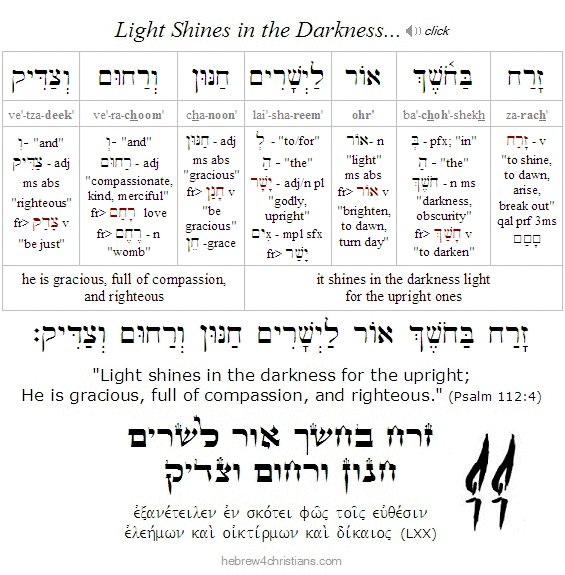
Spiritually speaking, the first step is to find hope... The Divine Light is seen by means of the eye of faith (עין האמונה), and therefore we find strength by trusting in God's Presence, even though we cannot presently see Him (2 Cor. 4:18; 5:7). "Trust in the LORD with all your heart, and do not lean on your own understanding. Know Him in all your ways, and He will straighten your paths. Be not wise in your own eyes; fear the LORD, and turn away from evil" (Prov. 3:5-7). Wait on the LORD and He will strengthen your heart....
We must keep courage, remain steady as we fight the good fight of faith. As it is written, "The LORD is my light and my salvation; whom shall I fear? The LORD is the stronghold of my life; of whom shall I be afraid? When evil men attack me to devour my flesh, when my adversaries and enemies attack me, they totter and fall. Even if an army is deployed against me, I do not fear; even if war is rises against me, I remain full of trust" (Psalm 27:1-3).
The Midrash says, "The Holy One Himself, as it were, made light for the upright. Thus it says, "The LORD is my light and my salvation" (Psalm 27:1) and "When I sit in darkness, the LORD will be a light to me" (Micah 7:8). While I sit in darkness in this world, during these latter days before the promised return of Yeshua, when troubles may afflict me and lawlessness may abound – then God's light will shine brighter still, for the LORD is gracious to all who put their hope in Him, and this favor and love will be manifest for me.
Let us affirm our confidence: The darkness of this world forever is swept back before the overmastering radiance and power of Yeshua, the King of Glory, the Root and Descendant of David, and the Bright Morning Star (Rev. 22:16). Those who believe in Him are given the "light of life" that overcomes the darkness of this world (John 8:12).
 |
The Sabbath before Passover...
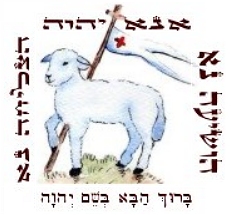
04.06.25 (Nisan 8 5785) The Sabbath that immediately precedes the holiday of Passover is called the "Great Sabbath" (i.e., Shabbat HaGadol: שבת הגדול), in honor of the time when the Israelites set aside the lamb for the Passover Sacrifice (i.e., korban Pesach: קרבן פסח).
During the time of the Temple it was customary to obtain the Korban Pesach (i.e., Passover lamb) four days before Passover so that worshipers could make sure that their lambs had no blemishes which would preclude them from being offered as sacrifices. This was done to fulfill the instructions given in Exodus 12 that the lamb for Passover be "without spot or blemish." Interestingly, this period of time allowed time for each family to become personally attached to their lamb, so that it would no longer simply be "a lamb" (Exod. 12:3) but rather their lamb" (Exod. 12:5). Indeed the Torah refers to "the" Lamb of God, as if there was only one: "You shall keep it [i.e., the Passover lamb] until the fourteenth day of this month, when the whole assembly of the congregation of Israel shall slaughter him (אתוֹ) at twilight (Exod. 12:6). Note that the direct object "him" (i.e., oto) can be read as Aleph-Tav (את) combined with the letter Vav (ו), signifying the Son of Man who is First and Last.
![Spring Holiday Timeline (H4C]](../../About_HFC/Site_News/shabbathagaolline.gif) |
Shabbat HaGadol foreshadowed the offering of Yeshua as the "Lamb of God" who takes away the sins of the world. The New Testament notes that it was a few days before Passover when Yeshua made His triumphant entry into Jerusalem riding on a donkey, signifying His Messiahship, in fulfillment of the prophecy of Zechariah: "Rejoice greatly, O daughter of Zion! Shout aloud, O daughter of Jerusalem! Behold, your king is coming to you; righteous and having salvation is he, humble and mounted on a donkey, on a colt, the foal of a donkey" (Zech. 9:9). During this time, when the pilgrims had come to select the lamb for the Passover sacrifice - they saw Yeshua and cried out: hoshiah na (הושׁיעה נא), meaning "please save" or "save now" (in English this phrase was translated from the Latin to form "Hosanna!"). The people spontaneously began singing Psalm 118:25-26 in anticipation of the fulfillment of the great Messianic hope.
Hebrew Lesson
Psalm 118:25-26 Reading (click for audio):
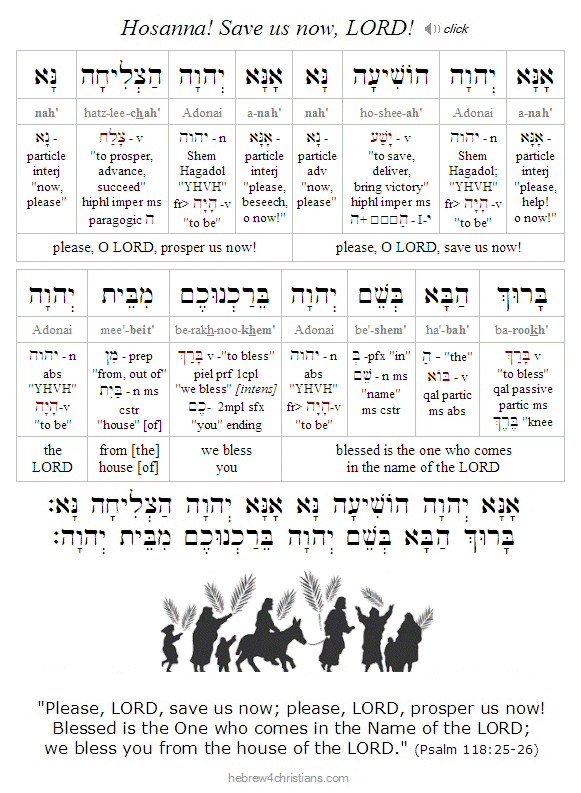 |
The Haftarah for Shabbat HaGadol (Malachi 3:4-24) foretells of Yom Adonai (יוֹם יהוה), the great Day of the LORD, and the return of Yeshua as Mashiach ben David. May that day come soon, chaverim. For more information, click here.
Ordained by the Lamb:
Parashat Tzav - פרשת צו
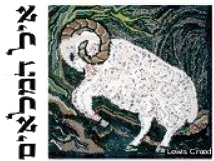
Every year we read Parashat Tzav before the holiday of Passover...
04.06.25 (Nisan 8 5785) Our Torah reading for the Sabbath just before Passover (i.e., Shabbat HaGadol) is called "parashat Tzav," where we learn that the first priests of Israel were ordained for their service by the blood of the lamb. First Aaron and his sons were washed with water, arrayed in priestly garments, and anointed with holy oil. During this ordination ceremony, a sin offering and burnt offering were offered on their behalf, and then a special "ram of ordination" (i.e., eil ha-milu'im: איל המלאים, lit. "ram of abundance [מָלֵא]") was slaughtered. Some of this ram's blood was applied to the right ear, right thumb, and big toe of the Aaron and his sons (a picture of Yeshua as our suffering High Priest), and the rest of the blood was dashed upon the sides of the altar. After its slaughter, Moses took some unleavened bread and put it in the hands of the priests to perform tenufah (a wave offering) before the altar (a picture of the resurrection).
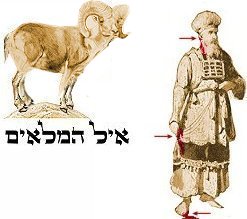 |
As followers of Yeshua, we too have been anointed with the blood from the "Ordained Lamb" -- Yeshua as our Kohen Gadol of the better covenant (Heb. 8:6). And we too have been anointed with the sacred shemen (oil) that symbolizes the presence and aroma of the LORD in our lives. As followers of Yeshua we are therefore truly "...a chosen race, a royal priesthood, a holy nation, a people for his own possession, that you may proclaim the excellencies of him who called you out of darkness into his marvelous light" (1 Peter 2:9). As Yeshua said: "You did not choose me, but I chose you and appointed you that you should go and bear fruit and that your fruit should abide, so that whatever you ask the Father in my name, he may give it to you" (John 15:16). May the God of Israel be pleased to help you serve Him in the truth...
Seeing Him who is Invisible...
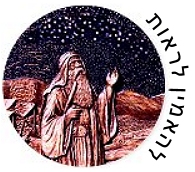
"We know that if God should put to the test our faithfulness to him, we know well that at the moment of testing, he himself must hold on to us, that is, we know that at bottom we are unfaithful, and that every instant it is he who at bottom holds us." - Kierkegaard
04.04.25 (Nisan 6 5785) "But you, when you pray, go into your room, and when you have shut your door, pray to your Father who is in the secret place; and your Father who sees in secret will reward you openly" (Matt. 6:6). Yeshua was not impressed with outward shows of spirituality or religion (Matt. 15:8). The rabbis called for public displays of repetitive prayers, but Yeshua taught that true prayer is a matter of intimate passion within the heart, and that the most powerful intercessions were made with ruach ha'koshesh - "groanings that cannot be uttered"(Rom. 8:26).
Instead of reciting prayers for the sake of ceremony or man's approval, he instructed us to pray "secretly" to our Father who "sees in secret" (ὁ βλέπων ἐν τῷ κρυπτῷ). Indeed, Yeshua taught that the LORD is "τῷ ἐν τῷ κρυπτῷ," the one who is in the "secret place," that is, hidden from outward forms, and that is why he himself came in disguise (Isa. 53:2). Since there is no merit in begging God for help, the Father rewards those who pray in their brokenness and poverty of heart, and his reward is revealed divine grace expressed openly - "ἐν τῷ φανερῷ" - unhidden to heart of faith (Deut. 29:29; Dan. 2:22). "He who dwells in the secret place of the Most High Shall abide under the shadow of the Almighty" (Psalm 91:1).
"By faith Moses forsook Egypt, not fearing the wrath of the king: for he endured, as seeing Him who is invisible" (Heb. 11:27). Ἐν τῷ κρυπτῷ - God both is, and sees, "in secret." He is in secret because he dwells in unapproachable light, whom no one has ever seen or can see" (1 Tim. 6:16), and yet he calls us to believe in the light, to walk in the light, and to be children of light (John 12:36; 1 John 1:7). We see the light in the teaching of Yeshua, by means of the Holy Spirit, though we see through a glass darkly, by analogy and riddle (1 Cor. 13:12). Some things are clear to us in this life, but much awaits to be revealed (1 John 3:2). "I have many more things to say to you, but you cannot bear them now" (John 16:12), though the Holy Spirit will give enough illumination for us to know the truth that sets our hearts free (John 16:13). "The secret of the LORD is for those who fear him, and he will show them his covenant" (Psalm 25:14).
But why does God hide this way? And why does he attend to that which is hidden or concealed (Heb. 4:13). The eye of faith sees the "invisible" things, the unseen blessing that lies behind the phenomenal realm of existence (Heb. 11:27). As Blaise Pascal said, "there is enough light for those who want to believe, and enough shadows to blind those who don't." In this present world, God "hides" so that people may seek him, for once he openly reveals his Presence, there is no longer the issue of faith (Rom. 8:24).
This is part of the "mysteries of the kingdom" (τὰ μυστήρια τῆς βασιλείας), after all (Matt. 13:10-15) which presents a "two-tiered" reality, the heavenly realm of God's Presence, and the earthly realm of transience. Upon reflection we may sometimes feel lonely and bewildered in this duality, not knowing how to "mediate" or bring together the opposite poles of our experience... On the one hand life in this present world is fading away, and finitude, dissolution, and the "dust of death" seem omnipresent to our physical senses, nevertheless our hearts yearn for eternity, for unending life, and God's presence and the manifestation of everlasting significance. We long for meaning, wonder, greatness, and the peace of unconditional love, yet we find ourselves trapped within a diseased and moribund world that is filled with thwarted dreams, painful losses, harrowing vexations, and death... We hunger and thirst for real life, for salvation from our misery, but the cosmological visions of mechanistic science reveal an immense emptiness that has no goal or end, no explanation for its existence, and therefore no meaning or real hope.
God hides so that we will seek him (Jer. 29:13). This seeking involves all our heart, since we will not seek God until we understand the inner crisis. It is not enough to know right words of theology, since we must learn to think the right way, and this comes at the cost of struggle, wrestling, and testing. We cannot rely on reason alone to guide us, for that relegates beauty, mystery, and hope into oblivion; nor can we dismiss reason, for then faith becomes absurd and ridiculous. We must find a delicate balance: "faith seeking understanding," knowing when it is right to question, to doubt, and to analyze, and when it is right to affirm, to submit, and to surrender. Reason is a servant of something more fundamental, namely the heart or the will; it is activated at the stir of the soul's desire.
Hebrew Lesson
Jer. 29:13 reading (click):
The dualism of life shows up within our hearts as well, as we wrestle with our own faith and with "double-mindedness," that is, the ambivalence that results from not having our minds made up. On the one hand, we need to confess the truth of our radical sinfulness, our depravity, our brokenness, and so on, while on the other we must learn to know ourselves as the "beloved" and to find faith that God's blessing indeed belongs to us -- that Yeshua gave his life for us -- despite ourselves. We have to be willing to take God's new name for us and believe that God has transformed our deepest nature for eternal good. We have to be renamed from "Jacob" to "Israel," and yet we know ourselves as both... In other words, we must learn to "put on" the new nature and to "put off" the carnal reasoning of our former life. The answer for us is found in the word "miracle," as God in great mercy and compassion regenerates us, comforts us, and then guides our way back to the truth of his salvation.
Hebrew Lesson
Psalm 25:14 reading (click):
The Torah of Passover...
The holiday of Passover (i.e., Pesach) begins Saturday, April 12th at sundown this year...
04.04.25 (Nisan 6 5785) All of the Biblical holidays (חגי תורה) begin with the primordial holiday of Passover (חג הפסח), which has its origins in the original sacrifice of the lamb and the promise of redemption given to Adam and Eve in garden of Eden...
The original sacrifice and promise was reenacted in the redemption of the Jewish people in Egypt. On the first of Nisan, two weeks before the great Exodus, God showed Moses the new moon and commenced the divine calendar. Two weeks later, the Israelites kept the Passover by daubing the blood of the lamb on their doorposts. At the stroke of midnight of Nisan 15 God sent the last of the ten plagues on the Egyptians, killing all their firstborn. Later that morning the people began their march to the promised land.
A week into the journey, the Egyptian army caught up with the Israelites as they were trapped before the sea, but God split the waters and the people passed through. When the Egyptian army pursued after them the following morning, they perished in the waters that closed in over them. The climactic event of crossing the sea is remembed as the summary of the Exodus, and Unleavened Bread is eaten during the seven days in honor of this time...
On the third new moon after leaving Egypt (i.e., the 1st day of the month of Sivan), the Israelites encamped opposite Mount Sinai, the place where Moses was initially commissioned. On the 6th of Sivan, exactly seven weeks after the Exodus (49 days), Moses first ascended Sinai to receive the tablets of the commandments and the vision of the altar (Shavuot). Forty days later, on the 17th of Tammuz, the people worshipped the golden calf and the tablets were shattered. Moses then interceded for Israel for another forty days until he was called back up to Sinai on Elul 1 and received the revelation of the Name (YHVH). After this, he descended with a second set tablets and returned to the camp on Tishri 10, which later was called Yom Kippur, or the "Day of Atonement." The holiday of Sukkot ("Tabernacles") was later instituted to commemorate God's care for the people as they trekked through the desert.
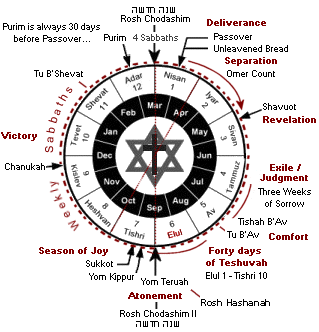 |
In addition to being commemorated every year during Passover (Exod. 12:24-27; Num. 9:2-3; Deut. 16:1), the Exodus from Egypt (סיפור יציאת מצרים) is explicitly mentioned in the very first of the Ten Commandments (Exod. 20:2), and it is recalled every Sabbath day (Deut. 5:12-15). The festivals of Shavuot ("Pentecost") and Sukkot ("Tabernacles") derive from it (the former recalling the giving of the Torah at Sinai and the latter recalling God's care as the Exodus generation journeyed from Egypt to the Promised Land). Indeed, nearly every commandment of the Torah (including the laws of the Mishkan (i.e., "Tabernacle") and the sacrificial system) is traced back to the story of the Exodus. Most importantly, the Exodus prefigures and exemplifies the work of redemption given through the sacrificial life of Yeshua the Messiah, the true King of the Jews and the true Lamb of God (שׂה האלהים). Indeed, the crucifixion of Yeshua and his resurrection from the dead is the "greater Exodus" given by the Messiah, the most fundamental event of all human history (Luke 9:31).
Notice something very important, friends. The very first occurrence of the word "Torah" (תורה) in the Scriptures refers to the obedient faith of Abraham (Gen. 26:5), and the second occurrence refers to the law of Passover: "There shall be one law (תורה אחת) for the native and for the stranger who sojourns among you" (Exod. 12:49). There is a link between these two occurrences. Abraham lived before the time of the Exodus, of course, and therefore he obeyed the law of Passover by means of the Akedah (the sacrifice of his "only begotten" son Isaac). Despite offering his son up upon the altar at Moriah, Abraham believed in the LORD and it was credited to him as tzedakah (righteousness). Abraham's obedience revealed that the inner meaning of Torah is that the "righteous shall live by faith" (Hab. 2:4, Rom. 1:17). The Torah of Passover (תורת הפסח) likewise teaches that redemption from death is possible through the exchange of an innocent sacrificial victim. The blood of the Passover was "a sign" of imputed righteousness that was obtained entirely by faith. This is the "korban" principle of "life-for-life" that underlies the Torah of the sacrificial system of the Tabernacle as well.
Ultimately all Torah points to Yeshua, who is the divinely appointed Redeemer and the beginning and goal of all of creation... "When the fullness of time (τὸ πλήρωμα τοῦ χρόνου) had come, God sent forth his Son, born of woman, born under the Torah, to redeem those under the Torah, so that we might receive adoption as sons" (Gal. 4:4-5).
Hebrew Lesson
Numbers 9:2 Hebrew reading:
Related Topics for Passover:
Teshuvah and Despair...
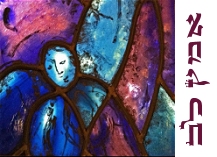
04.04.25 (Nisan 6 5785) There are moments – dark, gnawing, raw – when you may lose sight of hope, when you might even fear that you have lost your faith – not in God or his promises – but rather in yourself, in your own strength to continue, to stay focused, to keep pressing on "hope against hope..." The remedy here is always the same: to remember that within you – that is, in your flesh - "there is no good thing" and that the miracle of salvation is made secure by God's passion for you, not your own power or desire. "Not by might, nor by power, but by my Spirit, saith the LORD of Hosts" (Zech. 4:6).
We don't trust in ourselves nor in the strength of our inner resolve, but solely in the power of God to make the way and who gives life from the dead (John 1:13; 2 Cor. 3:5). We must turn away from ourselves to regain the message of God's unfailing love; only when we lose sight of ourselves do we find ourselves. God redeems you from your lost estate and touches you in your uncleanness; He clothes himself in your pain so that you may be clothed in his love. That never changes, despite dark moments, and to that we must always return...
Hebrew Lesson
Zechariah 3:6 reading (click):
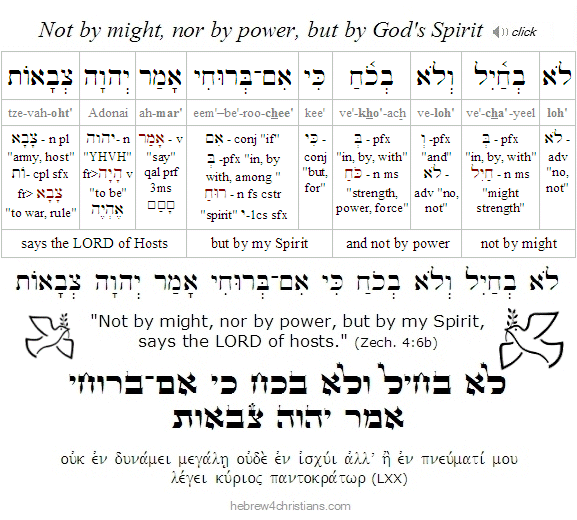 |
Where it says, "I can do all things through Messiah who strengthens me" (Phil 4:13), that includes being healed of the inner pain of your life: your failures, your shame, the ache of rejection, abandonment, and so on. It means being set free from disillusionment, despair, and the oppression of relentless fear. "I can do all things through Messiah" means no longer accepting messages of self-hatred and hopelessness, no longer heeding the malicious whispers that say: "I am of no value," "I am unlovable," "my life is hopeless." No, "I can do all things through Messiah" means learning to be accepted, honored, and esteemed by God; it means opening your heart to God's love and blessing for your life; it means allowing your heart to be made right, to have inner peace... After all, Yeshua's great prayer was that we would know the truth of God's love for us (John 17), and this is the central need our lives. Amen, and may we walk in that love today...
Sacrifice and Holiness...

04.03.25 (Nisan 5 5785) The book of Vayikra (i.e., Leviticus) presents two "overarching" themes. The first concerns the system of sacrifices (i.e., korbanot: קָרְבָּנוֹת) that were to be arranged in the Mishkan (and later, at the Temple). These include the daily sacrifice of the lamb (קָרְבַּן תָּמִיד), sacrifices for guilt and sin, thanksgiving offerings, and so on. The culmination of the sacrificial system, however, was expressed by the elaborate Yom Kippur service that was performed to obtain "kapparah" (כַּפָּרָה), or atonement for the people.
The second overarching theme of the book of Vayikra concerns matters of personal holiness (i.e., kedushah: קְּדוּשָׁה), including laws regarding what is "clean" (i.e., tahor: טָהוֹר) and "unclean" (i.e., tamei: טָמֵא) in matters of diet, sexual relations, personal health, and so on. In addition, holiness is connected with social relationships, such as the duty to honor parents, to give tzedakah (charity) to the needy, and to refrain from doing any harm to others. Indeed, the Ten Commandments are restated in Vayikra beginning with the words "You shall be holy, for I the LORD your God am holy" (Lev. 19:1-2). Note, incidentally, that the order of the commandments appears differently in Leviticus 19 than what is written in Exodus chapter 20 (and also in Deuteronomy chapter 5), and that additional commandments are listed there as well.
These two major themes - sacrifice and holiness - are connected, though perhaps not in the way you might immediately think. Many people suppose the sacrifices were given as a ritual means of obtaining pardon for sin, but this is an oversimplification. The Hebrew prophets did not add or subtract from the laws given at Sinai, though they sometimes criticized the people for offering sacrifices without the desire to obey God's law. The sacrifices themselves were not the problem, but they were ineffectual apart from genuine teshuvah (see 1 Sam. 15:22-31; Hos. 6:6; Matt. 12:7; Prov. 21:3; Isa. 1:11. Micah 6:6, Jer. 7:22).
The point here is that offering sacrifice apart from a heart of obedience is meaningless mummery and ostentation, since the moral law of God was given first to the people and only afterward were the sacrifices described to Moses in the vision of the altar at Sinai. But it is obedience to God that imparts virtue to sacrifice, as the cross of Yeshua exemplifies.
The idea of sacrifice predates the giving of the law given at Sinai, of course, and goes back to the primordial Garden of Eden itself where God offered up the lamb for Adam and Eve's transgression (Gen. 3:21). This set the pattern, and later Adam brought sacrifice, as did Cain, Abel, Noah, Shem, Abraham, Isaac, Jacob, and Moses.
We can learn from the account of Cain and Abel about righteous sacrifice. First note that Abel presented to God a sacrificed lamb - recalling the original sacrifice of God and the promise of the redemption to come given to Adam and Eve (Gen. 3:14-15) - whereas Cain offered fruits of the earth. Their respective sacrifices present a study in contrasts, as God "turned to Abel and his offering" but he did not so regard Cain's offering. In a sense Abel (הֶבֶל), whose name comes from "vanity" or "vapor" (הָבַל) "re-presented" God's offering of the lamb that covered the sin of his parents, having faith in the promise of the Redeemer who was to come, whereas Cain (קַיִן) whose name means "to get" or to "take" (קָנָה), simply returned the gift of the fruits of the garden. Now there is of course nothing wrong with offering "first fruits" to God as minchah (מִנְחָה), or a gift, but God was looking for Cain to have faith in his promise. When God saw that Cain felt dejected, He rhetorically asked: "If you do well, will you not be accepted?" which indicates that being accepted is a matter of earnest faith in God, for that is what "doing well" truly means in the eyes of heaven. The Lord's words to Cain teach us that the basis for offering sacrifice to God is to express faith in his healing love and salvation...
This principle is essential to all true Torah: Those who trust in God's promises find divine blessing, as the LORD said to aged Abraham when he gazed upon the canopy of stars and believed the "impossible" promise that he would become the father of a multitude of people. Yet Abraham trusted God for the miracle: "And he (Abraham) believed in the LORD; and he (the LORD) counted it to him for righteousness" (Gen. 15:6). Abraham believed in God's righteousness -- his blessing, power, and lovingkindness -- that would fulfill the vision, certainly not in his own merit or strength.... This is the very first commandment, after all, namely to believe in the Lord as your Savior, Healer, Blessing, Life, Destiny, and so on. "I AM the LORD your God" (אָנֹכִי יְהוָה אֱלֹהֶיךָ) is the first word of faith (Exod. 20:2).
We have to be careful about what we think makes us right with God. Do we trust in ourselves or in God for our righteousness? Abel saw the vanity of human effort to attain righteousness, whereas Cain sought to acquire it through his own effort. The Holy Temple was destroyed because false religion offered sacrifices as a way to excuse their sin and consequently to disregard the call to turn to God and live a life of holiness. Walking by faith means understanding the sanctity of life itself, to accept that we are called by God to be set apart to know Him in all our ways (Prov. 3:5-6). Offering a sacrifice as "payment" for sin misses the point. True holiness means being "separated" from the profane to know and love God, but too often religion can serve as a false god that promotes sin by promising forgiveness apart from the need to walk in the obedience of faith. Therefore God said through the prophet Hosea: "I desire goodness and not sacrifice" (Hos. 6:6). "Sacrifice" from a faithless person is an abomination to God (Isa. 1:11; Amos 5:21; Prov. 15:8).
The two great themes of sacrifice and holiness are therefore connected by faith in God's promises, and there can be no true sacrifice apart from heartfelt faith. Indeed, this is the ultimate purpose of the sacrifices - to honor God's heart and redeeming love given in Yeshua, the great Lamb of God (John 1:29; 1 Cor. 5:7). The blood of "bulls and goats" could never take away sin, but the sacrifice of God given of his own love for us does, and that is the message of the cross (Heb. 10:4-10). The sacrificial system with the daily offering of the lamb foreshadowed the Substance of the promise fulfilled in Yeshua. It is not our sacrifice that is the focus, but God's sacrifice of Christ given on our behalf, and our only response to this exceedingly precious gift is to offer thanks for God's kindness and mercy. "It is the kindness of God that leads you to repentance" (Rom. 2:4). As it written, "Through Him (i.e., the sacrifice of Yeshua) let us then continually offer up the sacrifice of praise to God, that is, the fruit of lips that confess the truth of his Name" (Heb. 13:15). Amen.
Hebrew Lesson
Psalm 9:10 Hebrew reading (click):
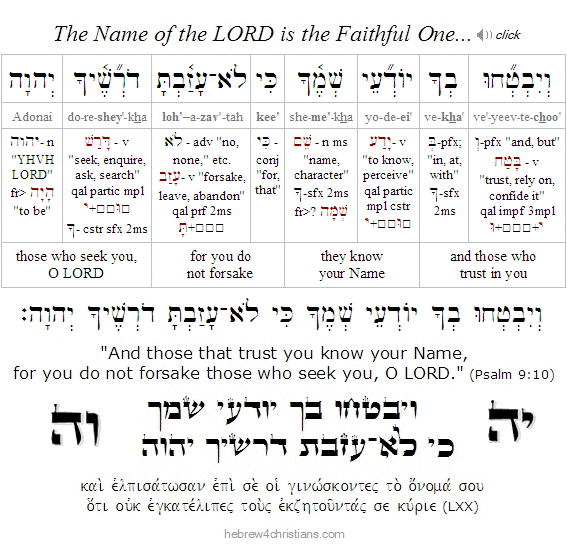 |
Your Life is from God...

"God abides for ever in an eternal present, His knowledge, also transcending all movement of time, dwells in the simplicity of its own changeless present." - Boethius
04.02.25 (Nisan 4 5785) The name of the Lord is YHVH (יהוה), which comes from a root word meaning existence (i.e., hayah: היה, to be). It is this name that gives existence to creation, as it says, "in him all things hold together" (τὰ πάντα ἐν αὐτῷ συνέστηκεν; Col. 1:17) and by his power "all things are carried" (φέρων τε τὰ πάντα; Heb. 1:3). Relative to our consciousness, the name is also connected with time: God is LORD hoveh (הוה), hayah (היה), and yihyeh (יהיה); He is the one who is, and who was, and who will forever be, the LORD over all possible worlds, and therefore He is rightly called the faithful God (יהוה הנאמן), since his promise and his will infallibly sustains all states of being. This implies that there never was nor ever shall be a moment of your life that was not given to you from God.
God is the LORD over the "eternal present" and therefore he is Yah hoveh (יָה הֹוֶה). In God we "live and move and have our being" (Acts 17:28) and "from him and through him and to him are all things" (Rom. 11:36). Some people think of "eternal life" as unending life or immortality of the soul, but eternal life (i.e., chayei olam: חַיֵּי עוֹלָם) transcends the idea of time and is centered in relation to the Living God, right now, wherever we are... Therefore Yeshua says to his followers, "Live in me and I will live in you" (John 15:4). We need not fear death, then, because we partake in the overcoming life of God given in Yeshua: there is no ultimate separation from his love. We have the "now" covenant with our Lord forever!
When we live in Messiah our true life is "concealed" and we pass over from the temporal world of shadows to the world of reality, from fear to comfort, from darkness to light. We "lose our life in order to find it" (Luke 17:33). The walk of faith surrenders all that this life may promise for the sake of finding true life in God.
Hebrew Lesson:
Psalm 139:5 Hebrew reading (click):
Teshuvah of the Soul...
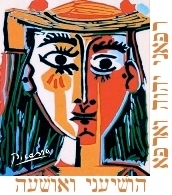
04.01.25 (Nisan 3 5785) "Those who are well have no need of a physician, but those who are sick. I have not come to call the righteous but sinners to repentance" (Luke 5:31-32). Every one of us has a "dark side" or a "shadow self" that has destructive and selfish urges. We try to conceal this truth from others (and even ourselves) but such denial doesn't change the reality within our hearts (Matt. 5:19; Jer. 17:9; Eccl. 9:3). Indeed, when we pretend to be something we are not we are more likely to be overwhelmed by dark forces hidden within us. We are most vulnerable when we think we are well, that is, when we deny our sickness our heart and minimize our need for deliverance.
Self-deception is so dangerous because it engenders double-mindedness (δίψυχος). Paradoxically if we hide the truth about the sin that "so easily besets us" and pretend that we are essentially good, we sin, as it is written: "If we say that we have no sin we deceive ourselves (ἑαυτοὺς πλανῶμεν) and the truth is not in us" (1 John 1:8). God knows that a "divided house cannot stand."
We are delivered from chaotic inner conflict when we confess the truth. "Confess your faults one to another and you shall be healed" (James 5:16). Confession allows us to acknowledge the dark passions that sometimes overmaster our best intentions. We must give ourselves permission to allow the hurt, angry, and fearful voices to be heard and sanctioned within us - and then to bring these dark and hidden aspects of our selves before God for healing. The failure to do so will split the soul and cause the hidden aspects of the self to seek "revenge" upon the "public self" that censors their message. The struggle within our hearts is real and we should attend to it seriously. Denying evil by pretending that we are okay, or by blaming others, blinds us to the truth of our ongoing need for deliverance. May God help each of us to be honest with ourselves and to confess our great need before our Heavenly Father.
But why do we have such difficulty being genuinely honest with ourselves? Are we trying to justify ourselves apart from God? Despite the fact that we may profess that we are "sinners saved by grace," we often make excuses for our failures, rationalizing that we are not "that bad," and therefore we postpone genuine teshuvah (repentance) and trifle with our spiritual lives. We do this because we feel an almost irresistible desire or "need" to excuse ourselves, to "save face" by pretending that we are not "incurably sick," or by attempting to find something about us that makes feel valuable and worthy. As H.L. Mencken once wittingly noted, "the 'truth' that survives is simply the lie that is pleasantest to believe."
The LORD wants us to be truthful (אֲמִתִי) in the "inward being" (Psalm 51:6), though that truth will cost us something, namely the facade and worldly artifice we impose through our self-deception... Opening our hearts to divine examination (בחינה אלוהית) eventually means colliding with the world of men and their conspiracies, since the godly man no longer abides their presence (Psalm 1:1-2). The Apostle Paul said that there is an exclusive disjunction between seeking the approval of men and of the approval of God: "Do I seek to please men? for if I yet pleased men, I should not be the servant of the Messiah (Gal. 1:10). Likewise we are told not to deceive ourselves (lit., "reason around" the truth, from παραλογίζομαι, from παρά, "around, beside" and λογίζομαι, "to reason") by merely hearing the truth of Scripture and not living it (James 1:22). God is not interested in "lip service" any more than he desires heartless sacrifice (Isa. 29:13; Hos. 6:6; Matt. 15:9). "Let your love be genuine (ἀνυπόκριτος, without a "mask" put on), abhor what is evil; cling to what is good (Rom. 12:9). God abhors those who pretend to know Him but who are really spiritual impostors (Matt. 7:21-23; 25:11-12; Luke 6:46).
Tragically (and paradoxically) many people can talk themselves into believing something without truly believing it, and that is perhaps the most dangerous thing of all (Matt. 7:22-23). On the other hand, some people can talk themselves into believing (or accepting) something that they know is untrue (or morally wrong), and that self-deception leads to inner fragmentation, chaos, self-delusion, and to the dissolution of the soul. A "double-minded man is unstable in all his ways" (James 1:8). As I have said before, the word translated "double-minded" is dipsuchos (δίψυχος), a word formed from δίς, "twice" and ψυχή, "soul." The word describes the spiritual condition of having "two souls" that both want different things at once -- a state of inner contradiction and ambivalence.
The Hebrew word "shalom" (שלום) means to be made whole or complete. We are to love God with "all our heart," and that means both the "good heart" and the "bad heart" as well. The temptation to sin often feeds upon hidden disappointment, anger, fear, and so on. "Mortifying" the lower nature comes by accepting the truth that God is doing a miracle in you, despite the brokenness and sin that is part of your life.
One day our salvation will be complete and we will forever be healed and filled with God's shalom. Until then we will wrestle with our faith as we trust God to transform and deliver our souls, even healing the evil within us for the praise of his Name!
Hebrew Lesson
Psalm 51:6 reading (click):
Postscript:
Dear friends, left to our own devices, we can't deal with the evil influences of this fallen world nor handle the raging impulses and fears that sometimes arise within our own sinful hearts. But take His heart and believe! Confess your need for God to fight for you, to shine his light in your darkness. Yeshua has conquered sin and death on the cross and now intercedes for you; therefore call upon his name for life - even if you need to scream out and cry! The LORD has promised to never leave nor forsake those who sincerely seek him...
Healing and Praise...
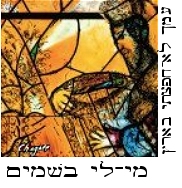
04.01.25 (Nisan 3 5785) It is good to praise the LORD despite our afflictions, since indeed, suffering itself presents an invitation to come before God in prayer (James 5:13). Suffering offers us a nisayon (נִסָּיוֹן), a test, for our hearts to be exercised in ways otherwise rendered impossible should the path of our lives be attended without real struggle...
"We rejoice in our sufferings, knowing that suffering produces endurance, and endurance produces character, and character produces hope" (Rom. 5:3-4). In other words, God allows suffering in our lives to refine us so that we trust in his salvation. "We are saved by hope," and this hope, given in God's love and empowered by the Holy Spirit, will not disappoint us or lead us to shame, but rather to the sure fulfillment of God's promises. Hope does not flail in impatience but leads to life: "Behold, I lay in Zion a stumbling stone and rock of offense, And whoever believes on Him will not be put to shame" (i.e., at peace: הַמַּאֲמִין לֹא יָחִישׁ).
In this connection I am reminded of a quote from Sadhu Sundar Singh, "Should pain and suffering, sorrow, and grief, rise up like clouds and overshadow for a time the Sun of Righteousness and hide Him from your view, do not be dismayed, for in the end this cloud of woe will descend in showers of blessing on your head, and the Sun of Righteousness rise upon you to set no more for ever" (Wisdom of the Sadhu).
It's been said that both the devil and God want your soul, but their approaches are diametrically opposite to one another.... God offers you a bitter cup that, after it has been duly tasted, will be turned sweet, whereas the devil offers you an artificially sweetened cup that, after it has been duly tasted, will be found bitter to the last of its dregs... When you accept your suffering as ordained by God - by the LORD of Glory who could easily deliver you from all trace of its presence in but the twinkling of an eye – your heartache is sanctified, and your praise becomes more dear to Him. Only the wise and loving LORD knows how bitter waters may be made sweet; only the great Refiner of our souls knows how to bring eternal beauty up from ashes... So heal me, O LORD (even if that means suffering and pain for my life), and I shall be healed; save me, O LORD (do whatever it takes to bring me to the end of myself), and I shall be saved – for you are my praise.
If you are afflicted, troubled, or in any kind of pain, you have a great opportunity to glorify your Father in Heaven by offering Him your praise.... Praising God is the appropriate response to all of reality; the affirmation of God's glory transforms everything. "Is anyone among you feeling bad? Let him pray. Is anyone feeling good? Let him sing praise" (James 5:13). Remember that regardless of how you presently feel, your emotional life is centered in the Presence of God... As George Mueller once affirmed, "Be assured – if you walk with Him and look to Him, and expect help from Him, He will never fail you."
Hebrew Lesson
Jer. 17:14 reading (click):
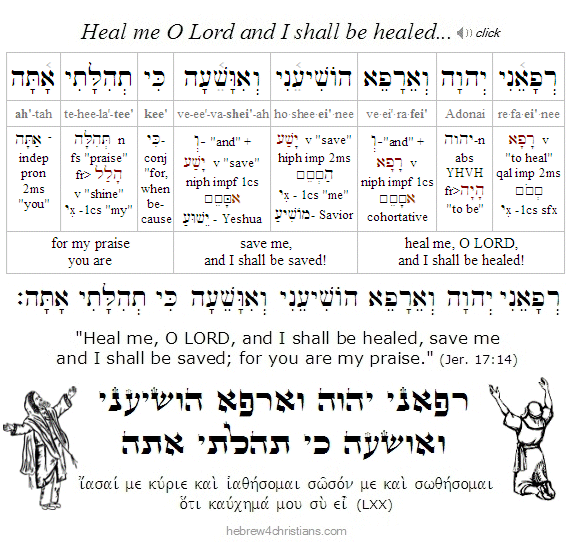 |
Torah of Sacrifices...
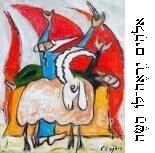
04.01.25 (Nisan 3 5785) Our Torah reading for this week (i.e., parashat Vayikra) begins with the Lord calling out (קָרָא) to Moses to explain the "laws of korbanot" (תורה של קרבנות), or the way the people could pleasingly draw near to him. Note that the root of the word korbanot, often translated as "offerings" or "sacrifices," is karov (קרוב) which means to come close, to enter into, or to approach. The korbanot, or sacrifices, were meant to bring us closer to God, and the central sacrifice at the altar was that of a defect-free male lamb offered daily, called korban tamid (קָרְבַּן תָּמִיד), or the "perpetual sacrifice." Unlike other sacrifices that may be offered at the altar, the korban tamid was continually offered by God Himself in commemoration of the great Passover redemption wherein the blood of the lamb was offered on behalf of Israel. Like the cross of Messiah our Passover (משיח פסח שלנו), God provides the Lamb and by this grace He enables access to the divine presence for blessing and eternal life...
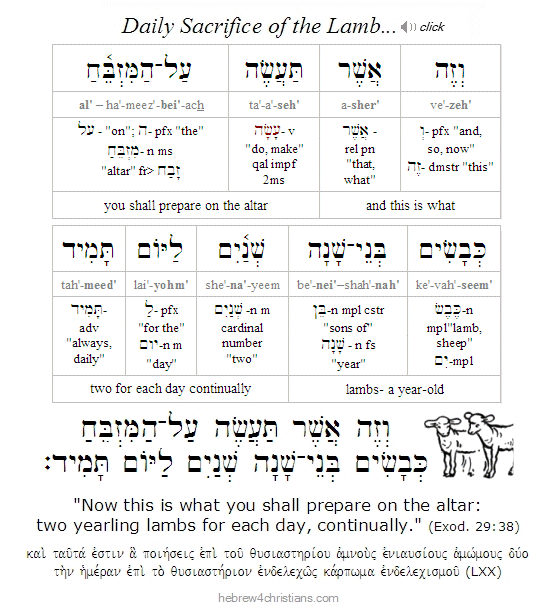 |
Other sacrifices, such as the "chatat" (חטאת) or sin offering, required the offerer to place his hands on the head of the animal, leaning on it will all his might, as he confesses his wrongdoing and expresses his desire to return to God. This procedure is called "semichah" (סמיכה) and the confession is called "vidui" (וִדוּי). Immediately following this the animal is led away to be ritually slaughtered (i.e., shechittah: שחיטה) and the blood was caught in a basin and then dashed upon the altar by the designated kohen (כּוֹהֵן), or priest.
Various other korbanot are mentioned in our reading, including the "olah" (עולה), or "ascending" offering wherein the kosher animal is entirely burned on the altar; the "shelamim" or "peace" offering (קרבן שלמים) given for celebratory events or to give thanks (תודה); the "asham" or guilt offering (קרבן אשאם) which is a type of sin offering that is more serious and involves restitution for wrongdoing. Note that for each of these offerings, if an offerer is too poor to offer an animal for sacrifice, the "minchah" (קרבן מנחה), or prepared flour offering, or the "ohf" (קרבן עוף), a bird (i.e., pigeon or dove) sacrifice was acceptable.
Note that the original Passover sacrifice (קרבן פסח) was not given to the Levitical priesthood as a sin offering, since it preceded Sinai and the giving of the various laws concerning the Mishkan/Temple sacrificial rites. In the same way, Yeshua's sacrifice was directed from Heaven itself by means of the prophetic office of Malki-Tzedek (מַלְכִּי־צֶדֶק) - a higher order of priesthood (Gen. 14:18; Psalm 110:4; Heb. 7). Yeshua both offered Himself up as the "Lamb of God" that causes the wrath of God to (eternally) pass over those who personally trust in Him, and He also offered himself as the "Goat of God" whose blood was sprinkled in the Holy of Holies to cleanse us from sin and give us (everlasting) atonement. (Other metaphors are also given in Scripture, for example, Yeshua offered Himself as a Snake lifted up (John 3:14-15; cp. Num. 21:4-9), as a Red Cow (parah adumah), and so on).
For Yom Kippur (יום הכיפורים), or the "Day of Atonement," two goats were required: one goat was for blood sacrifice in the Holy of Holies (the Goat of the LORD) and the other was used as a "scapegoat" for the sins of the community (the goat of Azazel). The Gospels emphasize the connection between Yeshua as the "Lamb of God who takes away the sins of the world" with Passover/Exodus more than the connection between Yeshua as the "Goat of the LORD" whose blood was sprinkled upon the Mercy Seat with Yom Kippur - though the author of the Book of Hebrews explicitly makes this connection (Heb. 9:11-12; 24-ff).
It may seem like the details of the various sacrifices are tedious and even boring to read, but the deeper truth of what they represent is nothing short of amazing. Yeshua as the "Lamb of God" pictures personal redemption from slavery to Satan and freedom from the wrath of God. This is the greater Passover/Exodus connection. By means of Yeshua's shed blood and broken body, the wrath of God passes over us and we are set free to serve Him.... Yeshua as the "Goat of God" pictures both personal cleansing (i.e., "propitiation" or "expiation" for our sins: the Greek word (ἱλαστήριον) is used in the LXX for the kapporet (Mercy Seat) in the Holy of Holies which was sprinkled with the blood of the sacrifice on Yom Kippur) as well as national teshuvah and cleansing for ethnic Israel at the end of the Great Tribulation period. At that time Yeshua will function as Israel's true High Priest whose sacrifice is applied for Israel's Atonement. This is the Yom Kippur connection.
Hebrew Lesson
Psalm 4:5 reading (click):
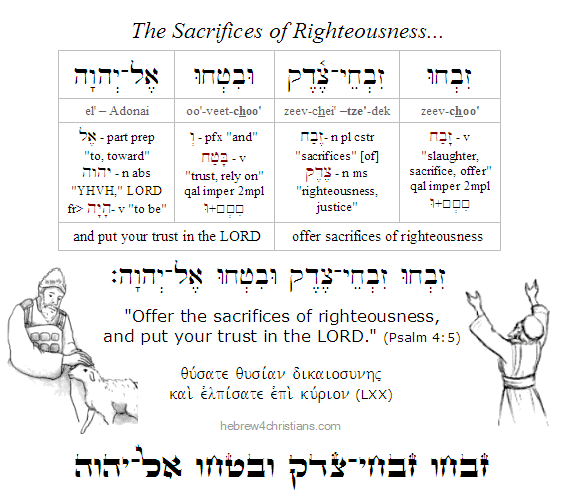 |
March 2025 Site Updates
Our Refuge in all Generations...
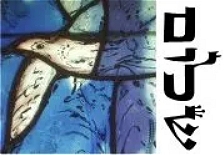
03.31.25 (Nisan 2 5785) Don't let worry blind you to God's ongoing care; don't live as those without faith. You have a place in your Father's heart; you have a share in his house above. See the Lord as your Dwelling Place "in all generations"; behold his unchanging glory despite the fleeting shadows of this world.
We must first look to the Eternal to rightly see the finite; we must look upward before we look downward. As we contemplate God's Eternality and power, we realize the wonder and sanctity of our short time here. The Eternal is our refuge, our "dwelling place," in all generations, and that means in the present generation as well, on the other side of fleeting appearances of this world. When we pray to God as Avinu She-bashamayim, "Our Father in Heaven," we are calling to the One who (ש) is in the midst of the waters (מים) of Life.
The psalmist says (Psalm 118:17): "I shall not die but live." In order to live you must give yourself to death, but when you have done so, you discover that you are not to die, but live. "Giving yourself to death" means surrendering to God's will, accepting the yoke of heaven, and trusting in His governing "flow" over all of creation. This is the deeper meaning of "baptism" as we are immersed into God's care for us. Yeshua gives us abundant life.
The bloom of every flower is by eternal purpose, and not one common sparrow is forgotten by your Heavenly Father (Luke 12:6). God's irresistible providence comprehends and orders all things, from the realm of the subatomic to the cosmic motions of the heavenly bodies. The Lord is the Center of reality: "All things were created by Him, and for Him, and in Him all things hold together" (Col. 1:16-17).
In light of this, Blaise Pascal asked, "What is left for us but to unite our will to that of God himself, to will in him, with him, and for him the thing that he has eternally willed in us and for us." In other words, what else can we do but learn to trust, accept, and to say "yes" to life – even if we may feel like strangers in exile during our sojourn here...
All our days are ordained; recorded in God's scroll. Therefore may God "teach us to number our days to get a heart of wisdom" (Psalm 90:12). So don't lose heart, friend; He who cares for you is a Good Shepherd, and you shall dwell in the house of the LORD forever.
Hebrew Lesson
Psalm 90:1 reading (click):
Note: We don't rejoice because things may go well for us, since our worldly circumstance may change at any time, but rather we rejoice because our names are written in heaven. "For none of us lives to himself, and no one dies to himself. For whether we live, we live unto the Lord; and whether we die, we die unto the Lord: whether we live therefore, or die, we are the Lord's" (Rom. 14:7-8). Amen.
The Gospel of Leviticus...
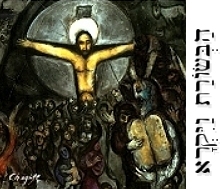
The following is related our Torah reading for this week, parashat Vayikra...
03.31.25 (Nisan 2 5785) From a "macro" or high-level view, we can understand the book of Leviticus to provide a spiritual map that points the way to connect with God. It was written to speak to our need and desire to enter into the holy space of his reconciliation...
Recall that the book of Genesis explains our origin, the fall of our souls into sin and our subsequent alienation from God. It also foretold of the coming Redeemer who would heal us from our fallen estate and establish the kingdom of God upon the earth.
The book of Exodus further reveals the LORD as our Deliverer who saves us from bondage to olam hashkerim (עוֹלָם הַשְׁקְרִים), the false world, and who then graciously leads us to freedom by awakening our souls to divine truth.
The Exodus from Egypt (יציאת מצרים) serves as a parable of the salvation experience (Rom. 15:4; 1 Cor. 10:11). First, faith in God's promise is expressed by sheltering under the blood of the lamb of God as a "passover" sacrifice (as it was with Abel's offering), and through it we are delivered from the plague and curse of death. We are then graciously led by the Spirit of God through the waters into newness of life when we begin our journey to our true homeland. We begin to understand the covenant promise to be God's people. The revelation at Sinai pulls back the curtain of the phenomenal world to disclose the underlying and overarching spiritual reality. Hearing the divine voice imprints us with God-consciousness. We are awed and overwhelmed with the divine presence and desire to enshrine it within our hearts forever.
The building of the Mishkan (Tabernacle) "reifies" the vision to create a habitation of the divine Presence. It embodies our gratitude to God. As Solomon later said as he dedicated the Temple in Jerusalem, however: "Will God indeed dwell on the earth? Behold, heaven and the heaven of heavens cannot contain You. How much less this Temple which I have built! Yet regard the prayer of Your servant and his supplication, O Lord my God, and listen to the cry and the prayer which Your servant is praying before You today" (1 Kings 8:27-28). Nevertheless, the desire to know God to be present calls for a sacred place to be made within the heart...
And this is what the book of Leviticus, or Vayikra, is really about: hearing the call of God to draw near to Him. Therefore the Mishkan was structured with inner chambers or "gateways" that led ever closer to the throne of God himself. We come to the first gate by faith: the Curtain of the outer courtyard is opened and we enter. We see the outer altar where the Lamb of God was continually offered, reminding us of the original sacrifice and promise given at Eden. We wash ourselves at the basin and enter the Holy Place where we behold the divine light of the Menorah. We eat of the "bread of Presence" (לֶחֶם פָּנִים) and offer prayer at the golden Altar of Incense. At the appointed time, we reverently open the veil to enter the Holy of Holies, appealing to the blood offered on our behalf to make atonement for breaking God's heart. In a cloud of smoke we descry the blood sprinkled seven times over the broken tablets stored in the sacred Ark. We confess the Name of the LORD and sense His blessing and acceptance...
The great and overarching lesson of Vayikra is that God delivers us so that we can know his heart. And this is the message of the Cross of Messiah as well -- the great Altar of God, the Tabernacle "made without hands," where Yeshua entered the Holy of Holies to willingly offer up his blood in intercession for our brokenness (Heb. 9:11-12). Amen, and may His Name forever be praised.
Hebrew Lesson
Psalm 26:8 reading (click):
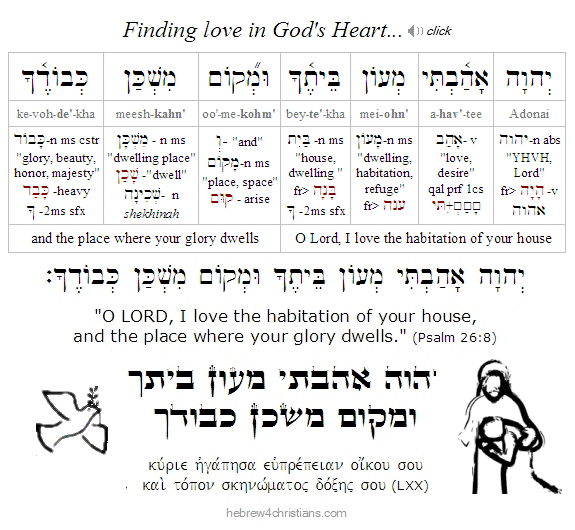 |
Preparing for Passover...
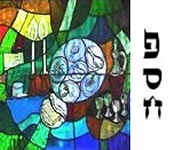
03.30.25 (Nisan 1 5785) To prepare for the holiday of Passover, we first must remember why it is so important for us. We must understand how the great exodus of Israel from Egypt (יציאת מצרים) constitutes the central parable (or story) of the Torah, and indeed of the entire Bible. The bondage of the Israelites to Pharaoh represents humanity's slavery to sin; deliverance from cruel bondage is effected by trusting in the blood of the sacrificial lamb of God; the exodus from death to life symbolically comes through baptism into the Sea of Reeds; the journey to truth represents the pilgrimage to Sinai, and so on.
We must further recall that the redemption in Egypt led directly to the revelation given at Sinai. When God personally manifested his glory to Israel, he did not begin by saying he was our Creator, but rather our Redeemer: "I am the LORD your God (אָנכִי יְהוָה אֱלהֶיךָ), who brought you out of the land of Egypt, out of the house of slavery" (Exod. 20:2). God began with these words because the purpose of the creation itself is to demonstrate God's redemptive love and to be known as our Savior and Redeemer, just as Yeshua is the "Lamb slain from the foundation of the world" (Rev. 13:8; 1 Pet. 1:18-20; Eph. 1:4; 2 Tim. 1:9).
"All things were created by Him (i.e., Yeshua), and for Him" and in Him all things consist (συνεστηκεν, lit. "stick together") (Col. 1:16-17). Creation therefore begins and ends with the love of God as manifested in the Person of Yeshua our Redeemer, the great Lamb of God and our Savior... He is the Center of Creation - the Aleph and Tav - the Beginning and the End (Isa. 44:6; Rev. 1:8). All the world was created for the Messiah: "For from him and through him and to him are all things. To him be glory forever. Amen" (Rom. 11:36).
Understanding the Calendar...
Although it may be a bit confusing to understand the overlap and sequence, the Torah instructs us to prepare for Passover by first noting the first "new moon" of the Spring (aviv), which is called the first day of the month of Nisan on the Jewish calendar. This is called "Rosh Chodashim," meaning the "head of the months," and it therefore serves as the start of the new year as well (Exod. 12:2). From the outset of the new moon until the full moon of the same month marks 14 days, which at sundown marks the appointed time or holiday of Passover. Technically speaking Passover runs only one day, from the evening of the 14th until the 15th, but since it begins concurrently with the first of the seven days of unleavened bread (Exod. 12:15-20), Passover is often regarded as week-long holiday.
Now to make matters even a bit more complicated, the Torah instructs us to count 49 days – "seven weeks of days" – from the day following Passover until Shavuot (i.e., Weeks or "Pentecost"). This period of time is called Sefirat HaOmer (סְפִירַת הָעוֹמֶר), or the "counting the sheaves" (Lev. 23:15-16; Deut. 16:9-10). Of particular interest to us is the second day of the count, on Nisan 17, called Yom HaBikkurim (יוֹם הַבִּכּוּרִים), "the Day of Firstfruits," which marks not only the "first of the harvest" but the resurrection of Yeshua from the dead - the "firstfruits" of redeemed humanity secured by his sacrifice for us as the Lamb of God.
The festival of Shavuot ("Weeks, "Pentecost"") marks the culmination or "jubilee" of the redemption, and it is sometimes called Atzeret Pesach (עצרת פסח), or "the Gathering rally of Passover." According to the traditional sages the new moon of Nisan (חודש ניסן) marks the start of sacred time, the Passover remembers the sacrifice of the Passover Lamb, the first day of Unleavened Bread remembers the Exodus from Egypt, the seventh day of Unleavened Bread remembers the crossing of the Red Sea, the counting of the Omer recalls the days before the giving of the Torah at Sinai, and Shavuot (Pentecost) remembers the giving of the Torah exactly seven weeks (שבעה שבועות) after the Exodus (on Sivan 6 in the Torah's calendar). Followers of Yeshua understand Pentecost to the appointed time for the advent of the Holy Spirit as was promised by our Savior (see Acts 1:3-2:4; John 15:26, John 16:7).
![Spring Holiday Timeline (H4C]](../../About_HFC/Site_News/roshchodeshim-line.gif) |
In a sense Shavuot stands in contrast to Passover that requires unleavened bread (matzah), since two loaves of bread made from the first fruit of the wheat harvest were baked with chametz (yeast) before being "waved before the LORD" (Lev. 23:15-21 which pictures the "one new man" (both Jew and Gentile) gathered before the altar of the LORD (Eph. 2:14).
Getting Ready for Passover...
Some Christian traditions observe a 40 day period of repentance and preparation leading up to "resurrection day" (which they reckon to always fall on a Sunday based on an exegetical error). This tradition may have been derived from the 40 days of teshuvah observed by the Jewish people during the time of the High holidays in the fall, and some theological correspondences can be made between Passover and Yom Kippur regarding atonement. That said, there is no indication given in Scriptures that we should fast or otherwise undergo dietary restrictions in preparation of the holiday of Passover, though of course we are instructed to remove all "chametz" from our homes and to abstain from eating any during the days of unleavened bread. We need to use the "good eye" with those who may differ with us regarding the observance of the holidays, and we must be sure to keep focused on what is most essential regarding all of this heart of the Lord...
From the Jewish perspective, we get ready for the Passover today by planning for a Passover Seder, or commemorative meal, that remembers the great Exodus from Egypt and that retells how the Lord faithfully saved Israel with a "mighty hand and an outstretched arm."
The traditional Passover Seder that has been developed over the centuries has more or less been distilled into a formulaic text recited during the commemorative meal by a designated seder leader (or leaders). This text is called the Haggadah (הַגָּדָה, "telling") and it was designed to guide the order of the Passover service... Everybody gets involved in the seder and often discussions can be lively and intense. And while there is no "official" Passover seder, most haggadot (seder guides) will set forth the traditional sequence of 15 "steps" (or activities) that we will do to commemorate our deliverance from our bondage in Egypt...
So one of the first steps to prepare for Passover is to select a Haggadah that you will use for the family service and familiarize yourself with its content. You then can make a checklist of needed items for the meal. If we make some time to do this, we will feel more comfortable as we go through the Passover service with our family and friends.
To help you get started, you can download the (free) Hebrew for Christians Passover Seder and to print a copy for yourself and for each participant at your Seder. The seder is guide is called "Worthy is the Lamb," and it will guide you through all the 15 steps of the traditional seder with constant reference to the ministry of Yeshua as the Lamb of God.
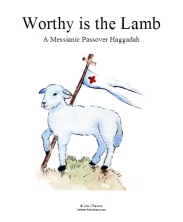 |
"Worthy is the Lamb"
H4C Passover Seder Guide (pdf)
Removing Chametz
The Torah tells us to remove any trace of leaven or "chametz" from our houses before the Passover begins (Exod. 13:7; Duet. 16:8). Because of this we clean our homes of all possible chametz (products or residue which might contain leavening such as bread, crumbs etc.) before the holiday begins. The cleaning culminates in the Erev Pesach ceremony of Bedikat Chametz, when the last vestiges of leaven are removed from the house. For the entire week of Chag HaMatzot we are not to have any leavened products in our homes, nor are we to consume any leavened products outside our home. We are to be "leaven-free.
The process for removing chametz from your house is a bit involved, and frankly very few people have the time and energy to perform a thorough cleaning in the traditionally prescribed manner. Nonetheless, the traditional steps include:
- Cleaning all possible locations where chametz might have been eaten or might be found in the house. This means searching for crumbs under the cushions of your sofa or stuffed chairs, in the pockets of your coats and pants, on closet floors, and so on. After a room is entirely cleaned and declared chametz-free, it is called "Pesachdik" and no further eating in that room is allowed until after Passover.
- Emptying and scrubing down the entire refrigerator to remove all traces of chametz. This includes washing out the freezer as well.
- "Kashering" your stove and oven. This involves a thorough scrubbing of the entire oven, stove top, and racks and then turning the stove (and stove tops) on for over one hour at the highest temperature. A microwave oven can be kashered by boiling a bowl of water inside it for more than 20 minutes.
- Putting away all dishes, silverware, pots, utensils, etc. that are normally used during the year. Only dishes, silverware, pots, utensils, etc. that are dedicated for Passover may be used during Passover Week.
- "Kashering" your dining room and kitchen tables by pouring boiling water over them and then thoroughly scrubbing them down with soap and water. After kashering, the tables are covered until Passover.
- Scouring the sink, counters, and all other appliances with boiling water.
- Scrubbing down the floors, windows, and all other parts of the house.
The Hebrew word chametz (חָמֵץ) derives from the same root as the word "sour" (חָמוּץ), and is generally considered to be any corrupting influence, a hidden uncleanness that manipulates purer elements. Like the influence of a lump of leaven in a batch of dough, "spiritual" leaven functions as an evil impulse within us that corrupts and sours our soul. As such chametz is considered a metaphor of sin which we are commanded to put away from us. The removal of chametz is a metaphor of our sanctification. Part of observing Passover, then, means being careful not to eat anything with chametz (yeast) during the entire seven days of the Feast of Unleavened Bread (i.e., from Nisan 15 through Nisan 22).
Note that the search for hidden chametz is not unlike the soul searching we do before the fall High Holidays, when we perform chesbon hanefesh (חֶשְׁבּוֹן הַנֶּפֶשׁ) by taking inventory of our spiritual condition before the LORD. In other words, we are commanded to search and remove sources of inner impurity so that we might experience the truth that we area "new lump" - that is, a new substance that is untainted by the sour and rotting influences of our past lives. Since Yeshua has been sacrificed as your Passover Lamb, you are indeed a new creation (בְּרִיָּה חֲדָשָׁה) and are made "unleavened" by the power of the Holy Spirit (2 Cor. 5:17). Therefore we are likewise commanded put away the "old nature" - the yetzer ha'ra - and purge from your life the old influences that inwardly canker you and make you sick. Walk without hypocrisy in the truth of the love of God for your soul.
Keeping the Feast...
Observing Passover is crucial for God's people. In the Torah we read: "And the LORD spoke to Moses in the desert of Sinai, in the first month (בַּחֹדֶשׁ הָרִאשׁוֹן) of the second year after they had come out of the land of Egypt, saying, 'Let the people of Israel keep the Passover at its appointed time. On the fourteenth day of this month, at twilight, you shall keep it at its appointed time; according to all its statutes and all its rules you shall keep it' (Num. 9:1-3).
Ultimately all true Torah points to Yeshua, who is the divinely appointed Redeemer and the beginning and goal of all of creation... "When the fullness of time (τὸ πλήρωμα τοῦ χρόνου) had come, God sent forth his Son, born of woman, born under the Torah, to redeem those who were under the Torah, so that we might receive adoption as sons" (Gal. 4:4-5). As the psalmist later declared: "He made the moon for the appointed times" (Psalm 104:19). And since Yeshua came to perfectly fulfill the meaning of these appointed times, it is clear that he observed this calendar as well (Gal. 4:4-5).
Therefore, friends, let us keep the feast of Passover according to the appointed time of the LORD, namely, on the 14th day of the month of Nisan, the first month of the Biblical calendar, at twilight, as a time to be remembered and guarded for all generations (Exod. 12:42). As the Apostle Paul wrote: "Cleanse out the old leaven that you may be a new lump, as you really are unleavened for Messiah our Passover Lamb has been sacrificed for" (1 Cor. 5:7-8). Amen! Worthy is the Lamb who was slain!
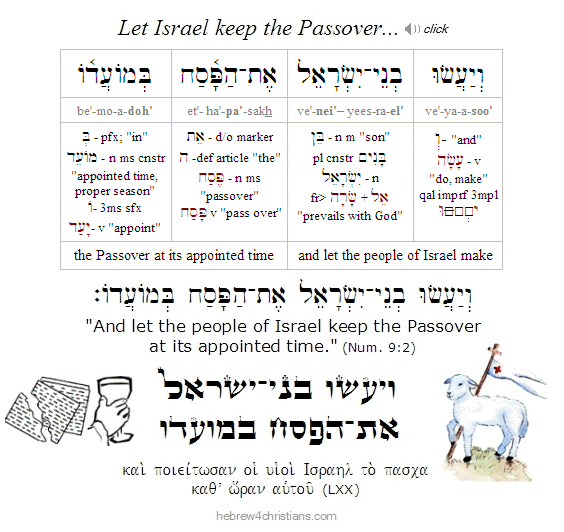 |
The LORD Calls Out - ויקרא
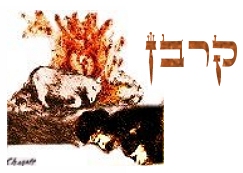
This week we begin a new book of Torah, sefer Vayikra (i.e., the book of Leviticus)...
03.30.25 (Nisan 1 5785) Chodesh Tov v'shanah tovah chaverim. The first Torah portion for the new Biblical New year is parashat Vayikra ("and he called") which is the first "section" from the Book of Leviticus (ספר ויקרא). In Jewish tradition, Leviticus is sometimes called the "Book of Sacrifices" (i.e., sefer ha'zevachim: ספר הזבחים) since it deals largely with the various sacrificial offerings brought to the altar at the Mishkan ("Tabernacle"). Indeed, over 40 percent of all the Torah's commandments are found in this central book of the Scriptures, highlighting that blood atonement is essential to the Torah. Moreover, since the revelation of the Tabernacle was the climax of the revelation given at Sinai, the Book of Leviticus reveals its ritual significance, as it is written: "For the life of the flesh is in the blood, and I have given it for you on the altar to make atonement for your souls, for it is the blood that makes atonement (kapparah) by the life" (Lev. 17:11).
Unlike narrative portions of other books of the Torah, the Book of Leviticus begins with the LORD himself "calling out" (i.e., vayikra) to Moses to explain that the way to draw near to Him is by means of atoning sacrifice. It is noteworthy that throughout the book, only the sacred name of the LORD (יהוה) is used in connection with sacrificial offerings, and never the name Elohim (אלוהים). This suggests that sacrificial offerings were given to draw us near to experience God's mercy and compassion rather than to simply appease His anger.... In other words, the Name of the LORD represents salvation (i.e., yeshuah: ישועה) and healing for the sinner, not God's judgment (John 3:17). Indeed, the word korban (קרבן), often translated as "sacrifice" or "offering," comes from a root word karov (קרב) that means to "draw close" or "to come near" (James 4:8). The sinner who approached the LORD trusting in the efficacy of the sacrificial blood shed on his or her behalf would find healing and life...
In this connection we note that the ancient Greek translation of the Torah (called the Septuagint) translated the Hebrew word kapporet (i.e., כפרת, "mercy seat") as hilasterion (ἱλαστήριον), sometimes translated "propitiation." The New Testament picks up this usage in Romans 3:25: "God put forward Yeshua as a propitiation (ἱλαστήριον) through faith in His blood." In other words, the shedding of Yeshua's blood - represented by His Passion upon the cross - was "presented" upon the Heavenly Kapporet, before the very Throne of God Himself for our atoning sacrifice (i.e., kapparah: כפרה) before God.
Hebrew Lesson
Opening words of Vayikra (click for audio):
To a Happy New Year!
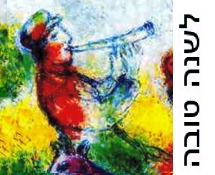
03.28.25 (Adar 28 5785) As I mentioned earlier this week, the new moon of Nisan is the most significant of the Jewish calendar since it initiates the first month of the Biblical Calendar - and therefore represents the Biblical "New Year's Day." Of all the various Rosh Chodesh celebrations, then, Rosh Chodesh Nisan is foundational, since it presents the starting point for the cycle of the yearly festivals (mo'edim) that reveal prophetic truths about the LORD God of Israel and His beloved Son, Yeshua the Messiah, blessed be He.
Blessing for the New Year
The following prayer (or blessing) is customarily said during Rosh Hashanah, but it is equally applicable for the New Year of Nisan and the Season of Passover:
יְהִי רָצוֹן מִלְּפָנֶיךָ יהוה אֱלהֵינוּ
וֵאלהֵי אֲבוֹתֵינוּ
שֶׁתְּחַדֵּשׁ עָלֵינוּ שָׁנָה טוֹבָה וּמְתוּקָה
בַּאֲדנֵינוּ יֵשׁוּעַ הַמָּשִׁיחַ אמן
ye·hee · ra·tzon · meel·fa·ney'·kha · Adonai · E·lo·hey'·noo
ve·lo·hei · a·vo·tey'·noo
she·te·cha·desh · a·ley·noo · sha·nah · to·vah · oo·me·too·kah
ba·a·do·ney'·noo · Ye·shoo'·a · ha·ma·shee'·ach [a·men]

"May it be your will, LORD our God
and God of our fathers,
that you renew for us a good and sweet year
in our Lord Yeshua the Messiah." [Amen]
Shabbat Hachodesh Shalom and Happy New Year chaverim!
Secret Places of Prayer...

03.28.25 (Adar 28 5785) Yearning, wish, hope... The inner groan of heart, the "private language" of our secret fears, sorrows, and delights. Prayer is bound up with the mystery of who we are and who God is - it is our "word" combined with his in covenant conversation. It is the voice of "neshama yeterah," our redeemed soul in God's presence.
Often we find our voice to pray when we are desperate, or when we are in a state of heart that has abandoned itself in search of an answer to our question. For our need evokes the question and reveals our insufficiency, our frailty, and the vastness of our finitude.
Asking God for help is the confession that we are not-God, that we are powerless to remedy the sickness, that we cannot take away the pain, or assuage the fear, or raise the dead - either of our own hearts or the hearts of others. Asking God for help is to connect with who we really are - lost, afraid, confused, sometimes sad, lonely, insecure, lustful, impatient, and so on.
In our desperation we may feel hopeless and exhausted, or even (secretly) rageful at God for the sorry mess of our lives (or indeed, the sorry mess of the universe itself). We may struggle to trust or understand why or for what reason our heart is broken and made desolate. But despite all this, our prayer confesses the goodness of God and believes that he listens to us in the groans and sighs of our lives.
I mentioned recently that we should be careful what we wish for, because we just may get it... Can we secretly pray for something that would destroy us? This is why it is so important to know what it is that we are asking or praying for in the first place. "Search me O God, and know my heart; test me, and know my thoughts, and see if there is any idolatrous way in me, and lead me in the way of everlasting truth" (Psalm 139:23-24).
"Lord, teach us to pray," the disciples once asked Yeshua, and he answered by saying first "enter into your closet," that is, make space to get alone with God and appeal to him as your heavenly (or true) Father who knows all about you but who loves you just the same... It is in the sacred place where you know yourself as beloved and chosen...
That's part of the paradox of prayer: in our apparent nothingness and our misery we are transformed into God's very children. It takes courage to let God know the secrets of your heart - your fears, disappointments, your faithlessness, and so on. It takes honesty and a desire to be who you really are before the LORD.
"Your Father knows what things you need before you ask Him." This is another paradox. If he knows already, then why ask at all? What's there to talk about? But we ask because he already knows what we need. We don't pray to change God's mind but to empty ourselves of our fears and to know that we are his beloved. Though he knows the number of the hairs on your head, you confess your need to him, you open your heart to him and acknowledge the secrets he knows. "And your Father who sees your secrets will reward you openly."
"Real speaks to real," which means that we can't talk with God if we are hiding the truth from ourselves. "Thank you, God, that I am not like other men..." is a prayer God hears but does not answer, for it is based in self-deception and illusion. People who are "content" with their lives and don't yearn for deliverance from themselves cannot know the power of God. We need God to even know that we need him, but once we understand our great need for him we know that he will meet our true need....
Some people may say they need God but they don't really want to know him after all. What does God need? Does he have a "prayer" within his own heart for us? Yeshua teaches that he does. His prayer is that you would know the love of God revealed in his life given for you, that is, for you "to know the love of Christ that surpasses knowledge, so that you may be filled with all the fullness of God" (Eph. 3:19). As he prayed: "This is eternal life, that they know you, the only true God, and Yeshua the Messiah whom you have sent" (John 17:3).
People pray to God, but to whom does God pray? And for what might He pray? Or do you think that the Almighty has no desires of His own, no yearning of heart, no prayer? The sages of the Talmud believed that God indeed addresses himself: Yehi ratzon milfanai, "May it be acceptable before me, may it be My will, that my compassion overcome my anger, and that it may prevail over my justice when my children appeal to me, so that I may deal with them in mercy and in love" (Berachot 6a). This is the deeper unity of the Name YHVH (יהוה), the Savior and LORD, revealed to Moses after the sin of the Golden Calf (Exod. 34:6-7), and this is the essential meaning of the cross of Yeshua, where the LORD passionately "prayed within Himself" so that His compassion would overcome His fearful judgment for our sins.
Only the cross of Yehsua allows God's righteousness and mercy to "kiss" (Psalm 85:10; 89:14); only the cross reveals the true Holy of Holies where the blood was placed over the Ark of the Law; only the cross intimates the Inner Sanctum of God's heart. Because of the cross, a holy God is able to truly love and help the trusting sinner (Rom. 3:26). It is written: "Righteousness and justice are the foundation of your throne (צֶדֶק וּמִשְׁפָּט מְכוֹן כִּסְאֶךָ); steadfast love and faithfulness go before you" (Psalm 89:14). Because of Yeshua, God is vindicated as entirely just - and the Justifier of those who trust in His redemptive love (Rom. 3:24-26). Yeshua is the prayer of God the Father's on behalf of His children...
The will of God - his heart's yearning and desire, his very prayer - is for his children to receive his love (2 Pet. 3:9; 1 Tim. 2:4; John 3:16; Ezek. 18:23). As Yeshua prayed, "Holy Father, keep them in your Name, which you have given me, that they may be one, even as we are one... I in them and you in me, that they may become perfectly one, so that the world may know that you sent me and loved them even as you loved me" (John 17:11,23). Yeshua died on the cross to bear the shame for your sins, to be sure, but he did this so that you could be accepted and securely loved forever.... It is the love of God that is the goal of all things, after all. When Yeshua cried out, "It is finished" and breathed his last breath as He died for our sins upon the cross, the greatest exhalation of the Spirit occurred, the greatest sigh, the greatest utterance was ever declared. The sacrificial death of Yeshua for our deliverance was God's final word of love breathed out to those who are trusting in Him.
Hebrew Lesson
Psalm 116:1-2 reading (click):
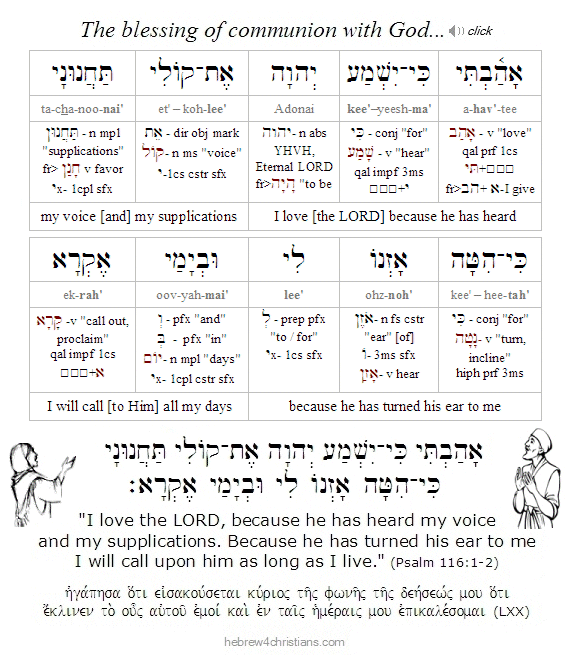 |
Perseverance of Hope...

03.28.25 (Adar 28 5785) There's an old story of the ancient philosopher Thales of Miletus who fell into a well while he was contemplating the heavenly bodies. All his grand intellectual aspirations resulted in a pratfall of humility. Kierkegaard likewise tells the tale of notable professor who, in the pontification of grand ideas of the cosmos, was oblivious to a drop of sweat that dangled from his nose. And there have been times in my life when I have meticulously studied Scripture and was so engrossed in theological matters that I somehow forgot that God was really present! In such moments, if I were suddenly interrupted, I would likely fall into a moment of peevishness and irritation. It would be comical if it weren't so sad and disappointing, and yet there is a message in the pain that should not be missed....
What do we do with our inconsistencies, those "lapses" of faith that expose what we are actually believing at the time? These are gaps or incongruities between what we might say is true and what our behavior otherwise reveals. For instance, we may say that we trust God with our lives, and aver that we believe that the Almighty works all things "together for our good," but inwardly we are filled with impatience, anxiety, and even dread. We are vaguely conscious of our dissimulation at times; we feel the tension that something is not right about us; we sense that we are not who we want to think we are. We may even suspect that we are inwardly divided, unstable, and afraid of what is hidden within our deepest hearts. But we tolerate our pretenses. We may ask ourselves "what would Jesus do?" and then find reasons to excuse ourselves; we may affirm: "When I am weak, then I am strong," and then "think twice" in fear over circumstances that we do not understand...
So how do we deal with this contradiction between what we are and what we ought to be? How do we reconcile what "is" with what "ought" to be? In other words, how do we "practice what we preach?" We all experience the "gap" between the real and the ideal not only in the social and political world around us, but also - and more profoundly - as duplicity within our own hearts. Alas, how can we no longer be "two-souled' or double minded? How can we be set free from the influence of the "shadow self"?
These are not questions about theology or doctrine, but about emotional and spiritual maturity, that is, they are matters of personal character. When Yeshua said that the truth would set you free, he didn't mean that you would find freedom by studying theology as much as by undergoing transformation of the heart. He was talking about reality - namely the reality of God's righteousness healing your sick life... Theology is important, of course, but primarily as a means to the greater end of knowing God "bekhol levavkah," with all your heart, "bekhol nafshekha," with all your soul, and "bekhol me'odekha," with all your might. The essential reason for learning about God is be in heartfelt relationship with him, after all, and that will lead to transformation of the way we live - that is, how we think, talk, and make decisions. Spiritual truth is "existential." How we live life reveals what we truly believe. But all of it comes from the miracle of God's truth that declares and makes us who we really are...
When we are born from above, we are given a new nature, and the "seed" of eternal life is implanted within the soul. Heart transformation, experientially speaking, comes through time, as a matter of undergoing "reproof" and "correction." This is sometimes called the process of "sanctification," which means walking uprightly in the way of holiness. The Lord is likened to a potter and we are as clay in his hand (Isa. 64:8). Life on the "potter's wheel" can be messy, unsettling, and sometimes excruciatingly hard, but it is God's sovereign work to form your life according to his design and purposes. From our perspective it seems so tedious and difficult, but from God's perspective it is "already done," it is the finished work of Christ that he sees.
God gives us the Scriptures to help us know his heart, as it is written: "All Scripture is inspired by God and profitable for doctrine, for reproof, for correction, and for training in righteousness" (2 Tim. 3:16). Here we note that the Hebrew word for "reproof" is tochechah (תּוֹכֵחָה), from a root (יכח) that means to test or judge the quality of something. God's reproof reveals the gap between our behavior and his standard of moral and spiritual truth, and when we are reproved by God, we understand how we fall short of his will. The Hebrew word for "correction" is mussar (מוּסָר), from a root (יָסַר) that means to chasten or punish, though always with the aim of developing godly character. God will sometimes allow us to undergo affliction, for instance, to teach us patience or humility. "Training in righteousness" means being instructed, as a child, in what is upright, true, and honorable. The life of faith is "education for eternity" where we "catch up" with the reality of God's power within us.
Narrowing the gap between what we say that we believe and how we actually live is therefore an ongoing process for us in this life. The world, the flesh, and the devil are forces that weigh us down to keep us profane and fallen, but God provides his Spirit and he instructs us to walk in the victory of faith. If we ignore or rationalize the gap, however, that is, if we allow the inner conflict and dissonance to become deeply rooted within our souls, we run the risk of becoming either self-deceived or embittered over the struggle. Bitterness is especially dangerous because it can result in abandoning the life of faith altogether (Heb. 12:15). We can fight against these temptations by affirming that what is "really real" about who you are is what God says and does on your behalf in Yeshua. We look to Him, not to ourselves...
The test of faith is a matter of the heart more than the head. Things such as fear, pride, or ungodly desire can overrule our profession of faith, and we "forget" our calling before the Lord. The battle is found within the heart. Courage and moral allegiance is more powerful than intellectual conviction regarding matters of temptation.
The inner conflicts are real. The battle is for our souls. Many of us have truly felt or experienced the glories of God's love, and we want to believe and to walk in the light of that love... So we try various things to know God or recapture our hope. We study, read, think hard, pray, attend services, and so on. But as we try again to be spiritual or religious or self-assured, we may become bound, weary, and feel like a failure... We suspect that we have failed God, failed ourselves, and failed others. We go dark, ashamed, and anxious, but we try yet again, and again, until we are distraught and in agony of heart.
Yet this cycle or undulation is part of the test of faith, this agony of trying and failing, encountering our shadowy duplicity of heart, descrying yet again what we really are on the inside, and crying out for deliverance from our faithlessness, our hypocrisy, our fecklessness, and our despair... Paradoxically, because we cannot help ourselves, we continue trying, lamenting, confessing, and persevering - despite ourselves - and in the lament of the struggle to be who God says we are, we begin to surrender to a deeper heart or way of being - broken, humbled, brought face to face with our powerlessness and need - and it is then that we discover the healing hand of God is at work... God alone saves us, not we ourselves.
"You do not know what spirit you are of..." (Luke 9:55). Yeshua's words imply that each of us has the responsibility to know ourselves (γνῶθι σεαυτόν), and to learn to endure (and overcome) the natural motives and focus of our hearts. We collide with the truth of our spiritual condition in the midst of our daily frustrations, as we experience conflict, opposition, and the inner groan that arises from pressures and disappointments. Spiritual growth means learning to transcend our negative reactions, to stop cursing our conflicts, and to awaken to the blessings that surround and pervade our way. It requires a miracle. It demands faith.
If we are able to find the courage, our failures and brokenness may be used by God to purify the intentions of the heart by helping us to be more honest with ourselves. We begin to realize that we are more vulnerable than at first we thought; that our faith is not as strong as we imagined, and that our motives are often mixed and unconscious. Illusions are striped away; idols crumble; deeper levels of selfishness are uncovered; and the gap between our words and our deeds is exposed yet again... It is one thing, after all, to intellectually think about faith or to idealize spirituality, but it is quite another to walk out faith in darkness. Yet it is only there, in the rawness of heart, that we discover what we really believe and how our faith makes traction with reality... And there we will discover, if we persevere, the truth that Paul affirmed: "I have been crucified with the Messiah. It is no longer I who live, but Messiah who lives in me. And the life I now live in the flesh I live by the faith in God the Son, who loved me and gave himself for me. I do not nullify the grace of God, for if righteousness (i.e., salvation) were through the law, then Yeshua died for no purpose" (Gal. 2:20-21).
There is a "hidden blessing" (ברכת סוד) that comes from our troubles. When we learn to accept that we are accepted despite ourselves, we find God's Presence and can breathe in his peace and love, despite the sorrows and grief of our lives. When we come to the light, and do not deny the truth about our condition, we can honestly confess the Lord is our healing (Heb. 4:16). When we seek the good - and even bless the struggle - we express our trust that God is using our trials to help us grow and to bring beauty from our ashes (2 Cor. 7:10). "O Lord, I need you for everything, every last thing. Please meet my great need for You, for without you I am nothing." Amen, "turn us back to you, O LORD, so shall we be turned..." (Lam. 5:21).
Contrary to the assumption that the life of faith should always be triumphant, we all will experience various setbacks, pratfalls, troubles and various challenges in our lives. This does not mean that God does not care for us however, because on the contrary, this is by his design; a plan supervised by God's love and blessing, and the afflictions we therefore encounter are part of his work for our good (Rom. 8:28; Heb. 12:6). We "descend in order to ascend"; we go down to go up (לרדת כדי לעלות). It seems counterintuitive to the flesh, but the heart of faith gives thanks for all things - the good as well as the evil (see Job 2:10). We affirm: "This too is for the good," yea, even in the midst of our struggle, no, even more -- precisely in the midst of our struggle -- for this, too, is for our good. Faith is the resolution to trust in the reality of God's goodness even during hard times when we feel abandoned or lost (see Isa. 50:10). The Lord uses the "troubles of love" (יִסּוּרֵי אַהֲבָה) for our good - to wake us up and cling to him all the more, since this is what is most essential, after all...
God forbid we should give up now, friends. Faith "sees the unseen" and believes that the day of our ultimate healing draws near. You are in good hands as the Lord forms your soul for the glory of his purposes... Stay strong and keep your hope alive. !מחיל אל חיל
Hebrew Lesson
Psalm 86:11 reading (click for audio):
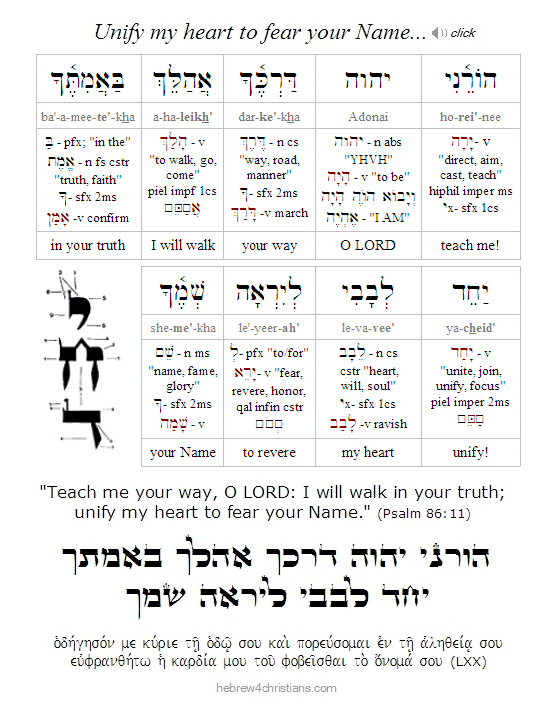 |
Accounting for the Lamb...
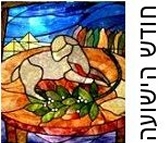
03.27.25 (Adar 27 5785) In our Torah portion for this week (i.e., Pekudei) we read that Moses consecrated the Mishkan (Tabernacle) on "Rosh Chodashim," that is, "the first day of the first month of the second year [since the Exodus]" (Exod. 40:17).
Note that this date (i.e., Nisan 1) marks the start of the Biblical year and "Chodesh Yeshuah" (חודש הישועה), or the month of the Passover Redemption (Exod. 12:1-12). The Torah's calendar therefore begins with the advent of the Lamb of God (שׂה האלהים), just as the central sacrifice of the Tabernacle was the daily sacrifice (i.e., korban tamid: קרבן תמיד) of a defect-free male lamb offered with unleavened bread and wine. The LORD calls this "My offering, My bread" (see Num. 28:1-8).
In other words, the service of the earthly Tabernacle (and later, the Temple) was intended to constantly foreshadow the coming Lamb of God who would be offered within "greater and more perfect Tabernacle (משׁכּן גדוֹל וּמשׁלם) not made with hands" to secure the eternal redemption (פדוּת עוֹלמים) for us (see Heb. 9:11-12).
Hebrew Lesson
Exod. 12:2 reading with comments:
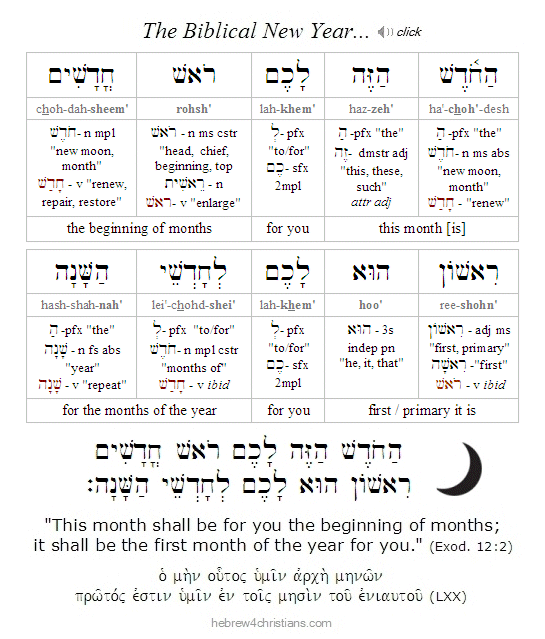 |
As I've mentioned over the years, the climax of the Torah given at Sinai was the revelation of the Tabernacle. The two tablets of the law, summarizing the Ten Commandments, were stored inside the Ark of the Covenant (ארון ברית יהוה), the innermost place of the Tabernacle, a sacred "three-in-one" box. As such, the ark served as a symbol of kisei ha-kavod (כסא הכבוד), the very Throne of Glory. It stood entirely apart as the only furnishing placed in the Most Holy Place, or the "Holy of Holies" (קודש הקודשים).
Upon the cover of the Ark (i.e., the kapporet: הכפורת) were fashioned two cherubim (i.e., angel-like figures) that faced one another (Exod. 25:17-18). According to the Talmud (Succah 5b), each cherub had the face of a child - one boy and one girl - and their wings spread heavenward as their eyes gazed upon the cover (Exod. 25:20). God's voice would be heard only in the midst of innocence, humility, purity, and hope...
Each year during the Yom Kippur (יום הכיפורים) ceremony, the High Priest would sprinkle sacrificial blood seven times upon the cover of the Ark of the Covenant to dramatize cleansing from the law's verdict and the atonement of sin that would be secured through the blessing of the Messiah.
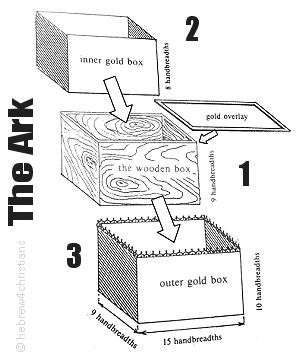 |
"But when the Messiah appeared as the High Priest (הכהן הגדול) of the good things that have come, then through the greater and more perfect tabernacle (not made with hands, that is, not of this creation), he entered once for all into the Most Holy Place (בקדשׁ הקדשׁים), not by means of the blood of goats and calves but by means of His own blood, thus securing for us the eternal redemption" (Heb. 9:11-12). Amen. The Scriptures teach that there is no Passover without "pekudei," that is, accounting for the blood of the Lamb of God!
Hebrew Lesson
Rev. 5:12 Hebrew reading:
Trusting God's love for you...

03.26.25 (Adar 26 5785) "Father forgive them, for they know not what they do" (Luke 23:34). Yeshua's intercession is not just for the sins we have consciously committed but to the sins done in the blindness of our unconscious; his sacrifice was offered not just for our known acts of sin, but for the wayward condition of our darkened hearts... "Heal me from hidden faults..." (Psalm 19:12).
This is essential. When God forgives our sin, it goes beyond forgiveness of the sinful behavior to the innate sickness of the heart. Divine forgiveness is remedy for our alienation, our lostness. It is healing of our deepest self, our secret heart, wherein we become a new creation. If God accepts us at all, he accepts us completely, and that means we are made righteous by means of his love and grace.
Teshuvah ("repentance") is not about becoming better but about becoming different. It is about newness of life. As Yeshua said, "Unless you are born again, you cannot see the kingdom of heaven." Believe that you have received it and it will be yours (Mark 11:24).
Hebrew Lesson
Psalm 63:3 Hebrew reading:
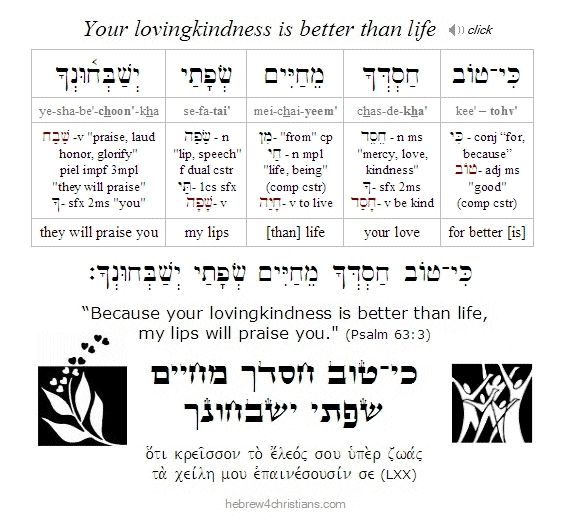 |
If there's hope for eternal life, it is found in the one who "loved me and gave himself for me" (Gal. 2:20). I put no trust in religion, nor in the reformation of my character, nor in my will to believe, but solely in the kindness of the one who heals me from the ruin of my self.
Torah of Eternal Life (חַיֵּי עוֹלָם)
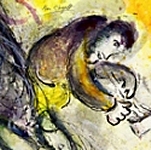
"The object of our faith is not the teaching but the Teacher..." - Kierkegaard
03.25.25 (Adar 25 5785) Yeshua reveals the heart of God to us, teaching us about the meaning of life and death and why we suffer... Most radically, however, he offers us the cure for the sickness of "spiritual death" (i.e., separation from God) by offering the gift of his life for us. Yeshua heals us from alienation and separation from the Eternal by means of spiritual regeneration (Eph. 2:1,5; John 3:3-7). Your relationship with Messiah constitutes eternal life (חַיֵּי עוֹלָם), for it is He who "makes you alive together with him" (i.e., συζωοποιέω, the Greek word here means you are brought into a new realm of existence by participating in the life in Messiah). He offers us daily deliverance from the power of sin by means of the Spirit of Faithfulness (רוּחַ הָאֱמֶת), though we must remain receptive to the message of hope and be transformed by the renewing our minds (Rom. 12:2; Eph. 4:23; Col. 3:10).
We must be careful not to "drift away" from the truth, since that forfeits the integrity of our lives and leads us into darkness and despair: "For what benefit is it for a person to gain the whole world, yet forfeit his life?" (Mark 8:36). Faith is the means or agency of connection with what is real, though we can lose that connection by hardening our hearts and returning to our former illusions (Heb. 3:13). Exile from God is therefore self-imposed; the gates of repentance are always open to those who seek God's compassion; everyone is welcome to find life in the blessing of Messiah (Luke 14:16-23; Luke 15:11-32). Therefore, draw near to God and God will draw near to you. "Let us then with confidence draw near to the throne of grace, that we may receive mercy and find grace to help in time of need" (Heb. 4:16).
Hebrew Lesson
Psalm 18:31 reading (click):
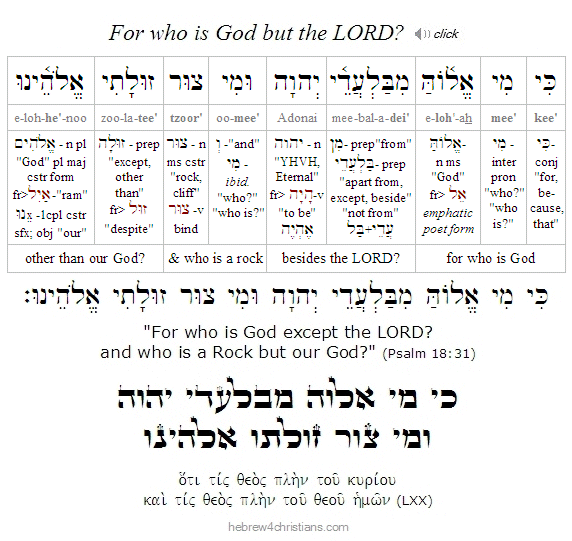 |
Seeking and Finding...
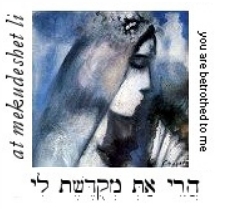
03.25.25 (Adar 25 5785) At its deepest level prayer is a groan of the heart, a sigh for life, a cry for love and connection. Our desires and yearnings are like prayers, and indeed the verb "to pray" in the New Testament means to wish or to hope.
Whatever the heart genuinely seeks, it will find. Most people seek what they want, and what they want is based on what they believe is ultimately for their good. They may be mistaken about what is truly for their good, however, which is the nature of tragedy.
There's an old saying, "be careful what you wish for, you just might get it," which is meant to warn us that since our heart's desires are always taking us someplace, we should be careful about our where our dreams may lead lest later we find ourselves in a nightmare.
The deeper question is not about whether we will pray, but for what we are praying... What are we seeking from the depths of our being?
"Out of the depths have I cried unto thee, O LORD." The person who pursues righteousness will find it, just as evil comes to the person who searches for it (Prov. 11:27). Therefore the voice of wisdom cries out, "I love those who love me, and those who seek me diligently find me" (Prov. 8:17), and the prophet shouts, "Seek the LORD while he may be found, call upon him while he is near" (Isa. 55:6).
This is the time to seek the LORD, for he is found near to us in Yeshua who calls us to receive God's love. "Ask, and it will be given to you; seek, and you will find; knock, and it will be opened to you. For everyone who asks receives, and the one who seeks finds, and to the one who knocks it will be opened." As you believe, so you receive (Matt. 21:22).
This is the "like for like" reciprocal principle of faith. Forgive us as we forgive; judge us as we judge; love us as we love; make us righteous as we take hold of righteousness, give us courage as we believe, and so on. As Isaiah said to fearful king Ahaz: "If you will not be firm in faith, you will not be firm at all" (Isa. 7:9). Your "amen" echoes the "amen" of heaven: "Let it be done for you according to your faith" (Matt. 9:29).
The principle of "let it be according to your faith" is profound and is a two-edged sword, since it applies not just to matters of desire and hope, but also to murmurs of the heart and discontent. The sages said that the manna in the desert would taste good or bad depending on the heart attitude of the person. Likewise, when the people arrived at Marah, they could not drink the water because it was "bitter" (מָרָה), though the Hebrew text allows us to read that it was the people themselves who were bitter - ki marim hem (כִּי מָרִים הֵם), and their bitterness made the waters seem bitter as well (Exod. 15:23).
It is written in our Scriptures: "Whoever pursues righteousness and mercy will find life, righteousness, and honor" (Prov. 21:21). Notice that the verb translated "pursues" in this verse, "radaf" (רָדַף), means to chase after or to pursue, as in a hunt. This same verb is used when King David exclaimed, "surely goodness and love will pursue me (יִרְדְּפוּנִי) all the days of my life" (Psalm 23:6). King David understood that as he pursued God, so God's love would pursue him! In other words, as we seek, so we are sought by God; as we draw near to God, so He will draw near to us (James 4:8).
Notice further the repeated use of the word "righteousness" (i.e., tzedakah: צְדָקָה) in this verse. When we pursue God's righteousness, we will find it, and we will be declared righteous (i.e., tzaddik: צַדִּיק) and given life (i.e., chayim: חַיִּים) and honor (i.e., kavod: כָּבוֹד). "In the path of righteousness is life, and in its pathway there is no death" (Prov. 12:28). Therefore Yeshua calls us to "seek first the kingdom of God and His righteousness, and all these things will be added to you" (Matt 6:33).
The prophet expresses hope: "Let us know; let us press on to know the LORD; his going out is sure as the dawn; he will come to us as the showers, as the spring rains that water the earth" (Hos. 6:3). This is his righteous prayer.
Salvation is "of the LORD." May God help us pursue him b'khol levavkha - with all our heart - because the He has promised, "You will seek me and find me, when you seek me with all your heart" (Jer. 29:13).
Hebrew Lesson
Proverbs 21:21 reading (click for audio):
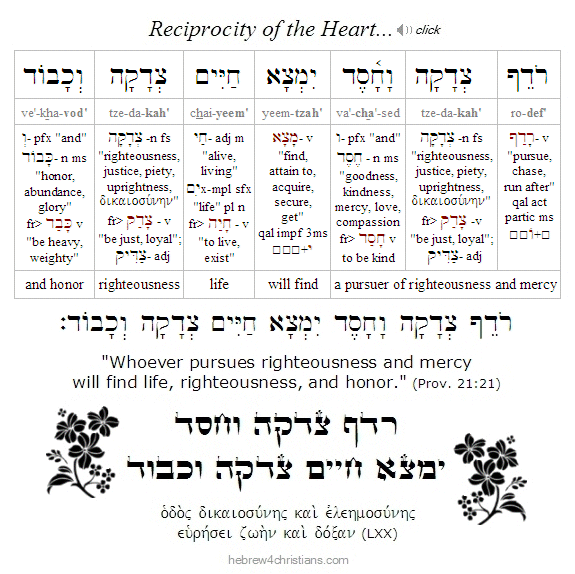 |
Choosing to Belong...
Taking the Exodus Story to Heart
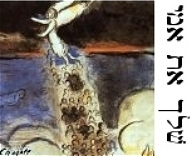
03.24.25 (Adar 24 5785) The theme of the Book of Exodus (סֶפֶר שְׁמוֹת) essentially turns on two great events, namely, the deliverance of the Israelites from bondage in Egypt (i.e., yetzi'at Mitzraim: יְצִיאַת מִצְרַיִם) and the subsequent revelation given at Sinai (i.e., mattan Torah: מַתַן תּוֹרָה). Both of these events, however, are grounded in the deeper theme of God's faithful love (chesed ne'eman: חֶסֶד נֶאֱמָן) expressed by the blessing of blood atonement (i.e., kapparat ha'dam: כָּפָרָת הַדָּם). With regard to the former, the blood of lamb (as foreshadowed in Eden) was required to cause death to "pass over" (לִפְסוֹחַ) the houses of the faithful of Israel; with regard to the latter, the sacrificial system represented by the Mishkan (i.e., "Tabernacle") was designed to teach what I call the "korban principle" (i.e., ikaron ha'keravah: עִקָרוֹן הַקרָבָה), that is, that the only way to draw near to God is by means of sacrificial blood offered in exchange for (or in place of) the trusting sinner, as stated in the Torah, "For the life of the flesh is in the blood, and I have given it for you on the altar to make atonement for your souls, for it is the blood that makes atonement by the life" (Lev. 17:11), and likewise in the New Testament we read: "without the shedding of blood there is no forgiveness of sins" (Heb. 9:22).
Jewish tradition tends to regard the giving of the law at Sinai to be the goal of the entire redemptive process, a sort of "return from Exile" to the full stature of God's chosen people. Some of the sages have taken this a step further by saying that God created the very universe so that Israel would accept the law. Such traditions, it should be understood, derive more from rabbinical thinking devised after the destruction of the Second Temple than from the narrative presented in the written Torah itself, since is clear that the climax of the revelation at Sinai was to impart the pattern of the Mishkan (תבנית המשכן) to Moses. In other words, the goal of revelation was not primarily to impart a set of moral or social laws, but rather to accommodate the Divine Presence in the midst of the people. This is not to suggest that the various laws and decrees given to Israel were unimportant, of course, since they reflect the holy character and moral will of God. Nonetheless, it is without question that the Torah was revealed concurrently with the revelation of the Sanctuary itself, and the two cannot be separated apart from "special pleading" and the suppression of the revelation given in the Torah itself... The meticulous account of the Mishkan is given twice in the Torah to emphasize its importance to God. This further explains why Leviticus is the central book of the Torah of Moses. (For more on this, see "The Eight Aliyot of Moses.")
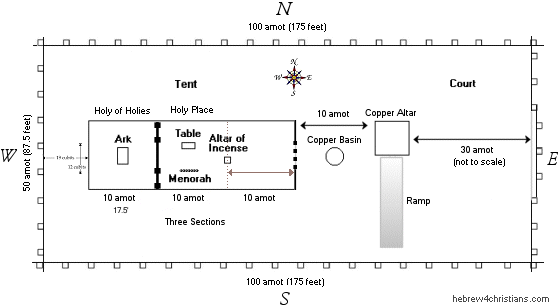 |
As we consider these things, however, it is important to realize that underlying the events surrounding deliverance and revelation is something even more fundamental, namely, the great theme of faith (אֱמוּנָה). This theme is our response to God's redemptive love. God's love is the question, and our response - our teshuvah - is the answer. The great command is always to "choose life!" We must chose to turn away from the darkness to behold the Light... Jewish tradition states there were many Jews who perished in Egypt during the Plague of Darkness because they refused to believe in God's love. Likewise, the revelation at Sinai failed to transform the hearts of many Jews because they despaired of finding hope.
As glorious as the redemption and revelation was, then, there was something even more foundational that gave "inward life" to God's gracious intervention. You must first believe that God loves you and regards you as worthy of His love; you must "accept that you are accepted." It is your faith that brings you near... This is the "Cinderella Story" of Exodus.
These themes of the Book of Exodus - and really of the Bible itself - will mean little to you unless you willingly identify with the calling of the Jewish people, and that implies that you reckon yourself as worth saving... You must see yourself as the recipient of divine affection and love. After all, without this as a first step, how will you make the rest of the journey? This is similar to the First Commandment revealed at Sinai: "I AM the LORD your God, who brought you out of the land of Egypt..." Notice that the statement, "I AM the LORD your God" (אנכי יהוה אלהיך) was uttered in the second person singular, rather than in the plural. In other words, you (personally) must be willing to accept the love of the LORD into your heart, since the rest of the Torah is merely commentary to this step of faith. Therefore the Book of Exodus is called Shemot (שְׁמוֹת), "names," because it sees every person as worthy of God's redeeming love and revelation. "For God so loved the world..." (John 3:16).
The midrash says that only one out of five of the children of Israel made it out of Egypt; some say one out of fifty, and some say one out of five hundred (see Mechilta). As Yeshua said: "Many are called, but few are chosen" (Matt. 22:14). Those who directly experienced God's deliverance in Egypt first of all believed they were redeemable people. Before anything else they made a decision to receive hope within their hearts. The blood of the original Passover lamb was a smeared as sign of their faith that God would accept them. We also must begin here. This is the start of the journey. We step out by faith, leaving behind the familiar - including the dark familiarity of our sin and shame - and venture out into the unknown. We venture out in hope because we trust the promises of God (הַבְטָחוֹת יהוה).
The journey of faith (מַסָע הַאֱמוּנָה) is marked with testing (בְּדִיקַת אֱמוּנָה). Being called out of the world leads you into the desert places. Faith is not something static, like a church creed or theology handbook. There are stony places, dangers, and difficulties that attend the way. We move out from "walled cities" into tents, traveling as "strangers and sojourners" on our way to a promised heavenly city. Therefore the Scriptures state that "by faith Abraham went to live in the land of promise, as in a foreign land, living in tents with Isaac and Jacob, heirs with him of the same promise. For he was looking forward to the city that has foundations, whose designer and builder is God" (Heb. 11:9-10). The way back home is the same for all who "cross over" from this world to the next. It is the way of hope, trust, and surrender.
The story of divine deliverance is not the story of "other people"; it is not a story told in the "third person." You must choose to belong. Again, your faith draws you near. That is why the sages teach: b'chol dor vador - in each and every generation an individual should look upon him or herself as if he or she (personally) had left Egypt. It's not enough to recall, in some abstract sense, the deliverance of the Jewish people in ancient Egypt, but each Jew is responsible to personally view Passover as a time to commemorate their own personal deliverance from the bondage of Pharaoh. The same must be said regarding Shavuot. Each person should consider himself as having personally received revelation at Sinai. The altar of the Mishkan was set up for you to draw near to God - you, not some people who lived long ago... This is why non-Jews who turn to the God of Israel by putting their trust in the Messiah are regarded equal members in the covenants and promises given to ethnic Israel. It is a brit milah (בְּרִית מִילָה) - literally, a "covenant of the word" - that makes us partakers of the covenantal blessings given to Abraham (Eph. 2:12-19; Gal. 3:7; Col. 2:11, etc.).
The narratives of the Book of Exodus, like other narratives of the Torah, often function as parables of faith (i.e., mishlei emunah: מִשְׁלֵי אֱמוּנָה). "The deeds of the fathers are signs for the children." Signs of what? Of the coming Messiah, as Yeshua Himself attested and the apostles likewise affirmed (John 5:46; Luke 24:27;44; Matt. 13:52; 2 Tim. 3:14-17). The Mishkan (i.e., "Tabernacle") itself was a metaphor of God's redemption (גְּאוּלַת יהוה) embodied in Yeshua. The Mercy Seat (kapporet) represented the Throne of God (Heb. 4:16; 2 Ki. 19:15) where propitiation for our sins was made (Rom. 3:25). Indeed, the word Mishkan (מִשְׁכָּן) is related to the word mashkon (מַשׁכּוֹן), a pledge or "promise on loan." The Tabernacle functioned as a "loan" to Israel until the Messiah came to establish the true Temple (הַאֲמִיתִי הַמִּקְדַשׁ) by means of His atoning sacrifice (Gal. 3:19). The law (ספר הברית) is called a "schoolmaster" meant to lead to the Messiah and His Kingdom rule (Gal. 3:23-26). The glory of the Torah of Moses was destined to fade away (2 Cor. 3:3-11), just as its ritual center (i.e., the Tabernacle/Temple) was a shadow (צֵל הַמִצִיאוֹת) to be replaced by the greater priesthood of the Messiah (כְּהוּנָת הַמָּשִׁיחַ; see Heb. 10:1; 13:10). "Now we are released from the law, having died to that which held us captive, so that we serve in the new way of the Spirit (הַדֶּרֶך הַחֲדָשָׁה שֶׁל הָרוּחַ) and not in the old way of the written code (Rom. 7:6). Yeshua is the Goal of salvation (מְטָרָת הַיְשׁוּעָה) and the "Goel" (i.e., גּאֵל, Redeemer) from the curse of the law... "For the law made nothing perfect, but on the other hand, a better hope is introduced, and that is how we draw near to God" (Heb. 7:19). When the veil is taken away, Yeshua appears on every page of Scripture... (For more on this, see "Why then the Law?," and "Paul's Midrash of the Veil").
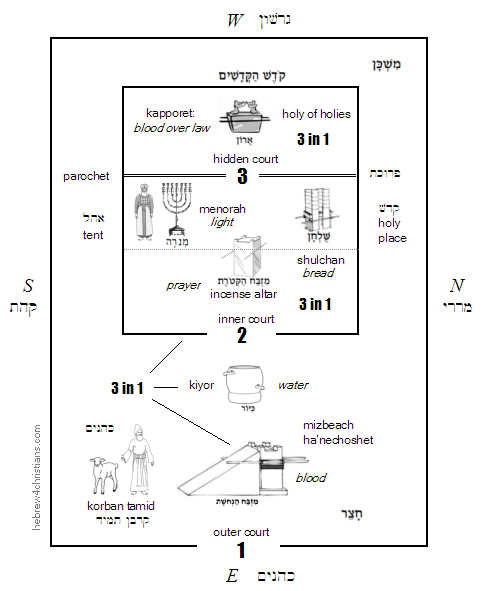 |
Outside the Mishkan, beyond the outer court, are the raw, "natural" experiences of life. This is the realm of the carnal flesh and the "dust to dust, ashes to ashes" despair of olam ha'mavet (עוֹלָם הַמָּוֶת). Genuine spiritual life (חיים רוחניים) is found when you come in through the gate (בְּדֶּרֶך הַשָׁעָר). You must understand that the gate is there for you to pass through. The cross of Yeshua is the altar where He died for you, personally, for your atonement with the Father (מִזְבֵּחַ הַכָּפָּרָה). His blood was presented between the outstretched wings of the cherubim so that you could come before God "panim el panim," that is, personally, "as a man speaks to his friend" (Heb. 4:16). Your faith bridges the gap between the Holy of Holies of the Cross (הַקֹדֶשׁ הַקֳּדָשִׁים שֶׁל הַצְּלָב) and the sanctuary of your heart...
Hebrew Lesson
Isa. 43:1b Hebrew reading:
Anticipating Passover:
Shabbat HaChodesh...

03.23.25 (Adar 23, 5785) The world system runs on a "clock" that operates under assumptions that are different than those revealed in the Scriptures.... The "wisdom of this world" (σοφία τοῦ κόσμου τούτου) is the prevailing cultural spirit that suppresses the reality of God's Presence and truth. Such "wisdom" is regarded as foolishness before God, and God has promised to "seize the so-called wise in their own craftiness" (1 Cor. 3:19). The life of faith, on the other hand, sees what is invisible. Faith (emunah) apprehends "the substance (ὑπόστασις) of things hoped for, the assurance (ἔλεγχος, conviction, "correction," "argument," i.e., hokhachah: הוכחה) of things not seen" (Heb 11:1). As the Scripture says, faith "looks not to the things seen but to the things unseen; for the things that are seen are transient, but the things that are unseen are eternal" (2 Cor. 4:18).
The Sabbath that immediately precedes (and sometimes falls on) the Biblical New Year is called Shabbat HaChodesh (שבת החודש), the "Sabbath of the Month" (of Nisan). This Sabbath is significant because it marks the start of the month of Redemption (i.e., the first month called Nisan) which God called "the beginning of months" (i.e., Rosh Chodashim). We honor this event by reading an additional passage from the Torah concerning the sanctification of the new moon (Exod. 12:1-20), and we spiritually prepare for this month by studying about Passover and the coming spring holidays:
 |
The commandment to sanctify the first new moon of the year (i.e., Rosh Chodashim) reveals that it is our responsibility to sanctify (i.e., observe) Biblical time in general. In other words, when we observe "the beginning of months," we are acknowledging that time itself is rooted in the Biblical calendar with its divinely inspired cycle of festivals (i.e., the moedim). Note that this year the Biblical New Year begins on Sat. March 29th at sundown, and therefore Passover begins exactly two week weeks later, Sun. April 12th at sundown:
 |
Originally Rosh Chodashim was called the "first month" because it marked the month of the Exodus and other months were named in relation to it, similar to the days of the week in the calendar (i.e., the first day, the second day...). Later it was called Chodesh Ha-Aviv (חודש חביב) - "the springtime month" (because the calendar is reset in the spring) and later still as Nisan (ניסן), to recall God's faithfulness after the Babylonian Exile (Neh. 2:1; Esther 3:7).
The word "Nisan" (נִיסָן) might come from either the word nitzan (ניצן), meaning "bud" (Song 2:12), or the word nissim (ניסים) meaning "miracles," both of which suggest physical and spiritual resurrection in our lives. Others think the word comes from the verb nus (נוּס), meaning "to flee," both in relation to Israel's flight from Egypt and Egypt's flight from Israel (i.e., when the pursuing Egyptian cavalry fled (נָסִים) before the sea closed upon them (Exod. 14:25, 27). We also see this usage in the verse: "The wicked flee (נָסוּ) when no one pursues, but the righteous are bold as a lion" (Prov. 28:1). The devil's power is found in the lie. If he can make you afraid, you will not think clearly. Establishing your faith in the truth will embolden you to deal with the lies and distortions that are intended to enslave you in fear. As Yeshua said, the truth will set you free (John 8:32).
 |
The new moon of Nisan is the most significant of the "new moons" of the Jewish calendar since it initiates the first month of the Biblical Calendar - and therefore represents the Biblical "New Year's Day." Of all the various Rosh Chodesh celebrations, then, Rosh Chodesh Nisan is foundational, since it presents the starting point for the cycle of the yearly festivals (mo'edim) that reveal prophetic truths about the LORD God of Israel and His beloved Son, Yeshua the Messiah, blessed be He.
יְהִי רָצוֹן מִלְּפָנֵיךָ יהוה אֱלהֵינוּ
וֵאלהֵי אֲבוֹתֵינוּ שֶׁתְּחַדֵּשׁ עָלֵינוּ חדֶשׁ טוֹב
בַּאֲדנֵינוּ יֵשׁוּעַ הַמָּשִׁיחַ אָמֵן
ye·hee · ra·tzon · meel'·fa·ne'·kha · Adonai · e·lo·hey'·noo
vei·lo·hey · a·vo·tey'·noo · she·te·cha·desh · a·ley'·noo · cho·desh tov
ba'a·do·ney'·noo · Ye·shoo'·a · ha'·mh·shee'·ach · a·men

"May it be Your will, LORD our God and God of our fathers,
that you renew for us a good month in our Lord Yeshua the Messiah. Amen."

Download Study Card
Glory Fills the Temple
Parashah Pekudei...
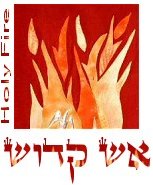
03.23.25 (Adar 23, 5785) Our Torah this week is parashat "Pekudei," (i.e., פְקוּדֵי הַמִּשְׁכָּן, "accounts of the Mishkan") which is the concluding portion of the tremendously important Book of Exodus (i.e., ספר שמות). It begins with Moses' accounting of (פקודי) all the materials that were donated by the people for the construction of the Mishkan (i.e., Tabernacle). After Moses recorded the inventory of the building materials and furnishings, he carefully checked the special priestly garments. After all the work was confirmed to be in complete accordance with the LORD's instructions, Moses blessed the people. The LORD then commanded Moses to assemble the Mishkan on "the first month in the second year [from the date of the Exodus], on the first day of the month" (i.e., on Nisan 1, or Rosh Chodashim, Exod. 40:17).
Once the Tabernacle was completed and all its vessels were accounted for and inspected, Moses anointed all its components with the sacred anointing oil, called shemen ha-mishchah (note that the word "mishchah" (מִשְׁחָה) comes from the same root as "Messiah" (מָשִׁיחַ), indicating that the Mishkan (i.e., Tabernacle) would foreshadow God's plan of redemption given in Yeshua). Moses then formally initiated Aaron and his four sons into the priesthood, marking their hands and feet with sacrificial blood and "waving them" before the Lord to picture resurrection. God's Presence - manifest as the Shekhinah Cloud of Glory – then filled the Holy of Holies in the Tent of Meeting.
At the end of the portion we read, וַיְכַל משֶׁה אֶת־הַמְּלָאכָה / "Moses finished all the work" (Exod. 40:33), a phrase that has the same gematria (numeric value) as bereshit (בְּרֵאשִׁית, "in the beginning"), the very first word of the Torah (Gen. 1:1). This suggests that the creation of the universe was for the sake of the building of the Tabernacle, and by extension, for the sake of the sacrificial love of God to be demonstrated to all of creation. The Talmud states, "All the world was created for the Messiah" (Sanhedrin 98b) and indeed, Yeshua is called "the Lamb slain from the foundation of the world" in the New Testament (Rev. 13:8; 1 Pet. 1:18-20; Eph. 1:4; 2 Tim. 1:9).
The Presence of the Glory of God that descended from Sinai upon the newly dedicated Mishkan represented a climactic moment for the fledgling nation, since the Sin of the Golden Calf had jeopardized whether the God would indeed dwell within the midst of the camp of Israel... Recall that it was only after Moses had returned from Sinai bearing the second set of Tablets (on Yom Kippur) that the glow of the LORD's redeeming love radiated from his face, and new hope was given to Israel (prefiguring the New Covenant). The King of Glory would accompany the people from Sinai to the Promised Land! (The narrative continues in the Book of Numbers, beginning exactly one month after the Mishkan was assembled.)
Turn to God and be Saved...

03.21.25 (Adar 21, 5785) "Turn to me and be saved, all the ends of the earth!" (Isa. 45:22). Though the LORD graciously seeks and saves the lost, He calls us to return to Him and be saved. This is the challenge we face, and on a daily basis, to truly turn to the LORD... And yet when we do, when we center all our heart in him, we experience salvation. All that oppresses us, all our fears and troubles begin to fade from view and we find refuge: "And when they had lifted up their eyes, they saw no man, but Yeshua only" (Matt. 17:8).
Rouse yourself, therefore, and return to the LORD. Look to Him now and earnestly seek His face. If ever there was a time to believe that "the end is near," it is in our day, and in the course of this generation. As the LORD appealed to apostate Judah in the time of Isaiah, so the appeal resounds to our day: "Why should ye be stricken any more? ye will revolt more and more: the whole head is sick, and the whole heart faint. From the sole of the foot even unto the head there is no soundness in it; but wounds, and bruises, and putrifying sores: they have not been closed, neither bound up, neither mollified with ointment. Your country is desolate, your cities are burned with fire: your land, strangers devour it in your presence, and it is desolate, as overthrown by strangers" (Isa. 1:5-7).
We only have this hour. Today is the day... No matter what may beset your way, no matter the buffeting gale of your shame, no matter the wound you have made of your life -- return to the outstretched arms of Yeshua's mercy extended for your salvation. "As far as the east is from the west, so far has He removed our transgressions from us," which is to say that He welcomes you into the utmost depths of his heart, to know and love Him forever... He promises that the one who comes to Him will never be refused (John 6:27). Friend, heed the Spirit's invitation and receive the salvation of the LORD.
Hebrew Lesson
Isaiah 45:22 reading (click):
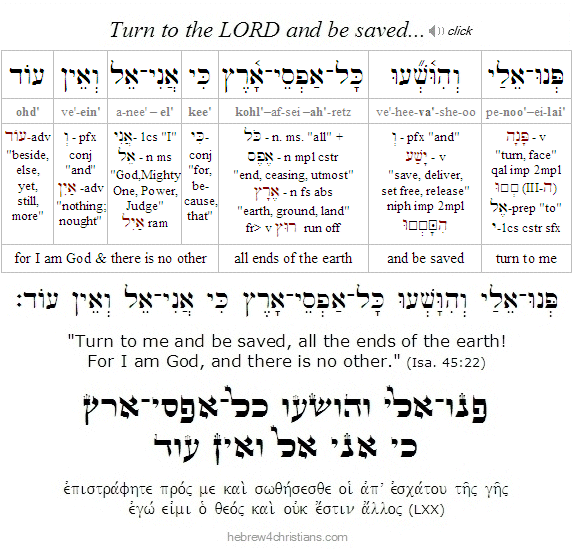 |
The Essence of Torah...
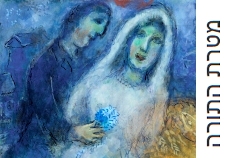
03.21.25 (Adar 21, 5785) The goal of the Sinai revelation was not to simply impart a set of moral or social laws, but rather to "accommodate" the Divine Presence in the midst of the people. This is not to suggest that the various laws and decrees given to Israel were unimportant, of course, since they reflect the holy character and moral will of God. Nonetheless, the climax of the revelation of the Torah - its goal or purpose or "end" - was the revelation of the altar which prefigured the sacrificial work of the Lamb of God.
The central sacrifice upon this altar was the daily sacrifice (i.e., korban tamid: קָרְבַּן תָּמִיד) of a defect-free male lamb with unleavened bread and wine. The LORD calls this "My offering, My bread..." (see Num. 28:1-8). In other words, the service and ministry of the Mishkan (i.e., Tabernacle) constantly foreshadowed the coming Lamb of God who would be offered upon the altar "made without hands" to secure our eternal redemption (Heb. 9:11-12). The sacrifice of the lamb is therefore central to the meaning and purpose of the Torah.
The meaning behind the blood that was shed, the very life that was given, is to ransom us from the grip of death. It is the sacrificial love of God that is the essence of Torah; it is the heart of God that offers himself up in sacrifice so that we may belong to him... There is no point for "laws" or decrees apart from the love of God that redeems us from our sin (selah).
The Talmud says "All the world was created for the Messiah" (Sanhedrin 98b). The Apostle Paul had earlier said the same thing: "All things were created by Him (i.e., Yeshua), and for Him" and in Him all things consist (συνεστηκεν, lit. "stick together") (Col. 1:16-17). Indeed, all of creation is being constantly upheld by the word of the Messiah's power (Heb. 1:3). Creation begins and ends with the redemptive love of God as manifested in the Person of Yeshua our LORD...
The Messiah is the Center of Creation - its beginning and end. As it is written: אָנכִי אָלֶף וְתָו רִאשׁוֹן וְאַחֲרוֹן ראשׁ וָסוֹף / "I am the 'Aleph' and the 'Tav,' the First and the Last, the Beginning and the End" (Rev. 22:13). "For from him and through him and to him are all things. To him be glory forever. Amen" (Rom. 11:36). In everything Yeshua has the preeminence (Col. 1:18), and his "work" is of first importance (1 Cor. 2:2, 1 Cor. 15:3-4). Yeshua our Messiah is called מֶלֶךְ מַלְכֵי הַמְּלָכִים / Melech Malchei Hamelachim: The "King of kings of kings." He is LORD of all possible worlds -- from the highest celestial glory to the dust of death upon a cross. Yehi shem Adonai mevorakh: "Let the Name of the LORD be blessed" forever and ever (Psalm 113:2).
So while we can agree with the Talmud's general statement that the world was created for the Messiah, we would insist that the Messiah is none other than Yeshua, God's Son, and indeed, the Messiah could be no other...
Hebrew Lesson
Isaiah 43:11 Hebrew reading:
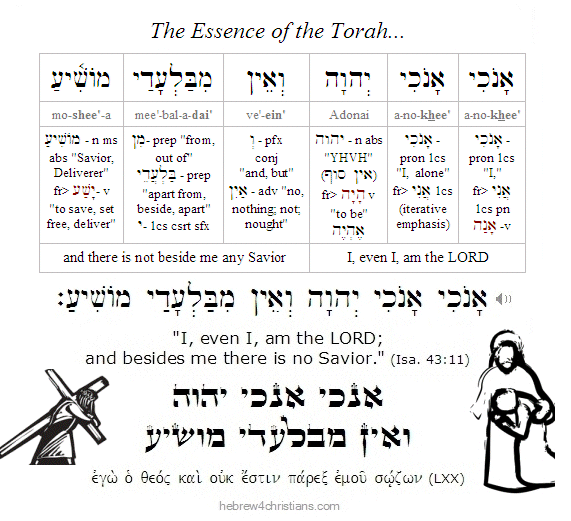 |
Note: For more on this subject, see the "Choosing to Belong" article.
The Tenth Red Heifer...
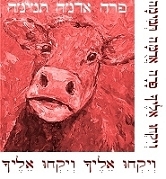
This coming Shabbat is called "Shabbat Parah," the Sabbath of the [red] Cow." Besides reading the regular Torah reading (i.e., Vayakhel), we read about the mysterious red heifer sacrifice....
03.21.25 (Adar 21, 5785) Jewish tradition says there have been nine Red Heifers (תשע פרות אדומות) historically offered on behalf of the Jewish people. The first was offered by Moses and Eleazar; the second by Ezra the Scribe; two more were offered by Simon the Righteous and another two by Yochanan the High Priest; a seventh was offered by the prophet Elijah; the eighth by Hanamel the Egyptian, and the ninth by Yishmael son of Piabi (15-16 AD). The tradition says that the tenth (and final) Red Heifer will be offered by the Messiah at the time of the rebuilding of the future Temple (Mishnah, Parah 3:5).
Many well-meaning Christians get excited over occasional reports that a new Red Heifer has been born, understanding this to be a sign from God that the time to rebuild the Jewish Temple is at hand. But even if a "kosher" Red Heifer be found and later sacrificed, how should we regard this -- especially in light of the Brit Chadashah and its clear teaching that Yeshua is the substance of the what the shadow of the Red Heifer represents?
It is important to remember that the red heifer that will be used for the Third Temple (i.e., the "Tribulation Temple"), and while there is prophetic interest in the ritual, it will be of no true consequence, since Yeshua embodies the Substance of the Red Heifer who cleanses us from the impurity of death... Yeshua will indeed establish the Temple of Ezekiel's vision during the Millennial Kingdom after His return in glory, called the "Fourth Temple," but that is not to be confused with the Third Temple of acharit ha'yamim ("end of days").
For more information about the Red Heifer sacrifice, see the "Gospel of the Red Cow" article as well as the "Tenth Red Heifer" (הפרה האדומה העשירית) page.
Hebrew Lesson
Psalm 51:7 reading (click):
The Gospel at Sinai...
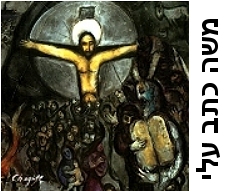
03.21.25 (Adar 21, 5785) The tragic episode of the Golden Calf revealed that the Israelites were unable to keep the law, even though they had personally experienced the power of God's deliverance from Egypt and had heard God's Voice directly speaking the Ten Commandments at Mount Sinai. The presence of the idol demonstrated that something more was needed, and that the law by itself was insufficient to change the heart (Rom. 3:20).
The poignant intercession of Moses on behalf of Israel - his willingness to die on behalf of the people - foreshadowed the need for a New Covenant (בְּרִית חֲדָשָׁה), a deeper revelation of the righteousness of God in terms of mercy and grace (Exod. 34:6-7; John 1:17; Rom. 3:21). The (second) revelation of the Name YHVH (יהוה) therefore represented a "gospel" moment for Israel. Just as the first set of tablets, based as they were on the justice and holiness of God, were broken, so a second set was graciously restored based on God's forgiveness and love. Likewise, Yeshua was broken on behalf of the law but was raised again so that all who trust in Him can understand that God is "merciful and gracious, slow to anger and abounding in steadfast love and truth" (Exod. 34:6, Psalm 86:15, 103:8). Only at the cross of Yeshua are God's justice and love forever reconciled (Prov. 16:6; Psalm 85:10; Rom. 3:26).
Hebrew Lesson
Psalm 86:15 Hebrew reading:
For more on this subject, see the Ki Tisa article, "God's Stubborn Love."
Note: March 2025 updates continue here.
Follow the site's progress:
Site Updates for 2025
Site Updates for 2024
Site Updates for 2023
Site Updates for 2022
Site Updates for 2021
Site Updates for 2020
Site Updates for 2019
Site Updates for 2018
Site Updates for 2017
Site Updates for 2016
Site Updates for 2015
Site Updates for 2014
Site Updates for 2013
Site Updates for 2012
Site Updates for 2011
Site Updates for 2010
Site Updates for 2009
Site Updates for 2008
Site Updates for 2007
Site Updates for 2006
Site Updates for 2005
Site Updates for 2004
Hebrew4Christians Forum
|








































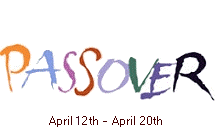

![Spring Holiday Timeline (H4C]](../../About_HFC/Site_News/roshchodeshim-line.gif)
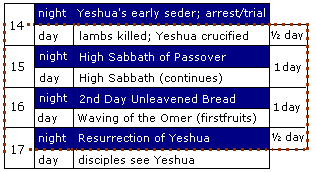



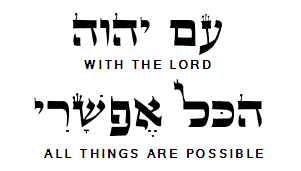


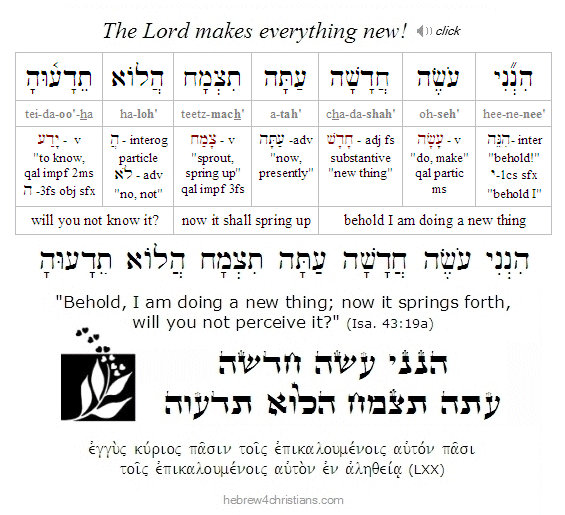

![Spring Holiday Timeline (H4C]](../../About_HFC/Site_News/pesachline.gif)

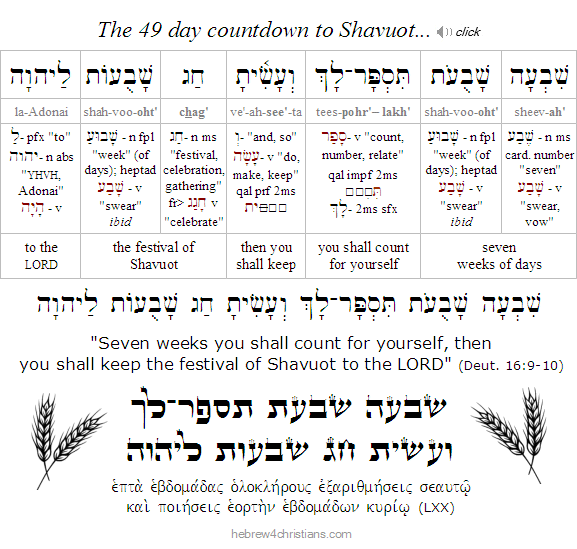

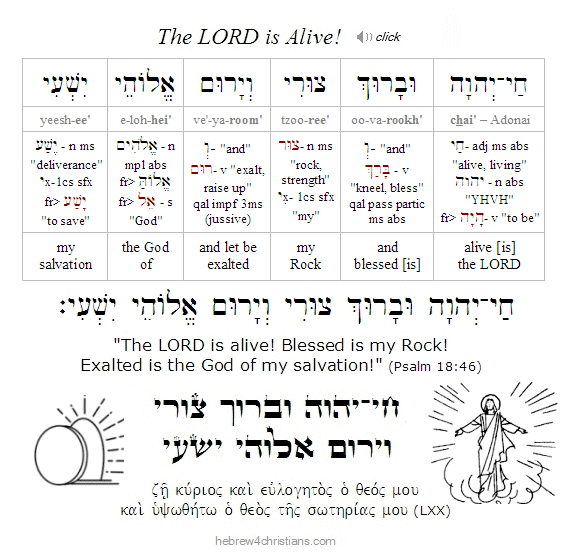


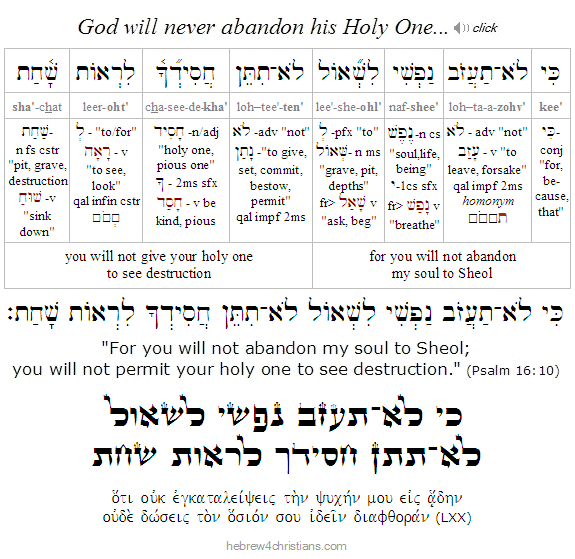

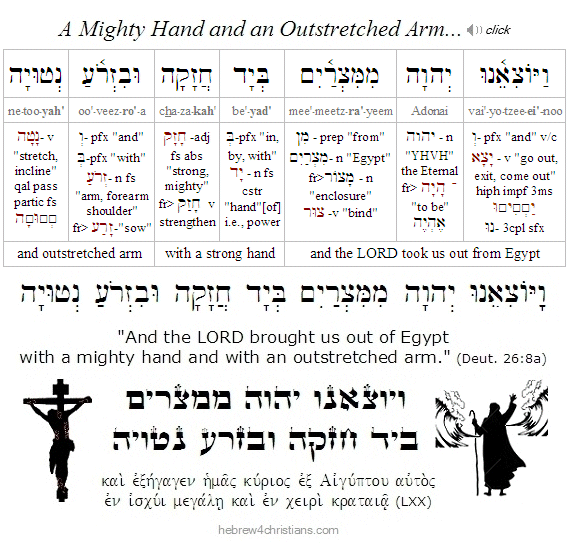







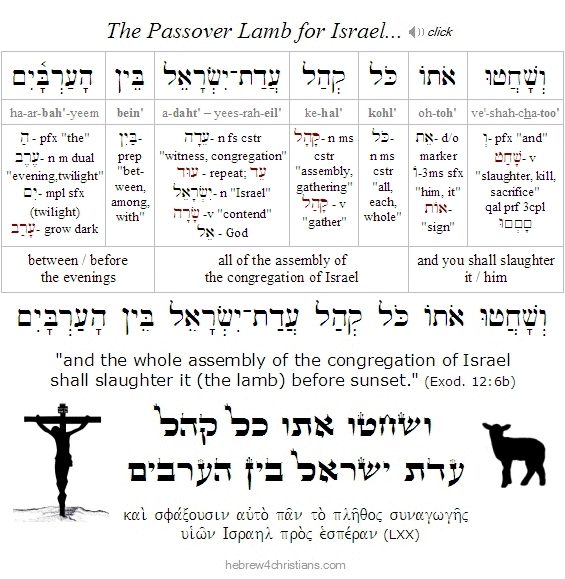






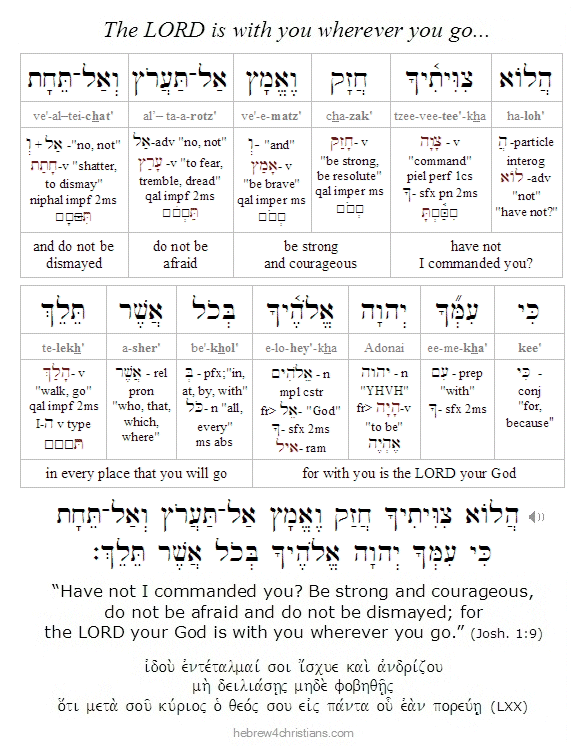


![Spring Holiday Timeline (H4C]](../../About_HFC/Site_News/shabbathagaolline.gif)



